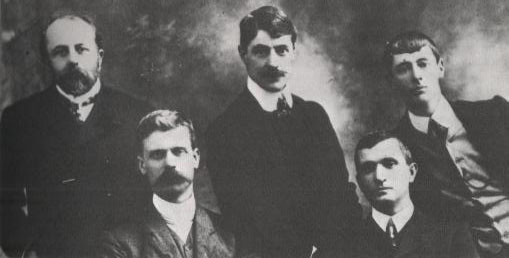References, Notes and Extras
LAWSON
THE MAN AND HIS COUNTRY
By T. D. Mutch, M.L.A.
ONE day in nineteen hundred and— was it two?. ("Damn the date," as he used to write sometimes at the head of his letters), a tall, lean, dark man came to the counter at the old "Worker" office in Kent Street, Sydney, stood, smiled, saluted (recognising in me a new employee), and then impulsively came round the counter, placed his hands on my shoulders, looked long with the deepest eyes I have seen in a man, and said, "You'll do." That was my introduction to Henry Lawson. I was a boy then. He left me wondering why or what or how I would do, and he never told me, but you will allow me to cherish the thought that on that day he enrolled me in the list of his friends. Fifteen years after — 1917 — I stood for Parliament, and Henry, who was then at Leeton — although he disliked politicians, a dislike arising out of a Governmental injustice done to his mother, who had invented a patent mail-bag fastener, and was robbed of the fruits of her labour— wrote a letter to the electors of Botany, wherein he said: "But he has carried his swag with me, and was, and is, the straightest mate I ever had; and made him smoke a pipe — and once got two medium beers into him consecutively. It took me three years to do these things, and now I reckon I ought to have a say in his affairs...."
Back To The Bush
That letter is probably the most unique piece of election literature ever published in Australia, but is too long to be reprinted here. But, long before that, in 1910, a group of his friends gathered together, and decided that Henry should go back to the bush again. We wanted to get him away from the city. We wanted him to rekindle the fire that burned then but fitfully, and with "less flame than ashes." And always Lawson wanted someone to take charge of his affairs. The principal members of that committee were (the late) Bertram Stevens, J Le Gay Brereton, Norman Lilley, Roderic Quinn, J. S. Ryan ("Narranghi Boori"), Fred Brown, Bernard Shaw, Hector Lamond (now M.H.R.), and myself. We arranged for him to go to two or three stations, hoping he would write another "While the Billy Boils", or another "On the Track and Over the Sliprails." but always, at the last moment, he disappointed us. For some time I had been corresponding with E. J. Brady, then, as now, camped at Mallacoota, Victoria, fifteen miles south of Cape Howe, and probably the most beautiful place in Australia. Brady had often invited me to go down and camp there awhile. A happy idea came into my head (a somewhat rare occurrence). I put it to Henry, and he agreed to come away with me. Real Mateship And so, on Friday, February. 25, 1910, I shanghaied him on to the s.s. "Sydney," and at 7 p.m. or thereabouts he and I were standing at the bow as the vessel dipped and ploughed through Sydney Heads and turned on her south-ward course. Somewhat seedy, he said, "I think I'll turn in.” The good ship sailed on Friday, with thirteen men aboard." I can take a hint, and made him as comfortable as anyone can make anyone who wants to be seasick and can't. At Eden, we put up at the Commercial Hotel. Henry promptly made friends with Cooper, who kept it, but I had got in early; he had to drink lemonade, and he enjoyed the joke. Shortly after, I missed him, but I had been to the other hotel, too, and he had to have a second lemonade. I met him half-way up the. street; he put out his arm, more seriously this time, and shook hands without saying a word. From that on everything was in order. Brady met us at Merrimingo, on the Genoa River, with a pulling boat, and insisted on rowing all the way.
We camped with Brady at Mallacoota — swam, fished, shot ducks, rabbits and jam tins. We ate schnapper and wild duck until we 'tired of it, so one day We decided to walk to New South Wales. Brady couldn't come— he was finishing some work — so we rolled our swags, filled our pipes and tucker bags, and set out for Gabo and Cape Howe.
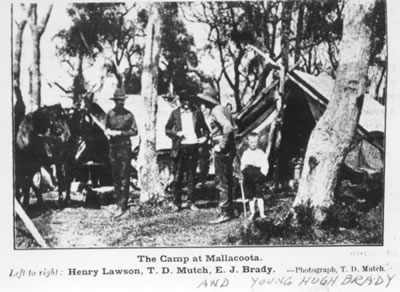
While The Billy Boils '
On that trip, I think I got close to Lawson's heart. He was keen on camping, insisted on rigging the tent, making the fire, and calling baking-powder "saleratus" (after Bret Harte). We had an argument about that, be cause lie. spilt the soda and spoiled the johnny cakes, and blamed ' me. But he forgave me when I shot, and told him I would show him, a brand of snake he had never seen before. Lawson's sense of humour was his personal saving grace. I can remember him building a fire. He had his own ideas about it, and would tolerate no interference. Six years afterwards, I made him wild by telling him that' :he ought to take lessons in making a fire from the actors who produced "While the Billy ' Boils" at the Theatre Royal. They had in the prologue two bushmen boiling a billy; suspended under a cross-piece between two forked sticks. He reckoned the play would' be ruined, because every bushman who went to the theatre would laugh at -that fire. Well, we built our camp at Cape Howe from wreckage and the bones of a stranded whale. When night descended we coiled up on our mattresses of sand, "lulled b. the ocean's rune and wild birds' song." As a man will under those conditions, I woke once or twice in the night. Lawson was standing with his back to the fire, making passes with a pannikin of- tea and a johnny-cake sandwich. Before dawn, we were awakened by Venus, low in the sky, blazing brightly through the open tent door'. ' "Do You Mind The Tent?' ' Oh that lonely trip, Lawson revealed himself to me, and I to him.
Last year, in some verses written to me, and published in "Aussie," he recalled; it. - Do you mind the tent and. camp-fire in the moonlight by Cape Howe? Do you ever pause and ponder were we happier then than now? Yes, of course, we were, 'Twas only one new shore and. one new sea, Marked to meet us and to pass us as THESE times were marked to be. We had both had bitter boyhoods with no tender light or touch ; And you told me half your story— I had lived the rest, 'Tom Mutch, ' Yes, I mind the tent and camp-fire. I mind, too, his story — the first fifteen years in the Roaring Days on Pipeclay; Gulgong, Home Rule; his mother, Louisa Lawson— he called her "the Chieftainess"; his -. father, Peter Hertzberg Larsen worked with father in the bush, At splitting rails and palings, He never was unkind to me, although he had his failings. He left a tidy sum to me, But I'd give all the. Money to hear him say, 'Will you get up? ' And boil the billy, Sonny?"
His sister, Annetta (he called, her Henrietta sometimes), whose death inspired his mother to write her first published lines; his sister, Gertrude, his brothers, Peter arid Charlie; his old home at' the foot of Golden Gully — the drought and the "poorer" that drove his father from it; house building and painting at Mount Victorian—where his father died; his struggles In the city in the eighties — the haggard- group out side the "Herald" office at 4. o'clock' in the morning, striking matches to scan the "Wanted" columns; his excitement when his first verse was published; the guinea he got for "Faces, in the. Street"; his job on the Brisbane "Boomerang" (You'll read his story in "The Cambaroora Star"), his trip to Bourke— he "picked up", at Toorale shearing shed, and humped his drum to Hungerford ; "Mitchell" — there was a man named Mitchell, but the character, in his books covers many men;, his first book, "Short Stories in Prose and: Verse," published by his mother, price one shilling (he was very excited when I told him I had a copy; it was printed at the "Dawn"; office— which his mother founded and ran for 20 years — and on the way to the binders the best part of the edition was blown- out of the cart into -York Street, which had just been watered, and only 300 copies were saved); his trip to New Zealand, where his son, Jim, was . born. Yes, I mind the tent and camp-fire, and I wish I could remember it all. Back to Boyhood And then , there was the time (1914) when, he went with me to revisit " the scenes of his boyhood at Eurunderee, little changed in the passage of years: The creek, that I can ne'er , forget, Its destiny fulfils; . The glow of sunrise purples yet, Along, the Mudgee hills; The flats and sidings seem to be ' Unchanged by "Mudgee town. And with the same old song and sigh The Cudgegong goes down. We wandered over the mullock heaps in Golden Gully, discovered by Henry Hill and John Wurth, who were stripping wattle and who, dipping a billy in a water-hole, noticed the yellow glint of gold in the red clay. They stripped no more bark for many a day. This discovery attracted Pater Larsen, a miner-carpenter, who had been working on the goldfields in Victoria, and Henry Albury, a sawyer-bushman from Guntawang. And Peter met Henry's daughter, Louisa— he was about 20 years older than she — married her, and, with that fickleness characteristic of the alluvial diggers in the early days, took her to the new rush at the Weddin Mountains, Grenfell, where, in a tent, Henry was born. What Should Be Done? He was christened. Henry Archibald, not Hertzberg, Larsen. It was In tended to call him Hertzberg, after his father, but the clergyman made a mistake, and his mother let it go at that. Back again, later,by Gulgong, when Gulgong "broke out," and then, after many wanderings, to settle down in a home his father had built at Eurunderee."
Well, I went over all that ground with Lawson; went over Log Paddock; Ross Farm, Buckholt's Gate, Pipeclay, Home, Rule (When he revisited the old dilapidated town, he scratched his head and said, "They ought to have given it to Ireland., long ago."), Reedy River, Mount Buckaroo and. all the rest of them- — immortalised in his best work. I knew him twenty years, lived with him in bush and .town, and in those years spent as much time with', him as any other man has ever, done— and now I reckon I ought to have a say in his affairs. And what I have to say is this:
We want no sham nor shoddy biography of the greatest literary .genius Australia has produced. We want no half lies and legends about him. Most of those who knew Lawson still live; what they know can, and should, be written now. If the stories told in the coaches as we followed Henry to his grave could be gathered into a volume we'd have a more truthful story of Lawson, the man, than all the literary rubbish yet to be written by men who never saw the bottom of a long beer with him. What I would ask is that the Mitchell Library should acquire, by gift or purchase, all the Lawsonia available — notes, letters, manuscripts, unpublished and unrevised reminiscences written by those who know, so that at a suitable time Lawson's relatives, friends, and old mates may meet together and decide upon his biographer. This much should be done for Lawson's and Australia's sake. What do you say? LAWSON (1922, September 16). Smith's Weekly (Sydney, NSW : 1919 - 1950), p. 10. Retrieved from http://nla.gov.au/nla.news-article234281754
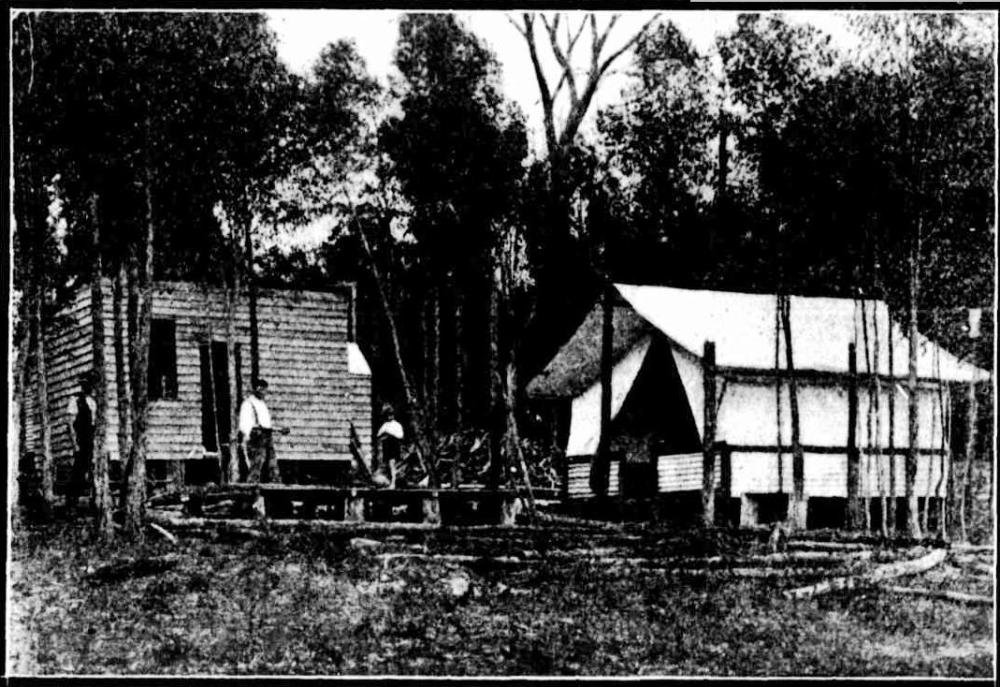
Practical Poetry. E. J. Grady building his home at Mallacoota West. THE WITCHERY OF MALLACOOTA. (1919, March 26). Sydney Mail (NSW : 1912 - 1938), p. 8. Retrieved from http://nla.gov.au/nla.news-article159656523
Mallacoota Bar
Henry Lawson, 1910
Curve of beaches like a horse-shoe, with a glimpse of grazing stock,
To the left the Gabo Lighthouse, to the right the Bastion Rock;
Upper Lake where no one dwelleth — scenery like Italy,
Lower Lake of seven islets and six houses near the sea;
'Twixt the lake and sea a sandbank, where the shifting channels are,
And a break where white-capped rollers bow to Mallacoota Bar.
Gabo, of the reddist granite, cut off from the mainland now —
"Gabo", nearest that the black tongue ever could get round "Cape Howe";
Gabo Island, name suggestive of a wild cape far away,
And a morning gale by sunlight, or a sea and sky of grey;
Gabo, where cold chiselled letters on the obelisk record
How the Monumental City sank with forty souls on board.
To the west the lonely forests, on the levels dense and dark
Native apple tree and bloodwood, wattle, box, and stringybark;
Land of tree-marked tracks and hunters — to their glory or their shame —
For a law makes Mallacoota sanctuary for native game;
To the east the rugged Howe Range, running down without a scar
To the mighty moving sandhills — close to Mallacoota Bar.
And the folk are like their fathers — bushmen-sailors, fishermen —
And they live on fish and tan-bark, with a tourist now and then;
And of hunting? Well, I know not. And what matter if we know
That they did a bit o' smugglin' or o' wreckin' years ago?
For I love these kindly people, and 'twill give my heart a jar
When I see the figures fading on the sandbank by the bar.
There's the old grey house of hardwood that seems built for mighty floods,
With the broad thick slabs laid lengthwise 'twixt the great round tree-trunk studs
That are slotted to receive them - and with shingles six foot long!
There's the house of hand-dressed timber that is nearly half as strong,
There's the rather modern cottage — but, as far as one can see
Everything in Mallacoota is as clean as it can be.
There are pictures in the parlour for three generations back:
There are Grandfather and Granny, there are Syd, and Dave, and Jack;
There is father, that is mother, one each side the mantel hung,
And the girls, and bridal parties - mother, too, when she was young;
That is all. Is that sufficient? 'Tis for yourself to decide —
And the girls ride after cattle, and they always ride astride.
All is blue and gold this morning — green and gold and "Bar all right",
And three blurred sticks under Gabo to the sunlight show the white,
Bringing groceries from Eden, bringing all that we require —
Bringing flour and tea and sugar, roofing iron, and barbed wire,
Copper nails, and small inventions in machinery from afar,
And the little fleet of cutters run for Mallacoota Bar.
And we see the green, transparent light show through the heaving brine —
Waiting with two oars stuck upright on the sand "to give 'em line".
Comes the S.E.A. and, rising, pauses, swan-like, half in doubt,
While her skipper from the ratlines spies the bar and goes about;
"Now she comes," and "now she's coming," and, ere we know where we are,
She is snug beside the sandbank inside Mallacoota Bar.
Warren brings the water with him on the cutter Clara next
(When he doesn't, then his language speaks a sinful spirit vext);
Next the little lugger Lightning darts and misses, grounds and floats,
Finds the channel with a flutter of her draggled petticoats,
Snuggles up beside the Clara, clattering down her little spar,
Like a naughty drab that scrambles over Mallacoota Bar.
But the days are not all sunny — there are anxious times on decks,
When the cutters run for shelter to the graves of ancient wrecks,
Round "the Cape," or under Gabo, Tamboon, or Disaster Bay,
For they won't insure the hulls that cross the 'Coota Bar to-day.
But the elders of the people sadly think in days like these
Of the days when strange things happened to Ike Warren's enemies;
In the days of border duties there was glory to his name,
Who is well liked — and mistrusted — from Green Cape to Cunninghame,
Twenty years by stormy "shelters", where the festive porpoise frisks,
Sailin' out of Mallacoota, buildin' trade, an' takin' risks.
Risks from Acts of God — and monarchs — risks that were (and maybe are)
Altogether unconnected with the weather or the bar;
Wrecks were left where it was lonely; things would float, and things would strand —
Out of sight of Custom Houses, out of sight of sea or land —
To be found — or drift convenient under light of moon and star —
For the most erratic currents ran by Mallacoota Bar.
No, the Bar's not always playful, nor the weather always clear,
And the little Orme with six men has been overdue a year;
Oh the Gippsland Lakes are kindly, and the Gippsland people good,
And the widows and the orphans never shall want clothes nor food;
But the Government are fossils, slow to mend and sure to mar,
And the widows and the orphans blame the Mallacoota Bar.
Half a mile, or rather more, from Captain's Point and Brady's Camp,
Backed by rotten "native apple trees" and coast scrub, dark and damp,
With a garden filled with thistles — haunted on the brightest day —
Stands a little match-board cottage, empty, going to decay
(Like they build in western places — towns that end in 'gar and 'dar),
With its two black, sightless windows turned to Mallacoota Bar.
There's a little cliff before it, with a level verge and straight,
Topped by sunny grass and shady, and a rustic fence and gate,
Framed by trees that frame "the Entrance", where the white-capped rollers pour
'Tis a picture for an artist from the closed-up cottage door;
From a sandbank by the "landing", looking back, the poet sees
How one broken window's hidden by a handkerchief of trees.
It may be a bit o' wreckin' or of smugglin' you'd prefer,
But I write of young Lin Lawson and of Captain Mortimer;
There the Captain built his cottage, fitting it with everything
In the days when roofing iron was a costly thing to bring.
The brick chimney came as ballast, and he laid the hearth with pride,
And, when all was finished neatly, there the Captain brought his bride.
Trading out of Mallacoota — there he bore an honoured name —
Taking wattle bark to Eden, taking fish to Cunninghame,
He would venture out in weather when the others dared not go,
Bring flour and tea and sugar when the Lakes' supply was low;
When the back country was flooded, and the tracks were worse than bad,
Captain Mortimer and Warren were the only hopes they had.
Mortimer was two years married, though he didn't think it two,
When he sailed for Eden taking young Lin Lawson for a crew;
Young Lin Lawson — sailor-bushman, bushman-sailor like the rest
On the Lakes. They would be new to my own bushmen of the west.
Ah, those careless sailor-bushmen seem endowed with pluck sublime,
For they can't imagine danger - when it comes they haven't time.
One I know who trusts the devil, one I know who trusts the Lord,
With the hatches on and battened, and the dinghy hauled on board;
Both have sailed long years in safety where the Green Cape boomers break
In such boxes as you'd scarcely trust your wife in on a lake.
It would set you dumbly praying, if a passenger you be,
Just to hear Ike Warren cursing out of Gabo in a sea.
Captain Mortimer (the Em'ly) whistling some old Scottish tune,
Sailed again for Mallacoota on an autumn afternoon,
Rather later than was usual. He had been a deep-sea tar,
And the skippers take their chances down by Mallacoota Bar.
He was warned about the weather, but he always stood alone,
So the Captain sailed from Eden to an Eden of his own.
And the dread nor'-easter struck him, somewhere off Cape Howe, they say,
And he ran for under Gabo, but let that be as it may;
'Twas a wild dark night for autumn, and it blew as it can blow;
There's a rock above the Entrance, and the Bastion Rock below,
And they found the Em'ly's dinghy, and some decking and a spar
Some days later, on the sandbank, outside the Mallacoota Bar.
He had brought a little brother from a southern town to stay,
As a comfort to his young wife when the Em'ly was away;
All that day they watched and waited, all that day they watched in vain,
For a small white sail off Gabo that would never gleam again;
All night long, white-faced and staring, she who was the sailor's star
Watched the hellish phosphorescence leap on Mallacoota Bar.
And next day a strange thing happened. Strange! It cannot be denied:
For they saw a black speck tossing through the Entrance on the tide,
Drifting in between the sandbanks, and it drifted sure as fate,
Till it stranded on the shingle just below the rustic gate;
And the wife ran down and seized it — it was Hope's death sign to her —
'Twas her husband's cap — a cloth cap worn by Captain Mortimer.
She is dead maybe, or married, there seemed nothing then on earth,
So they bought her goods and chattels for much more than they were worth,
And they drove her round to Eden, to go home to Castlemaine.
And the driver says he wouldn't like to have that job again.
And the sight for days thereafter that brought pain to all and each
Was, each tide, Lin Lawson's father riding up and down the beach.
There's the Howe Range, steep and rugged, running down to granite red,
There's sunny slopes and shady, where the fishing nets are spread;
There are channel posts and net poles by the sea-weed thick and strong,
Where the silly shags sit watching, watching nothing all day long;
There's the story of a cottage, growing ever faint and far,
With its two black windows watching, watching Mallacoota Bar.
HENRY LAWSON MEMORIAL. Obelisk Unveiled.
GRENFELL, (N.S.W.), Friday. — The unveiling of a memorial to the late Henry Lawson, erected on the spot where he was born, 57 years ago, was performed before a very large gathering of people, including 400 school children. Mr. Grimm, M.L.A., who unveiled the memorial, said that he had been acquainted with the poet at the age of 17. He asked the school children to learn Lawson's poems because they were Australia's history, the history of the bush. Mr. Grimm quoted poem after poem. Great cheering fol-lowed the unveiling, the band played "Home, Sweet Home," and a trumpeter sounded the "Last Post."
Mrs. Lawson, widow of the poet, and Miss Lawson, daughter, thanked the Grenfell folk of their kindness. Old residents who knew Henry Lawson's father were introduced to Mrs. Lawson. Five gum trees were planted around the obelisk which is 14ft. 6in. in height, and 2,000 photographs of Henry Lawson were distributed.
The miners' display which followed was highly interesting. Shafts were sunk and "wash dirt" obtained. The white prospectors flag was changed to the reg flag of gold, and 50 miners scrambled to "peg out," just as the rushers did 60 years ago. Dishes and cradles were worked, and the results showed a reef, which was uncovered and specimens "dollied." Old miners revelled in the work. HENRY LAWSON MEMORIAL. (1924, March 22). The Argus (Melbourne, Vic. : 1848 - 1957), p. 30. Retrieved from http://nla.gov.au/nla.news-article1907273
THE HENRY LAWSON MEMORIAL
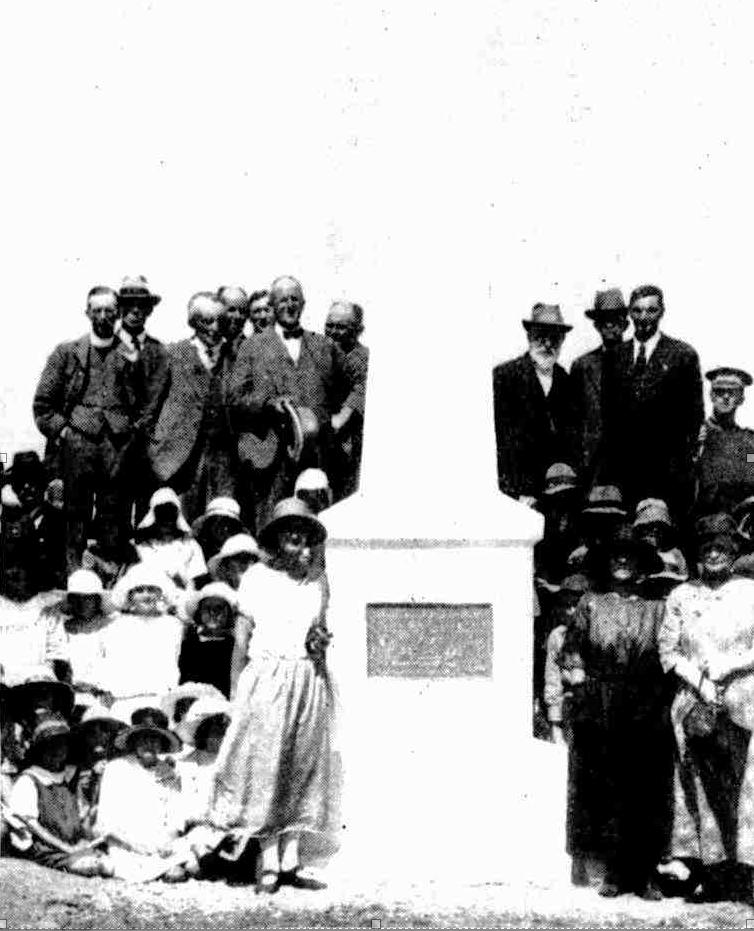
Which was unveiled in the presence of a large gathering, including the poet's wife (right) and daughter (left of monument). "Back to Grenfell":
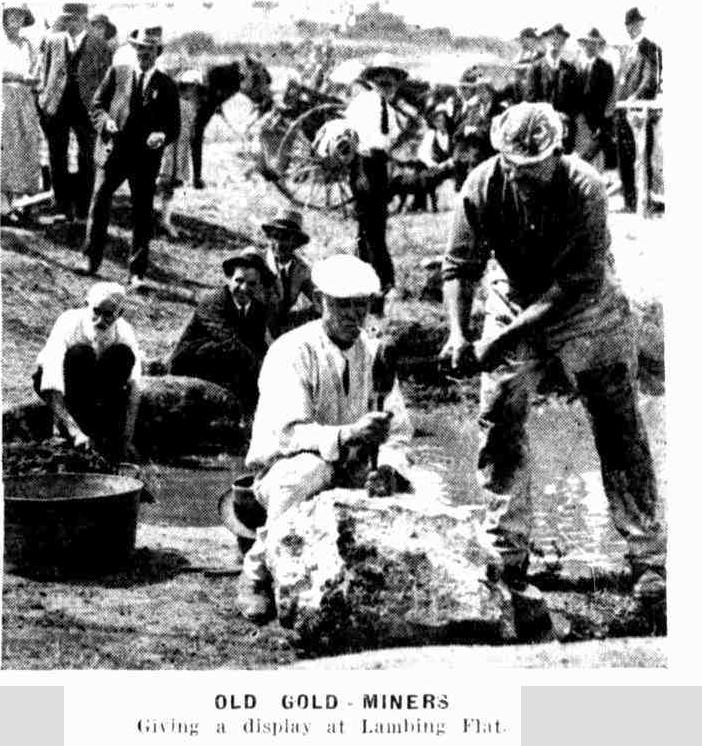
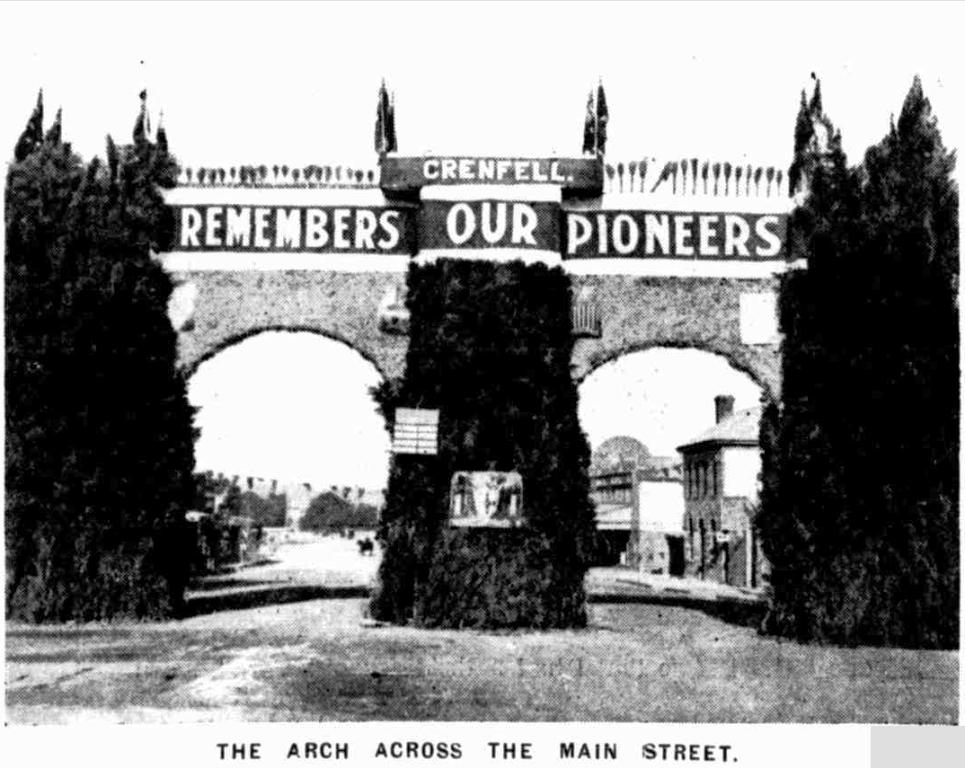
Back to Grenfell - A Week of Celebrations (1924, March 26). Sydney Mail (NSW : 1912 - 1938), p. 16. Retrieved from http://nla.gov.au/nla.news-article166151284
LAWSON'S BIRTH
Sister Writes History DIGGERS DAYS
Over half a century ago, a tent was pitched at Grenfell, and in it Henry Lawson was born. It is "Back to Grenfell" Week, and today a splendid obelisk on the site of the little camp will be unveiled to mark the poet's birthplace. Lawson's sister Gertrude (Mrs. O'Connor) wrote the following narrative of her brother's ancestry and of his birth. Three years ago she could not read or write, but set out to learn so that she may be able to record all the circumstances relating to the poet's life.
My brother loved Australia; he loved its people; but he loved its bush people best. He loved its little children. He saw Australia's destiny in each little face, and furthermore, he had confidence in them. Mateship was ever the theme of his Verse and his prose. Mateship he ever endeavored to inculcate into the hearts of his readers. It was his second nature. Indelibly It was stamped upon him prenatally by the girl-mother, who was the one woman among 7000 gold diggers at Grenfell. She was the first woman of that rush. The men were a motley throng from the four corners of the earth. There was no social law recognised there — only the pledge of mateship. To them Henry's mother was sacred.
MATES FROM NORWAY
Henry Lawson was the son of one of four lifelong mates. They sailed together as boys from Norway — shipmates — and braved the early gold rushes as digger mates. They were William Henry Slee, Hermin Jansen, Peter Peterson, arid Peter Lawson. Peter Lawson was destined for the sea. His father conducted a school of navigation in Norway. His three eldest sons were sea captains, and young Peter, after his education, was sent on his first long sea voyage to Australia.
HENRY LAWSON
PETER LAWSON
Hermin Jansen and William Slee married sisters, who were daughters of John Nelson, a timber merchant of Grenfell. Jansen's wife was only 16. Peter Lawson married Louisa AIbury, of Golden Gully. She was the daughter of Henry Albury and Harriet Winnorphan, daughter of a minster who migrated to Australia. Louisa Lawson received her education at Mudgee, at the public school, under Mr. Alpress, a scholar in classics and at one time chief inspector. She was his brightest pupil, and he took a keen interest in her, lending her his books from his private library and encouraging her to write verse and study prose. Louisa Albury wrote poetry at a very early age, but published little until late in life. Henry, who commenced his work when he was 11, was inspired by her efforts. She controlled his inspiration until he was 21. "My Literary Friend" referred to her.
LOUISA LAWSON
She, herself, published a Journal as far back as 1888. This year is a memorable one in Henry's work, because of "Faces In the Street." Peter Lawson had been married only a few months when he packed his household upon a dray, and, with his girl wife, faced towards Grenfell. The journey from Golden Gully — which is five miles beyond Mudgee — across country to Grenfell, over unmade roads, 53 years ago, can scarcely be imagined in these days of good roads. Just where they are going to unveil the obelisk today Peter pitched his camp, and here the poet was born. According to mother, he was the "crossest baby ever born" — a thin weakling, who did not enjoy robust health until he was 20. LAWSON'S BIRTH (1924, March 20). The Sun (Sydney, NSW : 1910 - 1954), p. 10 (FINAL EXTRA). Retrieved from http://nla.gov.au/nla.news-article224574330
HOSPITAL'S MEMORIAL TO POET.
The Minister for Health, Mr. Ely (right), unveiled a memorial to Henry Lawson yesterday at the Coast Hospital. Left: Mr. Roderic Quinn, the poet. HOSPITAL'S MEMORIAL TO POET. (1931, December 10). The Sydney Morning Herald (NSW : 1842 - 1954), p. 12. Retrieved from http://nla.gov.au/nla.news-article16803999
The Bard of Grenfell
(Henry Lawson.: 1867-1922)
On a day reminiscent of the cold wet and windy, night on which Australia’s bard was born near the old diggers' cemetery at Grenfell, there was a pilgrimage to the birthplace where, in 1924 a memorial was unveiled in honor of the Grenfell poet. This pilgrimage was on Friday last.
Writing to us some years prior to the unveiling ceremony Henry Lawson informed the writer that in some verse which appeared in 'The Buletin' about nine years previously, appeared these lines — 'You were born on Grenfell goldfield— And you can't get over that.' . The letter now is in the Mitchell Library, but we have a photostat, and Lawsons' signature to that, and the one which appeared on the stamp issues appropriately on Friday are exact. In his opening remarks the Mayor stated that he had been informed that Lawson came back to Grenfell when he was about thirteen years of age and worked on the Bimbi road about three miles out. It is the first time, we have heard that Lawson ever came back to the district of his birth, and an authentic statement to this effect would be of local and historical importance. ..
MESSAGE FROM BERTHA LAWSON.
It is most gratifying to know that the memory of my late husband, Henry Lawson is being honored by the citizens of Grenfell on the 82nd anniversary of his birth. In honoring Henry Lawson you are honoring Australian literature which is steadily becoming a strong influence in this country. In this connection I am delighted to know that the children are participating in these ceremonies, as it is through them that the torch of Australian art will be carried into the future. The pioneering days of Australia are passing, but they will always be kept alive as vivid memories through the work's of Henry Lawson and other writers who are following in the track which he blazed so long ago. I congratulate you in honoring Australia's writer, and my greatest regret is that owing to indifferent health I am unable to be present on this great occasion. I have happy memories of the schools which I visited on the unveiling of the obelisk in Grenfell to Lawson's memory, and I feel that just as Stratford-on-Avon has become a shrine to lovers, of William Shakespeare, so will Grenfell be the shrine to Henry Lawson’s memory. The Bard of Grenfell (1949, June 20). The Grenfell Record and Lachlan District Advertiser (NSW : 1876 - 1951), p. 3. Retrieved from http://nla.gov.au/nla.news-article113436912
Henry Lawson Memorial: Unveiled in Outer Domain
HENRY LAWSON.
In the presence of about 3000 people, at 3 p.m. on Tuesday, 28th ult., his Excellency the Governor, Sir Philip Game, unveiled in the Outer Domain the statue (or, to be accurate, the group) which his admirers (chiefly the school children) caused to be erected to the memory of Henry Lawson.
The Lord Mayor of Sydney, Alderman Jackson, M.L.A., presided, and with him on the platform was a gathering of representative citizens, including the Minister for Agriculture (Mr. Dunn), Mr. T. E. Bavin (leader of the Opposition), Sir Daniel Levy, M.L.A., Dean Talbot, Mr. Ifould (Government Librarian), and other members of the Lawson Memorial Committee; Mrs. Lawson (widow), Miss Bertha Lawson and Mr. Jim Lawson (daughter and son), and Mrs. J. T. Lang (wife of the Premier, and Lawson's sister-in-law). His Parliamentary duties prevented the Premier himself from being present. Seated round the platform were many members of the Fellowship of Australian Writers, among them being Mrs. Gilmore, Bod. Quinn, Steele Kudd (A. B. Davis), Jim Grahame, and other old-time friends and companions of the poet, not a few of them from the bush, including Mr. James Dooley, who was Premier of N.S.W. when Lawson died. Official Addresses. When introducing his Excellency the Governor, the Lord Mayor, commenting on the gifts of vivid depiction of everyday life which Lawson possessed, said it was a vexed question whether Lawson would be remembered by his prose (short stories) or his poetry. Time alone would tell. Adverting to the newspaper controversy over the choice of the site for tho monument, the temptation to compare Lawson with Burns could not be resisted. The palpable invidiousness of such comparisons did not seem apparent to the Lord Mayor.
Except insofar as 'The colonel's lady and Judy O'Grady are sisters under the skin, as a pioneer Australian writer, Lawson worked in totally different media from that of Bums. And either in quality or quantity of achievement, the bard of Mudgee was not comparable with Scotland's poet. So why compare them at all? Lawson was big enough to stand on his own merits as a writer; and to compare him with Burns or any other Olympian is manifestly unfair to Lawson. If they could not appreciate him for his own intrinsic worth, better to leave him unread. When declaring the statue unveiled, the blustery wind having anticipated him and unrobed the group, a circumstance to which he humorously referred, his Excellency said it was well that Australians, and especially the children, commemorated our gifted men. The life that Lawson knew and so admirably depicted was fast disappearing; and it was gratifying to know that in his verse and in his prose Lawson had left a legacy which future generations would find pleasure and profit in.
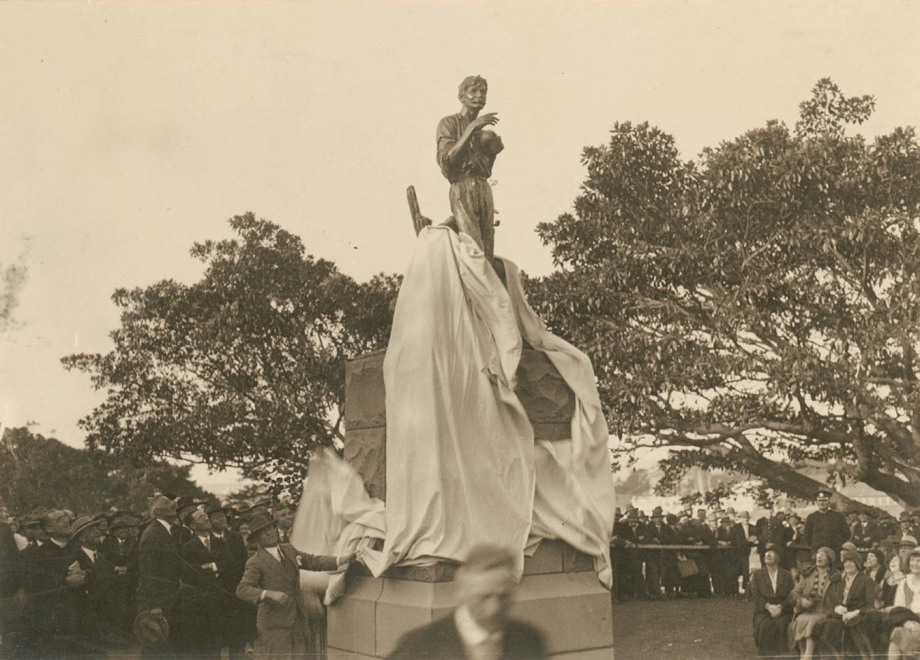
Unveiling Lawson statue, 1931,by Sam Hood. Image No.: a215027, from Hood Collection part II : [City streets and scenes: including streetscapes, labour processions, military parades and memorials, statues and Cenotaph], courtesy State Library of NSW. The Statue was designed by George Lambert and is of the poet, a swagman and his dog and a fencepost. Lawson’s son Jim posed for the figure of Lawson, and the model for the swagman was Conrad von Hagen with alliterating, according to some sources, to St John in Rodin’s St John the Baptist preaching 1878–80, in Lawson's pose by the creator, and Rodin’s best known work, The thinker 1880, in the swagman.
Commenting on the beauty of the site, which is indeed a happy choice, the Governor said that if the shade of Lawson ever descended from Elysium to visit the Domain, it would be so charmed with the location — the thickly-foliaged surrounding trees, the lovely harbour view and all — that it would be reluctant to return. A youth named Hauptmann recited Lawson 's fine verses, 'Waratah and Wattle,' and after relating the difficulties which, the committee had to overcome, and paying a compliment to the memory of Lambert, the sculptor, Mr. Ifould, who had taken the chair on the departure of the Lord Mayor on civic business, thanked the Governor for his presence and his interest. The proceedings then closed.
HENRY LAWSON: IN MEMORIAM.
Now, who may tell as he with skill
The story of bush days,
Bring back to us the memories
Of strange, yet homely, ways,
In book to which the perfume cleaves
From spray of gum between the leaves?
Where'er the billy boils to-day,
A man awaits his mate,
And wonders, watching by the fire,
What keeps that mate so late;
Thinks he must soon a footstep hear
Come down the rough track running near.
The furthest outback settlement
To him lays friendly claim.
He wrote about its daily life,
And so it shares his fame;
Bid Harry Lawson time o' day.
His portrait, for Australia's sake,
Hangs on Art Gall'ry's wall,
And bush folk, coming down to town,
Are free to make a call,
In spirit speak with him again
By Wombat Creek, or One-Tree Plain.
An Appreciation. BY M.P.T. Australia's best-loved poet was born in 18*7, he was 55 years old at the time of his death, and except for a short time spent in England and New Zealand, he lived all his life in the land of his birth. His father was a Norseman, and his mother an Englishwoman, of Gipsy extraction. To her he owed his love of literature and his poetical inspiration. He was born in a tent at Grenfell (N.S.W.) , and spent his boyhood days on the goldfields with his father. He was afterwards stockrider, rouseabout, boundary-rider, shearer, swaggie, and coachbuilder.
Sang With the Soul of an Australian.
He was the first poet to sing of his land with tho soul of an Australian. Kendall, whom he loved, was an Australian by birth, but borrowed much from England and other lands. Gordon was not an Australian. Both missed by an aggravating margin the atmosphere of Australian life, but Lawson, with the inspiration of genius, caught it, and held it fast. Not one word by Lawaon is un-Australian, and every picture he painted and every character he drew can be seen to-day in the backblocks. He communed with the soul of our nation, and her whisperings he delivered to the world. He will never die, though we are too close to his time to view his worth in true perspective. That much of his verse is crude is true, but, like the Australian character, it is frank, direct, and soul-stirring. His gems he often failed to polish, but they are true gems for all that. The cruder his words, the truer they are, for he wrote of crude things, and fitted his pen for its task. He commenced writing about the age of 21, and had his poems published in many Australian papers. At the suggestion of Angus and Robertson, he collected his works into book form, both prose and poetry — 'On the Track and Over the Sliprails,' 'Verses Popular and Humorous,' 'When the World Was Wide,' 'Joe Wilson and His Mates,' 'When I Was King,' 'Children of the Bush,' &c. What He Looked lake. In later times Henry might be met in the streets of Sydney, a tall, lank figure, smoking a long, lank pipe, with stray lank wisps of hair under an old brown hat. Ho was a child of nature, as gentle as ho ought to be. His soft, brown eyes invited you to talk to him, and his low-pitched, mellow voice won you. He had the quiet, subdued speech of the very deaf, but his eyes twinkled like stars. The writer recalls many a conversation with Henry at his Latin quarters in Bathurst-street and Sussex-street, and left him always with a great love. On one occasion, Henry was unsteadily lighting his pipe, and a Chinese fruiterer, standing by, held a match in his cupped hands for him. 'Ah,' said Henry, looking up at him with soft, beaming eyes, 'the light of Asia.'
His Humour and Pathos.
On a more recent occasion, two Sydney priests, friends of his, met him on a street corner, and engaged in familiar chat with him. In the interval of lighting his pipe, they talked to each other of the possibility of securing a pension for him. It must have been the roar and rattle of the trams that made his deafness cease for an instant. Looking up over the lighted match, he murmured: Three men met at the corner of a street, As three men often do; One was a priest, the other a priest, And tho third had no money, too. The humour of his writings is irresistible, and the pathos clutches the heart. His first effort was 'Faces in tho Street,' sent to the 'Bulletin,' when, he was 21 years old. Its immediate success astonished him. He was surprised to think that he could write verse that interested readers. The following is an extract from that first poem:
They lie, the men who tell us, for reasons of their own,
That want is here a stranger, and that misery's unknown,
For where the nearest suburb and the city proper meet
My window sill is level with the faces in the street,
Drifting past, drifting past,
To the beat of weary feet —
While I sorrow for the owners of those faces in the street.
'I Have Starved in the Trenches These Forty Long Years.'
Many predicted that his inspiration was morbid and meteoric. It could not last, they said. As recent as 1915 a pathetic figure presented itself at a military depot to enlist for the war. It was Henry Lawson. He was rejected, of course, but wrote pathetically:
They say in all kindness, I'm out of the hunt, Too old and too deaf to be sent to the front. A scribbler of stories, a maker of songs, To the fireside and armchair my valour belongs, Yet in hopeless campaigns and in bitterest strife I have been at the front all the days of my life. Oh, your girl feels a princess, your people are proud, As you march down the street to the cheers of the crowd ; And the nation's behind you and cloudless your sky, And you come back to honour or gloriously die; But for each thing that brightens, and each thing that cheers, I have starved in the trenches these forty long years.
The Poet of the Shearing Shed.
He is the poet of the shearing shed. Nobody can paint a scene as Lawson painted it. Not a word too many, not a word too few. But you must have seen the shearing shed to realise all this if with eyes of the body you have never seen the fleece clipped off the sheep huddled in the pens, the shorn sheep shoved down the shoots, then with the eyes of the imagination the scene is yours. It would not be truer to life than the words of Lawson make it:
Roof of corrugated iron, six foot above the shoots; Whiz and rattle and vibration, like an endless chain of trams, Blasphemy of five and forty — prickly heat and stink of rams I Barcoo leaves his pen-door open, and the sheep come bucking out; When the rouser goes to pen them Barcoo blasts the rouseabout; Injury with insult added, trial of our cursing powers— Cursed and cursing back enough to damn a dozen worlds like ours; 'Take my combs down to the grinder,' 'Seen my (something) cattle pup I' 'There's a crawler down in my shoot — just slip through and pick it up.' 'Give the office when the boss comes,' 'catch that gory ram, old man;' 'Count the sheep in my pen, will you!' 'Fetch my combs back when you can,' 'When you get a chance, old fellow, will you pop down to the hut? Fetch my pipe — the cook'll show you — and I'll lot you have a cut.' Have you ever been in a shearing shod before the ladies come down from the house, and while the ladies are there? You can appreciate Lawson 's humour when he tells you about it: 'The ladies are coming,' the super said To the shearers sweltering there, And 'the ladies' mean in the shearing shed: 'Don't cut 'em too bad. Don't swear.' The ghost of a pause in the shed's rough heart, And lower is bowed each head; And nothing is heard save a whispered word And the roar of the shearing shed. They are girls from tho city (our hearts rebel As we squint at their dainty feet) ; And they gush and say in a girly way That 'the dear little lambs are sweet.' And Bill the ringer who'd scorn the use Of a childish word like damn, Would give a pound that his tongue were loose As he tackles a lively lamb.
THE LAWSON MEMORIAL.
Verses to His Children. To his two children, Jim and Bertha, he wrote most touching verses:
But in those dreamy eyes of him
There is no hint of doubt —
I wish that you could tell me, Jim,
The things you dream about.
You are a child of field and flood,
For with the Gypsy strain
A strong Norwegian sailor's blood
Runs red through every vein.
These lines I write with bitter tears
And failing heart and hand,
But you will read in after years,
And you will understand;
You'll hear the slander of the crowd,
They'll whisper tales of shame;
But days will come when you'll be proud
To bear your father's name.
To Bertha.
When I was good I dreamed that when
The snow showed in my hair,
A household angel in her teens
Would flit about my chair
To comfort me as I grew old;
But that shall never be —
Ah! baby girl, you don't know how
You break the heart in me
But one shall love me while I live,
And smooths my troubled head.
And never brook an unkind word
Of me when I am dead.
Her eyes shall light to hear my name,
Howe'er disgraced it be—
Ah!baby girl, you don't know how
You help the heart in me
............... Henry Lawson Memorial: Unveiled in Outer Domain (1931, August 6). The Catholic Press (Sydney, NSW : 1895 - 1942), , p. 16. Retrieved from http://nla.gov.au/nla.news-article103850564
HENRY LAWSON MEMORIAL.
A Florentine bronze tablet, unveiled in the Henry Lawson Reserve, Abbotsford, on Saturday afternoon by Mr. Roderic Quinn, a life-long friend of Lawson, commemorated the dedication of the park and the planting of a flowering gum in September by Mrs. Lawson as a token of devotion to her late husband. HENRY LAWSON MEMORIAL. (1939, March 27). The Sydney Morning Herald (NSW : 1842 - 1954), p. 6. Retrieved from http://nla.gov.au/nla.news-article17587677
Honour to Henry Lawson.
THE fact that the Australian poet, Henry Lawson, gained much inspiration for his work at the rugged and splendid look-outs at Mt. Victoria was referred to at the last meeting of Mt. Victoria Group of the Sights Reserves Trustees. It was decided to make an effort to commemorate the poet's memory by constructing a pathway and lookout at the place where he was so often to be found enjoying the quiet solitude of the mountain ramparts.
The site referred to was Marrara residence, Mt. Victoria, and its surrounding cliff walk. It was resolved to construct a walk to be known as ' 'Henry Lawson Walk," to extend from this property to Engineers' Cascade. Mt. Victoria, and to name the point "Henry Lawson Lookout." The Shire Council is to be asked to invite the relatives of Henry Lawson to the official opening of this site when it is completed. Honour to Henry Lawson. (1941, December 25). Nepean Times (Penrith, NSW : 1882 - 1962), p. 1. Retrieved from http://nla.gov.au/nla.news-article108731200
HENRY LAWSON
When on September 2, 1922, Henry Lawson died, he left behind him little of this world's goods. A pen to one literary mate, a favourite pipe to another, an inkstand to another. Little else. But these things were Lawson's greatest possessions — the pen, the pipe and the inkstand were all that he required to give to Australia greater wealth than ever can be expressed in terms of money. His wealth lay in the merit of his work, in- the new appreciation be expressed of Australia and of Australians. Some men leave much money wherewith to create works and institutions for the good of humanity. Money played no great part in Henry Lawson's world. He left printed words of far greater value — and a pen that had framed those words; a pipe in whose smoke he had dreamed his literary dreams [ writes "C.E.S.." in the Melbourne Age"].
Henry Lawson was born at the Weddin Mountain gold diggings, near Grenfell, in New South Wales, on June 17, 1867. His father was Peter Hertberg Larsen, a Norwegian who came to Australia as quarter-master on a Norwegian ship, which he deserted to go to the gold fields. His mother was Louisa Albury, a woman as remarkable as her son. A native of Mudgee New South Wales, and a daughter of a man of Kent, with gipsy blood in his veins, she married Peter Larsen at the age of 18, and after living some years on the goldfields, settled with him in a selection near Mudgee. In the early eighties the family was driven to Sydney, because of the hardships and poverty of the land. For a while she kept a boarding-house but in 1887 bought a journal named the 'Republican,', which young Henry edited under her guidance. The following year she founded the 'Dawn", edited, printed and published by women, and for about seventeen years she prosecuted the feminine cause in this journal. She died in 1920 a remarkable woman to whom Henry Lawson owed much. Henry's early impressions were those of the poor selection, near Mudgee.
When the family came to Sydney , in 1883 he became a coach painter, at which trade he worked, very irregularly. In 1887 his first verses, 'The Song of the Republican' were published in the 'Bulletin,' They immediately attracted notice, and at the age of 21 he was the most remarkable verse writer in Australia. The Lawson of this period echoed the unrest of the country, industrially and politically; there was in his songs the surge of rebellion. This unrest surged through the young Lawson. In the years that followed his first appearance in literature he became a wanderer over the face of Australia. Victoria, Queensland, West Australia, the trackless plains of north-west New South Wales knew him. Of this period in his life David McKee Wright has written :— 'He has lived the life that he sings, and seen the places of which he writes ; there is not a word in all his work which is not instantly recognised as honest Australian. The drover, the stockman, the shearer , the rider far on the sky line, the girl waiting at the sliprails, the big bush funeral the coach with the flashing lamps passing the night along the ranges the man to whom home is a bit memory and his future a long despair, the troops marching to the sel- struggling through blinding gales the great grey plain, the wilderness of the Never Never— in long procession the pictures pass, and every picture is a true one, because Henry Lawson has been there to see with the eyes of his heart. Critics of the young Lawson shook their heads, and said he was prematurely developed; that his work would fade away. But Lawson, continuing to live his nomadic life, stayed on. As the years passed so his work gained in strength. He continued his wanderings, and he continued to write.
New Zealand claimed him for a spell, and while there has for a time made a pretence of working as a clerk in the Government statistician's office! Poor Lawson. One can imagine him cooped up in an office of a public service department trying to give attention to figures, while outside the track called!
For a time he edited the 'Worker' in Sydney, but the urge of the track was too strong for him. He went to West Australia; then again to New Zealand, where for a time he was a teacher in a Maori school. Then to London, where for two years he suffered the crampedness of London. Back again to Sydney and out on the tracks— the nomad, living and writing on the track appearing only at intervals in the cities.
Lawson was the man who could not get away from the life of outback; the men he wrote of were also this type. Paterson wrote at this time of the drover who sees the vision splendid of the sun-light plains extended, And at night the wondrous glory of the everlasting stars.
Lawson made the drover say : Shrivelled leather, rusty buckles, and the rot is in our knuckles; Scorched for months upon the pommel, while the brittle rein hung free. Lawson wrote thus because he knew. He continued to write thus because he lived the life— and could not get away from; it. Not one who has come since has written as Lawson wrote. It seems none ever will. He was the vagabond poet, composing as he tramped the outback. Rock me hard in steerage cabins, Rock me soft in first saloons, Lay me on the sandhill lonely, Under waning western moons; But wherever night may find me— Till I rest for evermore— I shall dream that I am happy In the shakedown on the floor. The 'shakedown on the floor' expresses Lawsons philosophy of life as he saw it, as he felt it. He could have led a gentler life; he could have had wealth. Had he chosen thus he would not have been Lawson, and to-day we would not he realising the heritage we have gained from him. HENRY LAWSON (1927, September 9).Kalgoorlie Miner (WA : 1895 - 1950), p. 5. Retrieved from http://nla.gov.au/nla.news-article93997024
Nelson Illingworth made the death mask of Lawson which is in the Mitchell Library, Sydney (though there is still debate whether the mask was made in the writer's life or death). He was also something of a composer.
Born in Portsmouth, England, son of Thomas Illingworth, plasterer, and his wife Sarah, née Harvey, he studied at the Lambeth art school and worked as a modeller at the Royal Doulton potteries. He emigrated to Sydney in 1892, and in 1895 his head of an Australian aboriginal was bought for the National Art Gallery in Sydney. Other busts were purchased for the same gallery in 1896 and 1900. It was also in 1900 that chronic rheumatism hampered his work and he was declared bankrupt.
MR. NELSON ILLINGWORTH.
Sir Jospeh Abbott presided at a meeting held at the Hotel Australia yesterday afternoon with the object of assisting Mr Nelson Illingworth the well known sculptor, whose illness has caused his family and friends anxiety during the last few weeks. The chairman, in introducing the subject to the many people present, referred to his own connection with the Art society la days past, to his sympathy with every branch of art, and to the excellence of the work which had recommended Mr Illingworth to his notice All who knew that estimable sculptor would regret to learn that he had been struck down by illness under circumstances which had led to the assemblage of that afternoon Mr Bruce Smith, who moved the first resolution, uieuuouod that he had known Mr Illingworth for years, and could testify to his sterling worth or character, and to the fervour for his ait which ni« ays mspited him Mr Illingworth s busts of Mr Barton and Cardinal Moran demonstrated his capacity for work of the highest quality, and in regard to the latter, at any rate, Mr Toohey and a few gentlemen were endeavouring to arrange for the acquisition of such a fine example of his style Mr Illingworth had always been ready to help others, and that fact pleaded strongly for him during his present illness.
As the result of these and other kindly speeches, resolutions were pased with enthusiasm to the effect that a fund should be formed upon lines to he determined by the following committee -Sir Joseph Abbott (chairman), Messrs B R Wise and Bruce Smith (hon treasurers), Messrs George Taylor and Alexander Knox (hon secretaries), the Hon E W O'faulhum (Mininster for Works), Mr D O'Connor, Q C , Messrs. W M' Leod, Livets, Allpress, H Weir, L Hopkins, W Martin, J Barlow, ...Fred Broomfield, W Listet Lister, A Collingridge, D Gray Ogden, E Lewis Scott, T A Philp, E Bollier, J W Turner, ... V J Daley, Moorhouse, Lcnst btaedtgeu, N J Gehde, W Harper,... MR. NELSON ILLINGWORTH. (
1900, July 10).
The Sydney Morning Herald (NSW : 1842 - 1954), p. 3. Retrieved from
http://nla.gov.au/nla.news-article14323028
Illingworth did some architectural sculpture for buildings in Sydney, and a large number of portrait busts of notable men of his time such as Australia's first Prime Minister Sir Edmund Barton and 'Father of Federation' Sir Henry Parkes. He also went to New Zealand and modelled some busts of Maori chiefs for the government. At Papawai pa, New Zealand, he erected a monument in 1911, to the memory of Hamuera Tamahau Mahupuku, a distinguished chief of Ngati-Kahungunu.
MR NELSON ILLINGWORTH.
Mr. Nelson Illingworth, the well-known Sydney sculptor, died suddenly at Harbord, near Manly, early on Saturday morning, aged 63 years.
At the time of his death, Mr Illingworth was engaged on plans for the Henry Lawson competition statue. He was spending a few days with some friends at his cottage at Harbord, and intended to return to Sydney on Tuesday morning. When he retired on Friday night he was in good health, but just after 2 a.m. on Saturday he awoke, feeling ill, and died half an hour later.
The important works executed by Mr. Illingworth Included busts of Archbishop Saumnrez-Smith, Sir Dension Miller, Cardinal Moran, Lord Hopetoun, Sir Thomas Hughes, Sir Edmund Barton, Mr, R. B. Wise, Sir Julian Salomons, Sir Henry Parkes, Messrs. Victor Daley, Henry Lawson, and General Birdwood. He had almost completed a portrait of the State Governor (Sir Dudley de Chair). Mr. Illingworth's studio In Margaret-street was a recognised visiting place for artists and writers.
The late Mr. Illingworth's son was formerly a teacher at the Conservatorium of music and recently went to the United States.
The funeral will leave the home of his family, Hakone, Badham-avenue, Mosman, for the Northern Suburbs Cemetery, at 2.30 p.m. to-day. MR NELSON ILLINGWORTH. (
1926, June 28).
The Sydney Morning Herald (NSW : 1842 - 1954), p. 17. Retrieved from
http://nla.gov.au/nla.news-article16301613
The latest cable news states that Lady Mary Lygon will accompany our newly-appointed Governor, Earl Beauchamp, and will remain in Sydney about three months.
Mr. Samuel Hordern is entertaining a few friends on board his yacht Bronzewing up the Hawkesbury River. SOCIAL. (
1899, February 11).
The Sydney Morning Herald (NSW : 1842 - 1954), p. 7. Retrieved from
http://nla.gov.au/nla.news-article14199844
Henry Lawson
Mr. M. C. Butchart writes from 39 Addison road, Manly: — Your welcome paper comes regularly to hand, and reading references to Henry Lawson brings back to mind many pleasant meetings with Henry Lawson down here in days gone by. I would meet him often and stroll round Manly and enjoy his companionship. He was not by any means a boisterous companion — far from it; staid, steady, deep thinking man and genial in every way. He had steady, dark, piercing eyes — one could not but be struck by them; they were a feature about him that could not be but noticed. Many a quiet, genial pot we quaffed together, and when he would start to talk — it was difficult to get him going — he was more than interesting. These meetings took place some little time before his death — how time flies — now dead some seven years; long may his memory remain, and his writings bring back many pleasant memories. I attach several, principally 'Here's Luck,' which at present is very applicable to the happenings to-day (Aug. 30): Henry Lawson (
1929, September 5).
The Grenfell Record and Lachlan District Advertiser (NSW : 1876 - 1951), p. 6. Retrieved from
http://nla.gov.au/nla.news-article115894031
The Marmaduke Constable Butchart and his wife were residents of Manly for decades, one son being born at 'Hindoo' in 1901, a daughter, Harriet, passing away as a two month old in 1906 at 'Surbiton', Manly.
The death occurred on Saturday morning of Henry Hertzberg Lawson, Australia's national writer, and one of the outstanding figures in our literature. A remarkable career was his — a career packed to the full with life and movement, with little light and much shad^. He was born on the Grenfell Goldfields on June 7, 1867. The name of his father — a sailor who had run away at Melbourne and taken to the bush, was originally Larsen; but before the poet was born the name had been Anglicized to Lawson. His mother, Mrs. Louisa Lawson, a native of New South Wales, also produced a good deal of prose and verse, and is best known as the founder and editress of 'The Dawn.' It was in the real, old-time bush that the youngster spent his early years. This environment left a mark on his character which was never effaced; gave birth to a love that blossomed forth into some of the loveliest of our verse. A shy, sensitive boy, threatened with deafness, he was often given to melancholy. His schooling was so scanty as to hardly justify the name and at an early age he started work. He tried his hand at shearing, splitting, droving, and at all manner of country work. On one visit to Sydney he took up coach painting. About nine months ago Lawson suffered a paralytic stroke, and after a long stay in hospital he showed signs of breaking up.
A few weeks ago he prevailed on an old friend to have a day's outing with him among his old haunts at North Shore, where he had lived for many years. Here, with well-known associations about him, he sparkled out into his old self, and next day wrote some prose that was quite in keeping with his best standards. About a week ago he went to live in the Great Northern -road, Abbotsford, and here he produced a good deal of verse and prose, most, of the latter being biographical in character. He was taken ill on Saturday morning, and although a doctor was called immediately he died within a quarter of an hour. He is survived by a widow and two children, Bertha and Jim. DEATH OF HENRY LAWSON. (
1922, September 6).
The Don Dorrigo Gazette and Guy Fawkes Advocate (NSW : 1910 - 1954), p. 2. Retrieved from
http://nla.gov.au/nla.news-article171991474
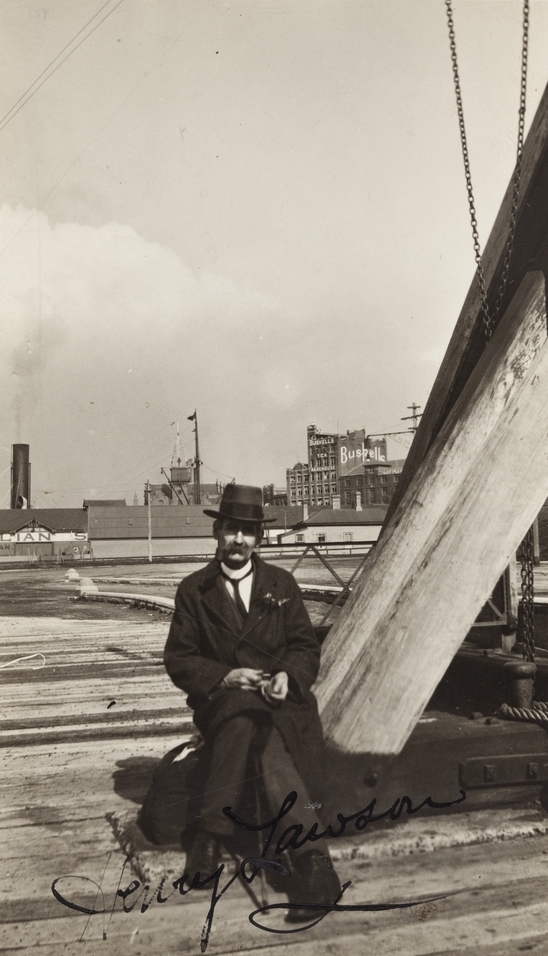
Henry Lawson waiting for horse ferry at Dawes Point, Sydney, 1922- Photographs of Henry Lawson in North Sydney including his former residence, 1922(three weeks prior to him passing away) - photographed by Phillip Harris. Image No.: a6161001h, courtesy State Library of NSW.
Soldier's Letter.
Driver Norman Butchart writing to his father, Mr. M. C. Butchart, from France, under date 11th September, says : — Have not written you for some little time, haying been kept going a lot, but thank goodness now we are well out of things and miles and miles from the fighting line, back out for months and months. It's great to get back around these parts, everything seems so peaceful ; no bombs or shells to worry about. Had rather a rough time the last six months or so, but now, thank goodness, have finished for some little time, and from the look of things I honestly think we may not see much more fighting. Have received all your letters. . . . . To-day we were officially told that our Battalion, owing to lack of reinforcements, would be broken up ; its mighty hard to see the old regiment pass out, and everybody feels things very badly; I felt real downhearted myself ; we will go to other battalions and units of the Brigade, but what unit I am going to so far I do not know, but in all probability will be transferred in the course of the next week or so. It is promised that when hostilities cease, those of us that are left will be re-organised again and return to Australia as the 19th Battalion, and thank goodness the 19th so far has yielded not one inch of ground, and every time we've been in action we came out with colours flying ; I don't think there are any battalions in the A.I. F. with a better record — anyhow am positive we are second to none. Our chaps have fought and died in all countries, and always facing the enemy and heads in the air for dear old "Aussie." I've been' through continuously with the Battalion — mighty lucky, thank God. Great news these days, dad, and now think its coming our turn, and hope the Hun gets everything that's coming to him, and feel sure he will. Everything is going splendidly — couldn't be better.Soldier's Letter. (1918, December 24). The Grenfell Record and Lachlan District Advertiser (NSW : 1876 - 1951), p. 2. Retrieved from http://nla.gov.au/nla.news-article111955942
LOCAL NEWS
WEDDING. Butchart—McCarthy,.
Mr. Norman Butchart and Miss Kathleen McCarthy, daughter of Mr. and Mrs. McCarthy, late of Grenfell, were married on Friday at St. Mary's Church, Manly, Father McGovern performing the ceremony. After leaving the church the wedding party adjourned to "Dungowan," where a prettily laid out and sumptuous wedding breakfast was partaken of, all thoroughly enjoying themselves, passing a real merry and happy time. The usual speeches were made, felicitating the bride and bridegroom, and dancing was indulged in, terminating shortly after 5 o'clock. Among the friends present were Mr. and Mrs. Perdriau, Mr. and Mrs. Erwin, Mrs. Bell, Miss Howley, Mrs. Tarlby, Miss G. Butchart, Mr. Boy Perdriau, Mr. Colin Butchart, Misses Jean McCarthy, Biddy Perdriau, Billee Cooper, E. McCarthy, D. McCarthy, Mr. Tom Roberts, Mr. and Mrs. Lea Hogan, Misses Jill and Judy Hogan, Mr. and Mrs. Speirs, Mr. W. F. McCarthy and Mr. M. C. Butchart. The week prior to the wedding Mrs Lea Hogan, sister of Mr. Norman Butchart, entertained at a shower afternoon tea, at her home in Manly, over forty friends of the happy couple, at which many handsome presents were made, and a very pleasant and happy time was spent. LOCAL NEWS (1928, June 25). The Grenfell Record and Lachlan District Advertiser (NSW : 1876 - 1951), p. 2. Retrieved from http://nla.gov.au/nla.news-article115900526
GREETINGS.
In forwarding season's -greetings, Mr. M. C. Butchart encloses the following from his book of cuttings: — ' 'IF I HAD MY WAY.'
If I had my way, I should sow in my garden the seeds of loving kindness, and take care that some fell in my neighbor's garden also. I would plant the herbs of sweet temper, and the shrubs of unselfishness. In another corner I would plant the' bulbs of sweet content, and the sturdy trees of truth. ?I would sow the seeds of patience and the plants of forgiveness and forbearance. I would plant a border of happiness, intermingled with joy. I would plant a hedge of love and a trellis of true friendship. If I had such a garden, I should ask my friends to come and take cuttings of the plants with them, and so endeavor to do a little good in the world. GREETINGS. (
1928, December 20).
The Grenfell Record and Lachlan District Advertiser (NSW : 1876 - 1951), p. 5. Retrieved from
http://nla.gov.au/nla.news-article115904033
Reminiscences
by M C Butchart
Reminiscences.
When Haddon Chambers (a nephew of the late Mrs. W. B. Howarth) visited Grenfell no one would have believed that he would become one of the most successful playwrights of his time. His sense of comedy was unerring, although his treatment of dramas as a rule was also sure. Beginning with 'Captain Swift,' which part was played by Maurice Barrymore, he wrote 'Passers-by,' 'The Tyranny of Tears,' 'Tante,' 'A Modern Magdalene,' 'John a Dreams,' 'The Idler' and so on. A more delightful companion that Chambers could not be found. He was universally popular. No matter what his income might be he always lived up to it. When he was down in his luck only those who enjoyed lending him money ever guessed it. His clothes were perfect, his appearance ifuaculate. No one could equal him in the art of ordering a lunch or a dinner. He was never a prolific writer. He indulged himself in long intervals of relaxation between plays. Trips to the Riviera and to. St. Moritz he took as a matter of coursed
In later years I met 'Banjo' Patterson at Grenfell when he was interested in some portion of the Weddin Mountains. I had not seen him since I had left the Sydney Grammar School when we had both been to school under the headmastership of the late grand A. B. Weigall. Patterson was not a frequent visitor to Grenfell, and eventually gave up his Weddin Mountains property. He was at the South African war as ' war correspondent, and went to China as special correspondent. Editor Sydney 'Evening Newg, also 'Town and Country Journal.' His poems will keep his' memory evergreen, not forgetting 'The Man from Snowy River,' 'Clancy of the Overflow,' 'Rio Grande's Last Race,' and many others.
...
Excerpts from a letter written by Lawson to his friend 'Benno,' who at the time was in Harefield Hospital in England, having been wounded in the, war. (At the time he was on a small block of land at Leeton. He said he would hold it down until some of his crippled mates returned who knew more about fruit trees than he did).
It's hot here in February — he says — and last Saturday was the limit. It was a corker. It's so hot here just now that you can wash out your pants and hang' them on the line, and run round the house and take them down dry. It's a prohibition area, and the driest and thirstiest I've ever struck. . . . We can only get together in the alleged cool of, the evening and sing 'The Gate's Ajar for Me,' 'and hope for a demijohn. . . . He concludes a long and interesting letter. 'And if Allah does not forbid, and I DO get away after all — as doctor's orderly (or disorderly) mascot, or Regimental Goat, or something — and we pass each other on the water, I'll get a wireless to you somehow. And if a submarine gets us I'll get a wireless to you all the same. And if when that message comes to you, you feel a chilly breath on your cheek and may be faintly catch the faint and mournful strains of a harp at the same time, you'll know I've been elected;, but you'll be sure I'll be doing my best under those depressing circumstances and keeping up a fire for you.
IF, on the other hand, you feel a hot breath and get a whiff of something like sulphur at the same time, you'll know that I'm among friends and old pals, and looking out for a cool and shady corner against your arrival. But we'll meet before that. 'Come Back.' I watch .the track on the redsoil plain, To the East when the day is late, For one who will surely come again, In summer heat or in winter rain, Limping under his swag in pain — For a crippled Anzac mate. — Henry Lawson. _ With your paper's kind assistance and generous indulgence I have endeavoured in my small way to pay a tribute to a kind and generous friend —a .friendship all too short for me. I found him to be, a man ever ready to assist his poor struggling fellows. He was a friend to all but himself.
As before stated — and memory revived by the late pilgrimage to his grave. I also met and knew the late Henry Lawson many years ago while living at Manly, and spent some very pleasant times in his company. We would meet of an evening, stroll round, and stop one occasionally. I found him a genial boon companion., inclined to be reserved, enjoying himself in his own quiet way. He and the late Phil May were great friends, and both very much attached to each other. Both now have gone the way of all flesh. He, as is well known, was born at Grenfell, being the son of the late Peter Hertzberg Larsen, a Norwegian, his mother being Louisa Albury, a native of New South Wales. He worked with his father as a boy and went to Sydney at the age of 17, learning the trade of a coach painter. He commenced writing verses when he was 20, and was on the staff of several papers. He travelled extensively in New South Wales, West Australia and New Zealand, engaging in various occupations, and died in Sydney in poor circumstances, being accorded a State funeral. It is mooted to erect a statue of him in the Sydney Domain near that of Bobbie Burns. The Sydney 'Bulletin' is a great supporter. The late Mr. Archibald, of that paper, was one of Lawson's best friends. A Norwegian has just lately completed a version of Lawson's poems into Norwegian for circulation in that country. I quote a verse or two from here and there:
'The Drover.'
Our Andy's gone to battle now
'Gainst drought, the red marauder,
Our Andy's gone with, cattle now
Across the Queensland border. '
Oh, may the showers in torrents
fall,
And all the tanks run over,
And may the grass grow green and
tall
In pathways of the Drover.
And may good angels send the rain
On desert stretches sandy,
And when the summer comes again
God grant 'twill bring us Andy.
'Out Back.'
For time means tucker, and tramp
you must where the scrubs and
plains are wide,
With seldom a track that a man
can trust, or a mountain peak to
guide,
All day long in the dust ami heat—
,When summer is on the track,
With stinted stomachs and blistered
feet,
They carry their swags Out Back
'The Vagabond.'
A rolling stone! — 'tis a saw for
slaves —
Philosophy false as old,
Wear out or break 'n-eath the feet of
knaves,
Or rot in your bed of mould.
Cleave to your country, home and
friend,
Die in a sordid strife,
You can count your friends oil your
finger ends,
In the critical hours of life.
Sacrifice all for the family's sake,
Bow to their selfish rule!
Slave till your soft heart they break
The heart of the family fool.
OBITUARY.
The death occurred at Manly last week of Mr. M. C. Butchart, at the age of 83 years. 'Butch.', as he was known to old friends, came to Grenfell about sixty years ago, and was manager at different times of the Oriental, Union Bank, and Bank of Australasia. He took a great interest in all matters for the good of the district, and was a first-class amateur entertainer, especially as a corner man (with the late Jack O'Brien) in ....minstrel shows. He was a man who enjoyed life to the full, and was very popular. He married Miss Jane Rich (daughter of the late Joseph Rich, who built the Royal Hotel), who predeceased him. After leaving Grenfell. the late Mr. Butchart joined the firm of Dalgety and Co. and later returned to Grenfell and opened a stock and station agency business in partnership with his son Norman. Later he went to reside at Manly, and remained there till the time of his death. The late gentleman was also for some years a member of the Western Lands Commission. A daughter (Nan) and two sons (Messrs. Norman and Colin) survive. The funeral was on Friday, the interment being in the Church of England cemetery, Manly. OBITUARY. (
1939, June 26).
The Grenfell Record and Lachlan District Advertiser (NSW : 1876 - 1951), p. 2. Retrieved from
http://nla.gov.au/nla.news-article115434312
THEY BURIED HARRY LIKE A LORD.
INSIDE POLITICS
by Jack Lang
No one else could have written the story as he would have written it. A State funeral for a down-and-out scribbler of verses and short stories.
The poet who hated sham and pretence. The lover of the underdog. Then in death, to receive the homage of leading citizens.
A week before they would have dodged by on the other side to avoid him. Now they wanted to bask in his reflected glory. Henry Lawson with his delicate touch of irony would have done full justice to the story. It was September 4, 1922. The setting was in all the awe of St. Andrew's Cathedral. Vice-Royalty was there with Lieut.-Gov. Sir William Cullen, the Prime Minister (W. M. Hughes), the Treasurer (Stanley Melbourne Bruce), Cabinet Ministers in striped pants. High functionaries of State. Representatives of all kinds of public bodies busily engaged in thrusting their cards into the hands of reporters so that they would be mentioned in next morning's papers as "among those present." There were a few of his old mates. Roderic Quinn, Tom Mutch, George Robertson (of Angus and Robertson) and members of his own family. But they were nearly all strangers.
HIS OLD MATES WERE MISSING
His old mates were missing. They would have been too shabby for such an occasion. There had been a lying-in-state before the funeral service. Hundreds had filed past. Many came from curiosity, others to pay tribute to a man of genius. How incongruous it would all have seemed to him. There is something about State funerals that always rings false. None could have been more hollow than this for Harry the Poet. Two days previously, at the age of 55, he had died in a small cottage at Abbotsford from a stroke. He had just about reached the end of a bitter, long road. His enemy through-out life had been drink. It had won in the end. He was broke to the wide, wide world. They couldn't even find a pair of pyjamas amongst his shabby possessions. The Premier Sir George Fuller, had brushed aside earlier requests for a Government funeral, but some newspaper reporters talked to Billy Hughes. He quickly realised that it was an occasion when he could go back to the memories of his own early days. So Billy ordered a State funeral and issued a long statement full of rhetoric. That was why they were burying Harry like a lord of the realm. The destitute poet was being carried in State down the nave of the Cathedral. It was the first time he had been in any Church for as long as I could recall. A sculptor was even commissioned to take a death mask for posterity. There were a few touches that he would have appre-ciated. The small bunch of native rose, the gum leaves, the bush ferns and the cluster of wattle blossoms that they found for the casket. There were also ornate, magnificent wreaths. The cost of any one of them would have kept him for a week. The Commonwealth Government had been paying him a munificent pension of £1 a week from the Commonwealth Literary Fund. It didn't go far. Not the way that Harry spent it.
THEY PLAYED FUNERAL MARCH
Archdeacon D'Arcy Irvine preached a very eloquent sermon. He took as his theme the lines . . . They'll take the golden sliprails down And let poor Corney in". Lawson, himself, might have chosen a few lines from "Past Carin''. But the service was most impressive. Then they played Chopin's Funeral March, and the choir sang "Rock of Ages". My own thoughts could not but go back over the years, thinking of Lawson as I had known him. Law-son the scraggy, always untidy figure with those burning brown eyes, always trying to escape from the world and himself. We had first met at Wm. Henry MacNamara's bookshop in Castlereagh St., between Bathurst and Liver-pool St. where the fire station now stands. It was next door to the old Opera House. Opposite was the Protestant Hall where Georgie Reid and Holman had some of their great en-counters and Rev. Moses held his Pleasant Sunday services. Mac's book shop was the meeting place for the anarchists, the intellectuals and the politicians of the period. MacNamara and Sam Rosa found them-selves in strife with the law over their story about the run on the Savings Bank in "Hard Cash."
CUSTOMERS AT BOOK SHOP
Holman and Hughes could be seen browsing among the books. They seldom bought any. The best customers were the parsons. Mac would some-times display a few saucy pictures, and they were his best selling line. The atheists said the parsons bought them. Andrews the Anarchist and Joe Schellenberg the atheist came to argue politics and philosophy. J. C Fitzgerald would drop in to test out his latest ideas; The poets would be there browsing. Upstairs Mac had fitted up a reading room. That was where I first met Lawson. His mother, Louisa Albury or Lawson, was a poetess. She was also editing a women's paper called "Dawn." She was a great feminist. She was as aggressive as Henry was re-tiring. She encouraged him to write.
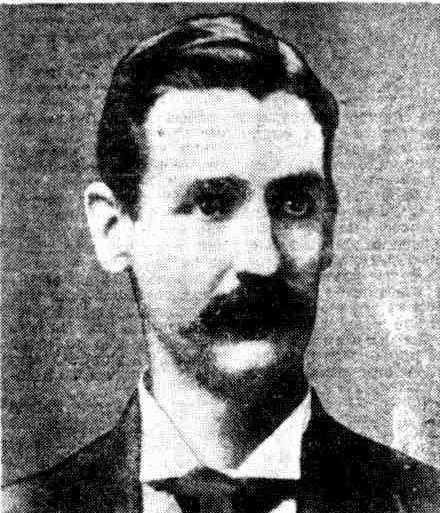 EXCITED WHEN VERSE APPEARED
EXCITED WHEN VERSE APPEARED Lawson was not interested in serious works. While others browsed through Ingersoll, or waited eagerly for the latest book by Emile Zola, Lawson was more interested in the daily papers or any works of light fiction. Bret Harte was one of his favorites. Dickens was another. He was just making his way with the Bulletin. He would be around the book-shop then disappear for months at a time. On his return he would tell us about how he had humped his bluey outback. For a time he had a job on a Brisbane paper. He was highly excited when his verses appeared. Right from the start he was a drifter. He drifted in and out again. He said that he had Gypsy blood. But he was really a vagabond by nature, always trying to escape from the ordinary problems of life. That was what made him so sympathetic to other people. Eventually the shy Lawson plucked up enough courage to marry one of Mrs. MacNamara's daughters. I married another, so we saw quite a lot of each other. Shortly after they were married, Harry brought his young bride to stay, with us out at Dulwich Hill. I was working in an accountant's office. He was writing "In the Days When the World Was Wide" and "While the Billy Boils." He would go into the city and collect a few shillings at the Bulletin or get an advance from Angus and Robertson against future royalties. He would then forget all about writing, and start shouting for anyone who happened to come along. On one occasion he came home in a shocking condition. If he had been drinking spirits, he would be-come belligerent. If he had been on beer, he was morose and sentimental. On this occasion, it had been brandy. So we locked him in a room with a table and chair, and a candle.
Next morning he emerged triumphant. He had written "They Wait on the Wharf in Black." On another such occasion it was "Klondyke and Back." "Faces in the Street" also came into being in an attack of deep personal depression. They always say that genius is erratic. Well Harry was a genius.
MADE FRIENDS WITH AN EARL
Shortly afterwards, he left us to go to New Zealand where he had been offered a position as a teacher. His wife, Bertha, did most of the teaching. Lawson was writing. He soon came back. Then in the Cathedral came thoughts of Harry when he was on top of the world. He had made friends with a real live Earl. He was the Governor of the State, Lord Beauchamp. After Lawson came home, he found that, the Governor was setting himself up as the patron of the arts. It was quite fashionable at that time to be thought a Bohemian.
THE "SEIDLITZ POWDER PARTY"
Beauchamp had started off badly by trying to add a literary flourish to one of his statements, when he declaimed, "Your birth stains, you have turned to good." It didn't make him very popular in squatter society. So he adopted the artists and the poets of the time. Paris House was the great social rendezvous. Soon the Bulletin School found that their patron was a good host. The climax came when he issued invitations to a Government House garden party. He sent out cards in one color to his friends — Lawson included The others went to the stand-offish clique. They called it the Seidlitz Powder Party. Lord Beauchamp later invited Lawson and his family to London, where he tried to sponsor a new literary career for him. Lawson had many tales of the splendor of the Earl's mansion in Grosvenor Square. It looked as if he might do quite well as the wild colonial poet. He was a Philis-tine. But he couldn't stay long. He got itchy feet to get back again among his old cobbers.
Then there were memories of Lawson and his friends in The Village, as they called Manly. Lord Beauchamp lent them his yacht the "Vesta," which was moored close to Manly Wharf. Roderic Quinn, Victor Daley and E. J. Brady were among those who joined Lawson. For many years, I kept a few verses written by Daley, leaving instructions for Lawson what to do after they had gone to the Village for further supplies. The verses were good, although the subject matter was very crude. They didn't mind living like toffs, even though they could see through it all. Harry was no man for family life. He drifted out of it, as he drifted out of other things. Back came memories of Harry's accounts of his tussles with the Bulletin. They would go up and see J. F. Archibald, the editor. He would give them a voucher. Then they would try to collect from "that so-and-so Scotsman, Macleod." "It was like trying to get blood out of a stone," Lawson would moan. But they invariably collected just the same. Or the time that Bland Holt, the theatrical manager of the day, commissioned him to localise the "Mystery of the Hansom Cab." Bland said he would not pay until Lawson did the job.
NO GREATER NATIONALIST
Lawson had no interest in the theatre. It ended up with my doing the localising so that he could do the collecting. Bland Holt was satisfied. So long as the audience could recognise the names of a few local celebrities and places he was satisfied. With it all, Harry was a good Australian. It is rather amusing to find the Communists claiming him as one of their own. There was no greater nationalist than Harry. His verse throbbed with the love of country. There were times when he almost appeared jingoistic. "My Army, O My Army," the "Star of Australasia" and "For Australia" were the reflection of the real, thinking Lawson. He hated the foreign lap-dogs. Time after time, he had visions of a great yellow horde descending on this country. He warned us against Russia. His horizon was Sydney Heads. The fact that he couldn't help himself, and that no one could help him in the end caused no resentment. He was full of humanity. He was always dwelling on the frailty of mankind. Without any pride of his own, he was strangely full of pride in the poor. That was why the State funeral seemed so much out of keeping. Then the casket was carried out of the Cathedral into George St. where thousands had assembled, the mounted police troopers were at the head of the cortege. The dignitaries had difficulty in reaching their carriages, so many citizens were anxious to pay a tribute. They included the children who had so often teased him.
WANTED OLD BUSH FUNERAL
In the background, no doubt, shyly hovered some of his old cronies. They couldn't believe that their old friend was such a great man. To me the most ironical touch of all was the Police Band, solemnly preceding the hearse, playing the "Dead March in Saul". How often had Harry said he wanted a brass band for his funeral. But he wanted it to play lively, bush tunes and rousing marches. Then, as he said, he wanted the bandsmen to drop out of the procession, one by one, and have a drink for him. He wanted the good, old bush funeral. Instead, the traffic halted, the police bands-men continued their dirge through Paddington, Bondi Junction and Waverley, to Waverley cemetery. They didn't drop out. That would have disappointed Harry. Still he had all the trimmings. They had buried him like a Lord. He had held his "Last Review", but the bushmen of Australia were not there. His own epitaph to fit the occasion would have been: — . . . I held Australia first. I wrote for her, I fought for her, And when at last I lie. Then who to wear the wattle has A better right than I?
Above: scene at the funeral of Henry Lawson. Left:. The poet himself.
Bookstore Was Labor's Cradle
By J. T. LANG, Twice Labor Premier of N.S.W.
MY political education started in McNamara’s bookshop in Castlereagh St. in the early 90's. There the Labor Party groped for its soul, and its policy. There flocked the poets and the philosophers of Sydney town. The idealists and the materialists. The republicans and the anarchists. The atheists and the parsons. They browsed and they argued. They planned and they plotted. To me it was all very exciting. Although only a youngster I had the political bug badly. The Labor Party had surprised itself by winning 35 seats at the 1891 elections. It was on top of the world. But there was already a faction fight. Some were for Free Trade, and others were Protectionists. I was a Protectionist.
Mr. Holman
Henry Lawson
MR. LANG
MR. HUGHES
There was trouble over the solidarity pledge and the rights of Caucus. The 'Outs,' including Hughes and Holman, were plotting against the 'his.' But in the bookshop the arguments centred around Socialism, whether Australia would one day be a republic, finance, and the Balmain ferry. McNamara was a fiery idealist. He lived in the world of William Morris, Bellamy and Hyndman. His wife, Bertha, since called the 'Mother of the Labor Movement,' was much more practical. 'With Rose Scott she organised the fight for women's suffrage and for the Factories' Act.
Bertha McNamara had two daughters. Henry Lawson, the poet, married one — Bertha, a nurse. I married the other.
Lawson was only one of the many literary giants who made the bookshop their headquarters. Victor Daley, Alexander Montgomery and Rod Quinn mingled with the publishers of the political pamphlets, then the rage, and the more sedate staff of the Worker and The Bulletin. J. F. Archibald and William Macleod often came Up Bulletin Lane seeking new talent. Everyone had a cause. Lawson — quiet, soft-spoken and slightly deaf — did a lot of thinking as well as a lot of drinking. The wildest revolutionary of them all was the most aggressive Australian. No one placed their allegiance to any country before their allegiance to Australia. Lawson often told me that we would one day have to fight against invaders. When that happened-, it would be the men from the bush who would save Australia. Like most of the bookshop fraternity he put Australia first. He was a crusader at heart. His sentiments went into his work. 'Star of Australasia' and 'The Coming Storm' were his favored prophecies. He felt deeply. 'Faces in the Street' and 'Arvie Aspinall's Alarm Clock' showed how close he was to the people. But Lawson never joined any political party. He had no time for meetings. He was no orator. His mother, Louisa Lawson, was much more active in politics. She had published 'The Republican,' and later, a feminist paper, 'The Dawn.' But Harry was too shy for public life.
With Victor Daley and Rod Quinn he would disappear for days down Middle Harbor, or camp on the Vesta, a small boat, off Manly. They would first talk Archibald into an advance. Then they would have their work cut out getting Macleod, a canny Scot, to part up before they delivered the goods.
My brother-in-law thought I spent too much time worrying about the Labor Party and its future. Very often I had to worry about his.
ON one occasion I met him in George St. He had a pressing problem. Bland Holt had promised him a 'fiver' to localise a racing drama. Harry thought it was out of his line. But he needed the 'fiver' badly. So he persuaded me to rewrite the melodrama. I had to bring in the names of as many prominent people and landmarks as would get by the law of libel. It was the only time I ever wrote for the theatre. Bland Holt was so pleased that he wanted Harry to write him another racing drama. But it was the first and only time for both of us! Then, one Friday afternoon, I picked him up at the corner of King and Castlereagh Sts. He had been with his mates, and was very much the worse for wear. We were both living at Dulwich Hill, and I had promised to bring him home. In desperation, I persuaded the driver of a hansom cab to take us home. He demanded 15s. I had just been paid, and 15s was a full week's wages. But rather than disappoint the family, I agreed to the terms. As we were travelling along George St. West, Harry decided that the driver was too slow. So he started to let him have it in good, ripe Australian bush oaths. He became louder and louder. The driver pulled in at St. Benedict's, and said he wouldn't go any further. I was in a real quandary. Finally we compromised. I took out a huge bandanna handkerchief and gagged Harry for the rest of the journey. On arrival at Dulwich Hill he was completely helpless. We thought he was dead. Finally we managed to get him into the house and put him to bed.
Next morning, bright and early, he came out and produced a story he had written over-night. It was 'They Wait on the Wharf in Black' — one of his finest efforts. I asked Lawson what poet had influenced him most in his writing. 'I don't know his name,' he replied. But he wrote some lines that are always with me. They are: — 'Many are the thoughts that come to me, In my lonely musing, Which to take, which to leave, I cannot tell, For to leave any, seems a'losing There were many interesting characters at the bookshop. But the one who made the deepest impression was Arthur Desmond, who secretly published 'Hard Cash,' a militant journal that attacked the banks, and exposed the doings of the wealthy corporations and companies. Desmond was reputed to have been a lieutenant in the Royal Navy, and private secretary to Sir George Grey, the radical Governor of New Zealand. Desmond worked with Dick Seddon before coming to Sydney. Here he contributed to the 'Wild Cat' column of the Bulletin, and wrote weighty financial articles for different papers.
BUT as Ragnar Redbeard, the anonymous poet and political writer, he was a real revolutionary. Above his flaming red beard, he had features very much like those of Edgar Allan Poe. He was the' author of 'Might Was Right.' His 'Hard Cash' was the most provocative journal of the day. One day in 1893, in the middle of the bank crisis, early morning arrivals in town were staggered to find a huge sign with 'Gone Bung' stretched across the road in front of Barrack St. Savings Bank. Depositors rushed into town. 'Hard Cash' alleged they took the money from the Savings Banks across the road to the' Bank of New South Wales. It was generally believed that the Bank of N.S.W. took it back, via an underground tunnel, to the Savings Bank. Finally Premier Dibbs did what Sir Robert Gibson refused to do for me 40 years later. He announced that the Government was behind the Savings Bank to the last penny in the State .
THE run stopped. Desmond was blamed for the incident and fined. Desmond was reported to have lost his life fighting for Australia in Palestine in the First World War. No one ever knew where 'Hard Cash' was printed. Copy was deposited in a box on the counter of McNamara's bookshop. Amongst the most frequent contributors were the detectives seeking the publisher. But they never found Desmond taking it out of the box. Actually, it was printed in the front room of a cottage in Rose St., Darlington. I helped Desmond by turning the 'mangle,' and assisting with the -type. It was my introduction to Labor journalism, of which I have since seen quite a lot. Another bookshop identity was Tommy Dodd. He was a radical, and a good platform speaker. He was the A. D. Kay of the 90's. With Holman, he helped to organise the Solidarity Group and was responsible for a great deal of the Labor Platform and the solidarity pledge. Neither Hughes nor Holman was a member of the bookshop group. They were regarded as political careerists. They were single-taxers in the first place, and had linked up with Frank Cotton and A. G. Huie in support of the Henry George theory. Holman's father, an old Shakespearian actor, taught elocution at Leigh House, down the street. Holman worried too much about his own future.
Sent To Gaol
Tommy Dodd was registered as the publisher of Justice, another violently Labor paper. The paper had no staff. Anyone who wanted to, contributed. It' published a vicious attack on Tom Slattery, then Minister for Justice. McNevin the compositor, Mason the printer, and Tommy Dodd as publisher, were all brought to trial on charges of criminal libel. The real author was a prosperous gentleman, a regular Tory. He sat in court throughout the proceedings and heard Dodd and his mates found guilty and sentenced. But no one gave him away. Andrews, the anarchist, was another colorful figure. He had been a public servant in Victoria and published The Anarchist. He had no type faces for his paper, so he cut a full fount from cigar boxes. Sallow complexioned and saturnine, he was the perfect type. At the same time, he was highly intellectual. Finally, poor Andrews was sent to gaol. After his release he turned over a new leaf. Violently Labor Captain Douglas, a direct descendant of the builder of the Eddystone lighthouse/ and a seafaring man, who had been captain of a Port Line ship, organised the Active Service Brigade. It demanded free speech and invaded public meetings, claiming the right to move resolutions. Its greatest victory came when it forced Sir William McMillan to quit East Sydney for Burwood, which opened the door to George Reid in East Sydney. McNamara kept a large reading room above his shop, where most of the debates took place. There could be found Joe Lesina and Joe Shellenberg, atheists who were wrongly accused of blowing up some machinery in the harbor; Jack Dwyer, a 'red flagger' who became a leading fair rents advocate; Harry Holland, who ran a paper at Leichhardt and later went to New Zealand to establish a Labor Party there, becoming its first leader. There, too, were Sam Smith, of the Seamen's Union, who went to gaol with Holman over the unfortunate Daily Post incident, on a charge of conspiracy. Holman received two years and Smith 18 months, but they were released in a few weeks, after an appeal on the grounds of a mistrial. It was over a loan on some machinery.
The Daily Post, the first Labor daily, expired soon after. Organised Brigade But the heaviest blow fell when poor Mac himself was sent to gaol. It was over an article that had appeared in Hard Cash attacking the solvency of the Savings Bank. The police couldn't sheet it home to Desmond. So they proceeded against McNamara and Sam Rosa, who was secretary of the Socialist Party, and later editor of Truth and leader-writer on the Labor Daily. Neither had had anything to do with the article, but someone had to pay. They were both gaoled, but were treated as political prisoners. In those days many of the ideas were regarded as revolutionary and dangerous. Today they are 'the law of the ! land. My own role was j mostly that of an observer and pupil. But there were lessons that I have never forgotten. One was that if you keep on fighting for a principle, you can never be defeated. The other was that without the idealists there could never be a Labor Party. That was why McNamara's Bookshop was the cradle of the Labor Party. Bookstore Was Labor's Cradle (
1950, April 2).
Truth (Sydney, NSW : 1894 - 1954), p. 21. Retrieved from
http://nla.gov.au/nla.news-article167911558
MRS. B. McNAMARA.
The death occurred on Saturday of Mrs. Bertha McNamara, the mother of Mrs. J. T. Lang, and of Mrs. Henry Lawson. Mrs. McNamara had a life-long service in the Labour movement, and up to a few weeks ago took an active interest in A.L.P. affairs. For many years she was a familiar figure at A.L.P. conferences. Mrs. McNamara conducted for many years a well-known book shop in Market-street and dealt largely in Labour and Socialist literature.
The funeral took place yesterday. The principal mourners at the Rookwood cremation ceremony were Mesdames J. T. Lang, H. Lawson, S. Pura (daughters), Messrs. W. McNamara and E. Bredt (sons), Mr. J. T. Lang and Mr. S. Pura (sons-in-law), Mesdames F. Hill, G. Herwig, E. Arnold, and Miss Bertha Lawson (granddaughters), and Mr. C. Lang (grandson).
Mr. J. Bowden, of the Rationalist Association, who conducted the ceremony, said that Mrs. McNamara was an idealist in the highest and best sense of the word. Mr. Eldridge, M.P., read a statement of Mrs. McNamara's views on the present social system written shortly before her death.
Others present were the Minister for Agriculture (Mr. Dunn), the Minister for Local Government (Mr. McGirr), the Speaker (Mr. F. Burke), Mr. Justice Evatt.
The A.L.P. was represented by Messrs. P. Keller (president), J. J. Graves (secretary), J. B. Martin (organising secretary), H. O. Regan (returning officer), C. Matthews (vice president), and S. Green (executive member).
Representatives of the Child Welfare Department were Messrs. W. P. Lynch, P. Hicks, J. O'Neill, and D. Robertson. Mr. Jack Vincent (secretary) and G. Gunn (publicity officer) represented the Henry Lawson Literary Institute.
The Neutral Bay Labour League, of which the deceased was a member, was represented by Captain J. J. Collings, Messrs. J. W. Atkins, J. Brady, D. Lister, J. Miller, and H. Hatcher.
There were also present Mr. and Mrs. H. Stolmack, Mrs. Grant, Mr. and Mrs. S. A. Rosa, Mrs. C. Burke, Mrs. R. J. Cassidy, Mrs. C. Green (secretary of the Women's Vanguard), Mr. and Mrs. Godsell, of the Tempe Park A.L.P., Alderman E. O'Dea and Mrs. O'Dea, Alderman F. E. Miller and Mrs. Miller, Mrs. Eldridge, Mrs. M. Colbourne (representing Miscellaneous Workers' Union), Mr. and Mrs. A. J. Macpherson, Mr. and Mrs. W. M. Webster, Messrs. G. Manuel, ex-president, Amalgamated Printers' Union, E. McGuiness, D. Wakefield, J. Stewart, president of the Labour Council, D. Grant, J. M. Martin, organiser of the Electrical Trades Union, T. H. Allan, Dan Green, C. Bartle, J. Phegan, J. P. Freund, F. Roels, H. Arnold (Earl-wood), F. Hancock, assistant secretary, Ironworkers' Union, H. Dessaix, representing Mosman Labour League, T. Egan, representing Widows' Pensions Department, A. Webber, W. Bottom, C. Randle, J. R. Ryan, A. E. Smith, A. Rosenberg, of the Howarth Prison Reform League, G. Williams, organiser Road Transport Union, Inspectors W. Paton and C. Anderson. The Auburn Labour League was represented by Messrs. G. Keighery, L. Keighery, J. C. Davidson (vice-president), J. Licardo, G. Byrne (secretary). Representatives of the Women's Central Organising Committee of the A.L.P. included Mesdames Seery, R. Keating (treasurer), M. Caffrey, K. O'Connor, and Nurse Francis (secretary). MRS. B. McNAMARA. (
1931, August 3).
The Sydney Morning Herald (NSW : 1842 - 1954), p. 11. Retrieved from
http://nla.gov.au/nla.news-article16797503
Matilda Emilie Bertha McNamara was born 28 September 1853 in Poznan, Poland to Karl Frederick Kalkstein, civil servant, and his wife Paulina Wilhelmina, née Berndt. She migrated to Victoria, via England, in 1869. After the death of her husband Peter Hermann Bredt, she became a political activist and published Home Talk on Socialism (1891), one of Australia's first pamphlets on socialism. On 9 July 1892 she married William McNamara.
In Castlereagh St, Sydney, she ran a boarding-house, where new immgrants were welcomed and helped, and ran McNamara's Book and News Depot. They sold 'Socialistic and all kinds of advanced Literature', mainly from European and American publishers; the works of A. B. Paterson and Henry Lawson ('splendidly bound'); 10,000 novels by writers such as Dickens, Defoe, Rider Haggard, Balzac, Zola, Wilkie Collins, Twain, Hugo and Dumas; and stationery and tobacco. The 'Cosmopolitan Lending Library' contained 2000 volumes; and the 'International Reading Room' filed hundreds of newspapers, especially European and American socialist papers, which could be consulted for a penny. In the wake of the 1893 bank crashes, her hsuband, William McNamara, was imprisoned for six months for selling a newspaper, Hard Cash, produced by Arthur Desmond, which allegedly criminally libelled a financial corporation.
Bertha McNamara, who has been called 'The Mother of the Labour Movement', carried on agitating for social reform for 25 years after the death of her second husband.
Bertha Macnamra when young - from Album 'Series 07: Henry Lawson family photographs, friends and memorial events, 1897-1956' - creatore Florence Rodway. Images No.: a6176020h and a6176030h, courtesy State Library of NSW
Mrs. E. Tierney
The passing away of Mrs. Elizabeth Tierney, of 'Avoca,' Eccles-avenue, Ashfield, at her residence on the 21st ult., is of special interest to many Mudgee residents, in which district^ she resided for many years. The late Mrs. Tierney was a member of the well-known Rheinberger family, of Eurunderee, Mudgee, being a daughter of the late Mr. Valentino Rheinberger. Two sisters only of the family still survive — Misses A. and C. Rheinberger, of Lewisham.
Mrs. Tierney was the widow of the late Mr. John. Tierney, school teacher, of Eurunderee, whose name is well known and revered by the older residents of that district, Henry Lawson, the great Australian poet, being one of his pupils. The late Mrs. Tierney was of a most loving and unselfish nature, and to those whose good fortune it was to be acquainted with her she will be long remembered. The funeral, which was attended by a large number of relatives and friends, left St. Vincent's Church, Ashfield, after Requiem Mass on Saturday, 22nd ult., for Rookwood Cemetery, by road. The Rev. Father Lavery, CM., officiated at the graveside; Father Lavery was in almost daily attendance on the deceased during her last illness. To mourn the loss of a loving and devoted mother are the following; Catherine (Mrs. Peter Wurth), Matron R.: Tiorney, (Warrawee, Lismore), Leoy (Ashfield), Annie (Mrs. H. Naughton), Croydon; Mary (Mrs. C. Lawson), Campsic; Elizabeth and John (Ashfield). — R.I.P. Mrs. E. Tierney (
1927, November 10).
The Catholic Press (Sydney, NSW : 1895 - 1942), p. 20. Retrieved from
http://nla.gov.au/nla.news-article115212804
SURFING AND CELEBRITIES. Manly's Augustan Age.
(By C.R.C.)It is an aspect of the eternal fitness of things that surfing, perhaps the most virile and most health-giving of all our sports, should have originated, as far as Australia is concerned, in a seaside village called Manly. So popular has the sport become that it is hard to realise that the right to surf was hardly won, and that it is barely thirty years since at was first admitted. Recent references to the origin of surfing, while substantiality correct, require a certain amount of amendment.
At a Sydney reunion of pioneer members of the Royal Life Saving Society, it was stated that there is still a law on the Statute Book of New South Wales which forbids bathing in view, of the public and that this law was challenged, in 1904, by ‘Mr. W H Goucher,' with the result that an agitation in favour of bathing followed and the law has never since been enforced, the village Hampden referred to was Mr. W. H. Goacher (not Goucher) who, at the time, was editor of the local paper unless my memory is sadly at fault (and I was one of the crowd of spectators who aided and abetted him). Goacher was prosecuted in 1903 for the breach of a regulation framed under the Police Offences Act. Though fined in the Water Police Court, Mr. Goacher declared that he would continue to bathe in proper costumes and it was then discovered that the Police Regulation was ultra vires. It was to this, and not to any magnanimity en the part of the authorities, that Sydney people owe their right to surf. - At that time, Manly occupied a narrow isthmus and though it was still affectionately referred to as 'The Village.' it had already commenced to sprawl across the heights to the north and south. The first six years of the present century might aptly be termed the Augustan Age of Manly. Even before the ban on surfing had been lifted, men and boys were allowed to bathe on the Ocean Beach before seven in the morning. Like Wolley’s 'little wanton boys' we youngsters would enter the water, clad only in ‘trunks'. The official who used to chase us shorewards after seven was, appropriately enough, the municipal council's inspector of nuisances, and we wanton little boys saw to it that his job was no sinecure.
Even before the dawn of the century, Manly, had been the home of giants. Cardinal Moran's Palace and the College for the training of Roman Catholic priests towered on the southern heights. On the northern ' height was the ibid home of W. B. Dalley, built in the form of an English castle, and still called 'Dalley Castle,' though it has passed out of the hands of the Dalley family many years since; Its builder, W. B. Dalley, the father of the novelist J. B. Dalley, was a distinguished lawyer and politician who was prominent in the trial of the bushrangers and who was responsible for the sending of a contingent from New South Wales to the Sudan. It was stated at the time that a little boy in Manly had donated the contents of his money box to the patriotic fund raised in connection with the contingent. At all events, following an amount in a published subscription list, were the words 'A Little Boy |from Manly.' Political opponents said that the little boy was none other than W. B. Dalley himself, and the incident provided the Sydney 'Bulletin' with one of those stock mythical figures which were the delight of our fathers and grandfathers. Sir Edmund Barton, afterwards Prime Minister of Australia and a Justice of the High Court, was another well known resident of The Village during the Nineties.
Forlorn Hopes.
It was just after the Boer war that W. B. Goacher commenced to edit a paper called 'The Manly News.' He was one of those lovable fire-eaters whose lifetime was spent in the fighting of forlorn hopes. He was more an artist than a journalist, and not very successful in painting or writing as, in looking after the interests of others, he neglected his own. Certainly, as the Sydney speaker said, surf clubs throughout Australia should do something to perpetuate his memory. He has yet another .claim to distinction. He was Manly's first Labour candidate. There had been a redistribution of seats in New South Wales, and Manly, formerly part of Wahringah, became part of the constituency then called Middle Harbour. In 1904, just after the redistribution, Goacher came out as a candidate for Middle Harbour. His campaign was of the whirlwind variety. His meetings were always crowded. His oratory, and gift for repartee provided entertainment for the masses, but he polled only thirty-three votes. The handicap of a tall hat and a frock coat was too great for a Labour candidate to carry in those days. Next week, in his paper, he returned thanks to 'the thirty-three intelligent electors of Middle Harbour'. Poor Goacher's finances were never in a healthy condition and the loss of his deposit ruined him. He disposed of his paper to “Billy” Melville and went to live in Sydney.
Melville was one of the older school of Bulletin writers. He sang the praises of Manly in season and out of season. It was probably through his personal influence that Victor Daley and Henry Lawson came to live in 'The Village'. I think Roderick Quinn lived there for a little while also. Quinn, if not an actual resident, was a frequent visitor to the others. I remember how we awe-struck youngsters used to gaze at the four poets strolling down the street arm in arm— and taking its width in their stride. One of Daley's, sons was enrolled as a pupil at the Manly Public School. When asked his father's occupation young Daley replied 'writer,' and the headmaster who was a Master of Arts and an honours man in literature cheerfully wrote 'signwriter' in the school admission register.
It was through Melville, that I came to meet both Lawson and Daley. I knew Daley the better of the two. Lawson could not remain long in any place, and while in Manly he met with a peculiar accident. While strolling along the Fairy Bower cliffs, he fell over the rim and broke a few ribs. The usual people said the usual thing about the accident, but I honestly believe that in his absent-mindedness Lawson walked too near the edge and overbalanced. Daley, though a severe critic, was a kindly one. I once had the temerity to call at his house and show him a short story I had written. The place was almost unfurnished, but Daley received me as though he were conducting me into a palace. Incidentally he tore the story to shreds, which embarrassed me considerably because there was another man present, a grim silent looking man whom I thought must be some distinguished editor. I found out afterwards that he was a bailiff. Daley made me sit down there and then and rerwrite the story. The next day, he took me up to Sydney and personally introduced me to the editor of the Bulletin, who also said scathing things about the story — but printed it.
Various Arts.
All the arts were represented, in Manly during those years. Hilder had lived there for many years - even at that time, and was painting his delicate water-colours and battling against ill-health and genteel poverty. Charlie Bryant was still a schoolboy but was just beginning to make a name for himself in black and white work. W.H. Whiddon, afterwards Deputy Commissioner for Taxation in New South Wales, used to gather the aspiring vocalists of the village and drill them in light opera. As a choir-master and a producer of Gilbert and Sullivan operas, he did much to raise the standards of musical taste, not only in Manly, but throughout the whole State. Another notable resident was an exponent of an older and even more individual art. This was Larry Foley, the veteran pugilist. Somewhere about 1904, he established a boxing academy at his residence on the cliffs overlooking the Manly Lagoon. He gathered round him quite a school of fighting, neophytes but none of them achieved fame. Old Larry, it was said, had become crotchetty in his old age and very Spartan in his methods of instruction. If he did not think a pupil worth bothering about any further, a knock out blow ended that pupil's course of training and inclined him towards another career. For a season or two Larry's square stocky figure and his mutton chop whiskers were frequently seen on the promenade. It was a sight for the gods to see him and his great friend and fellow-Hibernian, the genial Dan O'Conner, disporting in the breakers. They were two of the few Manly great ones who remained distinguished looking in bathers. Dan O'Connor had ended his political career by that time. He provided the Bulletin with another of that paper's stock phrases. While Postmaster-General of New South Wales he had to decide upon the appointment of a minor official in his department; There were many applicants, several of whom were strongly recommended. The P.M.G. decided the matter in a laconic and- phonetic minute-— 'Appoint Maloney.' And Maloney was appointed. He habitually wore the tall hat and frock coat of the period, and his flowing white beard would have been the envy of any Druids’ lodge. But to see him rising from the waves, in his red and blue striped bathers, with that avalanche of whiskers wet and bedraggled, was to obtain an idea of what Father Neptune must have looked like. Though a politician, he was a patron of the arts. He it was who spoke at Sydney's welcome to a famous French actress, and referred to the guest as 'La Belly Franzase.' SURFING AND CELEBRITIES. (
1933, February 18).
The West Australian (Perth, WA : 1879 - 1954), p. 5. Retrieved from
http://nla.gov.au/nla.news-article32585829
Another who was contesting the seat of Middle Harbour, and who had a holiday house at Mona Vale:
Mr. W. Scott Fell, who Intends contesting the Middle Harbour seat at the next election, gave an exposition of his views at Birchmore's Hotel Steyne, Manly, last night. Mr. J. P. Wright presided, and there was an excellent attendance. Mr. Fell said that at the last election of the Reform candidate he had remained loyal to the committee, but felt free now to offer himself, and intended going to the poll against all comers, whoever they might be.
The executive committee of the Victor Daley Memorial Fund have obtained the use of the Theatre Royal, through the kindness and liberality of Mr. William Anderson, the lessee, and a big matinee benefit entertainment, to be held on the 30th of next month. The entertainment promises to be of a specially unique and attractive character, and memento programmes will be distributed. Mr. Philip Lytton is generously placing his services at -the disposal of the commlltce, and It Is understood -that Mr. J. C. Williamson's company and other theatrical companies will take part In the performance. A general meeting will be called in the course of a few days, when the committee will ask for the co-operation of all Interested in the movement. MEN AND WOMEN. (
1906, February 17)
.The Australian Star (Sydney, NSW : 1887 - 1909), p. 6 (LATE SPORTS). Retrieved from
http://nla.gov.au/nla.news-article229654019
A little about William Bede Melville:
Bohemians
This story is told of William Bede Melville, associate and friend of Victor Daley, and the gay band of men who gave lustre to the old 'Bulletin' of J. F. Archibald. Melville had many adventures, one of them as lecturer of a travelling waxworks show. The waxworks' tour failed because in the North Queensland heat, Gladstone's nose melted, and Mary, Queen of Scots, had a cauliflower ear like a prize-fighter's. On his return to Sydney one openly admired his splendid raiment and wondered how he came by it, plucking such fashionable safety from the nettle of danger and failure. Sitting with the careless grace of a man prosperous beyond compare and on good terms with the world - Melville put one splendidly trousered leg over the other, displaying with an air a sock of silk and a varnished boot.
''Got you,' said Quinn, 'look at the boot soles!''
Object as he might, the company seized Melville's legs and exposed the boot soles. In each heel was a diamond-shaped hole. The holes had held the steel rods that extended to the height of each leg of a wax figure and when bolted to the floor, held the figure erect
' The resource of it,' said Daley. 'Billy has ratted the waxworks.'
So he had. He admitted later that his wardrobe would be greater, were he able to wear the knee breeches of Napoleon and the farthingale of Queen Elizabeth.'
Politicians
Of politicians, too, he has anecdotes to tell ... 'Told with sympathetic laughter by most men and heard by the wowsers with condemnatory frigidity, was the story of Sir Henry Parkes, congratulated at 60 years on the birth of his youngest — Congratulations, Sir Henry, on the birth of your last child.'
''Don't say my last, you damned fool! Say my latest!'
A tale of Sir John Robertson (one-time Premier of New South Wales), looking at parrots in a bird shop in George street. Robertson had a speech defect.
'I fay,' he said to the birdman. That's a fine gockatoo. What's his prife?' 'He's 25 bob — a good talker and whistler.' 'At fat prife, he ought to be able to speak French and German — fat one, how much?' 'A pound.' 'Dear, dear! Fat one, how much?' 'Thirty bob.' 'Oh, dear! How dear! Gan he torgk?' 'Well,' said the free and independent birdman, 'if he couldn't talk better than you, I’d wring his bloody neck.' The Book of a Hearty Australian (
1945, January 27).
The Mail (Adelaide, SA : 1912 - 1954), p. 6. Retrieved from
http://nla.gov.au/nla.news-article55859232
Mr. W. B. Melville Dead.
Mr. William Bede Melville, journalist and politician, died at Sydney Hospital last week from an acute attack of pneumonia.
He was one of the most widely-known contributors to the press in Australia, and at the time of his death was editor of " The Bystander." For eight years previously he bad been a member of the literary staff of the Country Press Association, and had for many years conducted a " Wimble's Reminder "
Born at Molong about 44 years ago, Mr. Melville was educated for the law, but when a young man was attracted to Sydney, and in 1890 joined the sub-editorial staff of the "Australian Star." He developed an early leaning towards aggressive politics, and allied himself with the Protectionist party, of which Sir George Dibbs was then leader. He entertained pronounced views on all political questions, and he backed up a strong personality with a vigorous pen. Thrice, in later years, he contested the Molong seat in the legislative Assembly, and on one occasion got close to a win. Once he opposed Mr. B. R. Wise and Mr. T Brown in the fight for the Calare Federal seat. At the last State elections be opposed Mr. D. Storey, M L A., for Randwick.
In the journalistic line he was a copious contributor to the satirical press, and did much excellent work under different pen names. During the early '90's he joined the staff of the Melbourne " Age," and while there contributed a series of fine articles, of the newsy, critical type, to the " Australian Star" under the heading of " On Yarra's Banks." It was about that time that he became private secretary to Sir George Dibbs, who was then Chief Secretary. He occupied the post for several years, but in the end his pronounced views on political questions clashed with those of the Protectionist leader, and Mr. Melville went back to journalism. When the Australian contingents were being sent to South Africa Mr. Melville took ship to Capetown, and while there did some vivid work for the London " Daily Mail," including the sensational story of the discovery of Dan Kelly and Steve Hart, the Victorian bushrangers, alive and well, and performing prodigies of valour with the British troops. It was explained that instead of being shot in the last stand of the Kelly Gang at Glenrowan these two bushrangers escaped before the hotel was burned down, and had since lived under false names.
Mr Melville also edited the "Capetown Owl."
When Federation was being fought he wrote much literature in support of the bill, and other people got a good deal of credit for some of his best work. Several years ago he compiled a small volume entitled " Prominent Australians," and it has been said of him that, he knew more about the personal side of Australia's earlier and present day politicians than any other man in New South Wales. His character sketches of notable men contributed to the press have been quoted all over the world. That he never found his way to Parliament was chiefly due to the fact that he was always with the unpopular party, and preferred defeat to a victory that involved a sacrifice of his political beliefs.
" Billy" Melville, as he was familiarly known amongst a large circle of friends, was good company, and told many a racy story of his experiences by flood and field. He was, as before stated, Private Secretary to Sir George Dibbs when that " Damn Chicago" politician was for a period Premier of N.S. W. Melville did not long remain in occupation of the post—he took another job, and when next he and Sir George met, it was under very different and somewhat amusing circumstances. Sir George had gone to Bathurst to officially open the local Show. Wandering about the grounds later on, with his tall hat on the back of his head and a huge cigar in his mouth, he struck a number of "side- shows," and heard over and above the general din a voice that seemed familiar. It came from the front of a tent, and the speaker, clad in fashionable garments and a silk hat, was discoursing upon the splendour of the exhibition to be seen within. Sir George listened, and heard the showman remark apropos of something which followed: "When I was Private Secretary to Sir George Dibbs," &s. The speaker was Billy Melville! Mr. W. B. Melville Dead. (
1914, May 29).
Molong Argus (NSW : 1896 - 1921), p. 7. Retrieved from
http://nla.gov.au/nla.news-article101385253
A very pretty wedding; was celebrated in St. Mary's Cathedral on Tuesday, February 18, when Mr. William Bede Melville was married to Miss Adelia Mary Butler, eldest daughter of Mr. William Butler, now of Manly, and formerly of Dubbo and Cowra. The bride was handsomely attired in a travelling dress of fawn and shot blue, with electric bengaline, and toque to match. She was given away by her brother, Mr. James Butler, of the Corso, Manly. The bridesmaids were Miss Emily Butler, sister of the bride, and Miss Margaret Phillips, attired in gray and blue. Mr. R. Atkinson Price, M.P., was best man. The ceremony was performed by the Rev. Dr. O'Haran, private secretary to his Eminence the Cardinal. Those present were : Mr. and Mrs. Joseph Butler (Manly), Mr. and Mrs. Walter Butler (Nevertire), Miss Rose Melville (Parkes), Mr. and Mrs. W. M'Kay, Mrs. Sutton, Mrs. Ryan, Mr. J. M. Ryan, Mr. T. W. Carradus, Mr. P. B. Whitdeld, and the friends of the bride and bridegroom. Subsequently at the wedding breakfast Mr. it. A. Price, M. P., humorously proposed the health of the bride and bridegroom. Mr. Melville responded, and proposed the toast of ' The Visitors,' Mr. Joseph Butler responding. Mr. and Mrs. Melville left for Katoomba by the evening train. The presents were numerous and handsome. Social (
1896, March 1). Sunday Times (Sydney, NSW : 1895 - 1930), p. 8. Retrieved from
http://nla.gov.au/nla.news-article130398974
DEATH. MELVILLE. — William Bede, dearly beloved husband of Adelia Mary Melville, at Sydney Hospital, of pneumonia. Family Notices (1914, May 20). The Sun (Sydney, NSW : 1910 - 1954), p. 7 (FINAL EXTRA EXCLUSIVE CABLES). Retrieved from http://nla.gov.au/nla.news-article224653202
MELVILLE.—the friends of Mrs W B MELVILLE and Master WENTWORTH MELVILLE are kindly Invited to attend the Funeral of her late dearly loved HUSBAND and his FAÏHER, William Bede to leave our Mortuary Chapel, 810 George street city THIS AFTERNOON at 2.15 o clock, for Catholic Cemetery, Waverley WOOD, COFFILL, and COMPANY, LTD. Funeral Directors, Sydney and Suburbs Phones 726 and 1524 Central_
MELVILLE -The Friends of Mr and Mrs A. A , Mr. and Mrs F P and Mr and Mrs N MELVILLE are kindly invited to attend the rvincml of their late dearly loved BROTHER, William Bede to leave our Mortuary Chapel 810 George street city, THIS AFTERNOON at 2.15 for Waverley Cemetery.
MELVILLE - The Friends of Mr and Mrs. J MACKEY Mr and Mrs J.R. McLEOD, and Mr and J.C.WREN arc kindly invited to attend the funeral of their late dearly loved BROTHER, William Bede Melville, to leave our Mortuary Chapel 810 George street city, THIS AFTERNOON, at 215 o clock, for Waverly Cemetery. WOOD, COFFILL, and COMPANY, LTD. Family Notices (1914, May 21). The Sydney Morning Herald (NSW : 1842 - 1954), p. 7. Retrieved from http://nla.gov.au/nla.news-article15509700
THE LATE W. B. MELVILLE.
The funeral of the late William Bede Melville took place at Waverley Cemetery yesterday afternoon, when a large number of; relatives and friends gathered round the grave. Amongst the mourners were Mr. and Mrs. Mackay, Mr. and Mrs. M'Leod (brothers-and sisters In law), Messrs. J. Melville and T. P. Melville (brothers), Messrs. J. Butler, C . W. Butler, and A. Butler (brothers-in-law) Mr. R. D. Meagher, M.L.A. (Speaker of the Legislative Assembly), Mrs. Walsh (daughter of the late Mr. Victor Daley), Mrs. G. Black, Messrs. F. Broomfield, Roderic Quinn, T. Temperley, C. R. Marshall, P. Packham, C. W. H. Gocher, W. Knight, H. O'Meagher. Mr Irish, J. Clarke, P. J. M'Gauley, J. Huntington and C. Griffiths. The burial service was read by the Rev. Father Treand, assisted by Brother Bernard. Numerous wreaths were laid on the grave, which is located close to that of his old comrade, the poet Victor Daley. THE LATE W. B. MELVILLE. (
1914, May 22).
The Sun (Sydney, NSW : 1910 - 1954), p. 7 (FINAL EXTRA). Retrieved from
http://nla.gov.au/nla.news-article224658689
IN MEMORIAM.
WREN (nee Melville).—In loving memory of my dear wife and mother, Lizzie Aloysius, who departed this life February 15th, 1912. —Inserted by her loving Husband and Son Family Notices (
1914, February 13).
Molong Argus (NSW : 1896 - 1921), p. 5. Retrieved from
http://nla.gov.au/nla.news-article101384111
Death Mr. W. B. Melville.
Mr. William Bede Melville, well known in journalistic and political circles, died from pneumonia at the Sydney Hospital on Tuesday night. Mr. Melville was a well-known figure in the press of Australia. In the 90's he joined first the "Australian Star," and then the staff of the Melbourne "Age." A little later he became private secretary to Sir George Dibbs, who was then Chief Secretary. He went to Africa on the outbreak of the war and did work there for the London "Daily Mail." In later years he thrice contested the Molong seat in the Legislative Assembly, and last State elections he opposed Mr. D. Storey, M.L.A., for Randwick. At the time of his death he was editor of the " By-stander." [Deceased was a native of Molong and a brother-in-law of Mr. John Wren, of Towri. Before adopting journalism he studied law with Mr. Kinoa, in Molong.] Family Notices (
1914, May 22).
Molong Argus (NSW : 1896 - 1921), p. 5. Retrieved from
http://nla.gov.au/nla.news-article101385170
MELVILLE-BUTLER.
Our readers will, we are sure, be interests in a marriage that took place on Wednesday of last week at the Church of the Immaculate Conception, Manly, when Mr. Nicholas Melville, eldest son of the late William Melville, of Molong, was wedded to Miss Emily Butler, second daughter of Mr. William Butler, of 'Annaber,' Manly. The bride, by the way, is a sister-in-law of Mr. W. B. Melville, well-known in political and journalistic circles. It will therefore be seen that two brothers have married two sisters. Mr. Nicholas Melville recently arrived from Salisbury, Rhodesia, but does not intend to return to South Africa before two years. The officiating clergyman was the Rev. Father Hayden. Miss Genevieve Melville, the youngest of the family of Mrs. Melville, senior, was bridesmaid. Mr. James Butler gave away his sister, and Mr. W. B. Melville was the bridegroom's best man. The bride, who looked particularly pretty, was attired in an electric blue and glace silk bodice with honiton hue, white ostrich boa and pretty blue and white toque with black tips. The bridesmaid wore pale blue with hat to match, and cream ostrich tips. The wedding breakfast was served at the Corso Establishment of Messrs. Butler Brothers, when the company included the Rev. Father Hayden, Mr. and Mrs. William Butler, Mrs. Melville, senior, Mr. and Mrs. J. H. Butler, Mr. and Mrs. W. B. Melville, Mr. and Mrs. John McLeod, Mr. James Butler, Mr. and Mrs. W. H. Hannam, Mr. D. W. Custer, Mrs. T. Collins, Mrs. Sutton, Miss G. Melville, Mr. A. A. Melville, and others. The toast of the happy couple was felicitously proposed by the Rev. Father Hayden, and appropriately responded to by Mr. Melville, after which Father Hayden's health was drunk with enthusiasm. Mr. W. B. Melville proposed the health of the parents of the contracting parties, and Mr. William Butler made a characteristically humorous response. Mr. James Butler proposed the health of the visitors, and Mr. Hannam (of Hannam and Co.) and Mr. D. V. Custer (of Ouster and McFarlane) replied. Mr. A. A. Melville gave the toast of Mr. and Mrs. J. H. Butler, of the Corso, and Mr. Butler, in responding, thanked the company for their presence, made reference to happy occasion, and predicted good luck for the young couple. The newlywedded pair left for their honeymoon amid the congratulations and good wishes of all. The wedding presents were numerous, handsome and valuable. A very pleasing little ceremony took place at the establishment of Messrs. Butler Brothers, a few hours before the wedding. The employees of the Firm, having invited Miss Butler to be present, gathered around her in one of the departments. Mr. F. B. Coleman, who had been appointed spokesman, announced that his fellow employees and himself had availed themselves of the occasion to show their appreciation of the amiable and excellent qualities of the young lady, and also to mark their esteem of the brothers of the bride. They asked Miss Butler to accept a present, which proved to be a very beautiful reading lamp. The young lady, who was quite taken by surprise, gratefully acknowledged the present and the pretty compliment paid her and her brothers. Orange Blosoms. (
1900, May 4).
Molong Argus (NSW : 1896 - 1921), p. 4. Retrieved from
http://nla.gov.au/nla.news-article144730806
A Marriage at Manly.
THE readers of the Molong Express will be interested in the marriage of Mr. Nicholas Melville, an old Molong boy, and eldest son of the late William Melville, to Miss Emily Butler, second daughter of Mr. William Butler of 'Annashes,' Manly. This is the second matrimonial alliance between the same families, as Mr. W. B Melville married four years ago, the eldest Miss Butler. The ceremony took place on Wednesday week at the Church of the Immaculate Conception, Manly, the Rev. Father Hayden officiating, Miss Genevieve Melville, the youngest of the family of Mrs. Melville, sen., was bridesmaid. Mr. James Butler gave away his sister and Mr. W. B. Melville was the bridegroom's best man. The bride, who looked pretty and petite, was attired in an electric blue and glace silk bodice with honiton lace, white ostrich and pretty blue and white toque with black tips. The bridesmaid wore blue with hat to match and cream ostrich tips.
The wedding breakfast was served at the Corso establishment of Messrs. Butler Bros., when the company included the Rev. Father Hayden, Mr. and Mrs. William Butler, Mrs Melville sen., Mr. and Mrs. J. H. Butler, Mr. and Mrs. W. B. Melville, Mr. and Mrs John McLeod, Mr. James Butler, Mr. and Mrs. W. H Hannam, Mr. D. W. Custer, Mrs. T. Collins, Mrs. Sutton, Miss G. Melville, Mr. A. A. Melville and others. The toast of the happy couple was felicitously proposed by the Rev. Father Hayden, and appropriately responded to by Mr. Melville, after which Father Hayden's health was drunk with enthusiasm Mr. W. B. Melville proposed the health of the parents of the contracting parties and Mr. William Butler made a characteristically humorous response. Mr. James Butler proposed the health of the visitors and Mr. Hannam (of Hannam of Co.) and Mr. Custer (of Custer and McFarlane) replied, Mr. A. A. Melville gave the toast of Mr. and Mrs. J. H. Butler, of the Corso, and Mr. Butler, in responding, thanked the company for their presence, made reference to the happy occasion, and predicted good luck for the young couple. The newlywedded left for their honeymoon amid the congratulations and good wishes of all. The wedding presents were numerous, handsome, and valuable. A very pleasing little ceremony took place at the establishment of Messrs. Butler Bros. a few hours before the wedding. The employees of the firm, having invited Miss Butler to he present, gathered around her in one of the departments. Mr. F. B. Coleman, who had been appointed spokesman, announced that his fellow employees and himself had availed themselves of the occasion to show their appreciation of the amiable and excellent qualities of the young lady, and also to mark their esteem of the brothers of the bride. They asked Miss Butler to accept a present which proved to be a very beautiful reading lamp. The young lady, who was quite taken by surprise, gratefully acknowledged the present, and the pretty compliment paid her and her brothers. A Marriage at Manly. (1900, May 5).Molong Express and Western District Advertiser (NSW : 1887 - 1954), p. 5. Retrieved from http://nla.gov.au/nla.news-article140061611
MELVILLE-WALSH.
A wedding of interest to many people of Molong and Orange was solemnised at Pretoria, Transvaal, on July 23rd, last, when Mr. Frederick Melville, third son of the late William Melville, of Molong, took into himself Miss Maggie Walsh, third daughter of Mr. John Walsh, of Orange. The young couple had known each other from infancy, and their parents, 20 years ago, were partners builders and contractors. It was fitting, therefore, that their children should have become linked in partnership in matrimony. Not long since, Miss Walsh left her native land to meet her future husband— a native of Molong. Amongst those present at the breakfast were : Mrs. William Melville, sen.. Miss Genevieve Melville (bridesmaid), Mr. and Mrs. Nicholas Melville, Mr. Augustine Melville, Miss Maggie Egan (Cowra) and Mr. J. Blakeman, (best man). The honeymoon was to Johannesburg. The many friends of the happy couple in Molong and Orange will wish the best of luck to Mr. and Mrs. Fred. Melville. MELVILLE-WALSH. (
1905, September 15).
Molong Argus (NSW : 1896 - 1921), p. 10. Retrieved from
http://nla.gov.au/nla.news-article144100222
THE LATE J. H. BUTLER.
Peculiarly regrettable was the accident which terminated fatally to Mr. Joseph Ft. Butler, senior partner of Butler Brothers, Corso, Manly. The lamented gentleman had been on a visit to Parramatta, owing to a severe reappearance of a malady to his eyes, which periodically afflicted him for the past 20 years. He, with his wife and nurse, occupied quarters at the Woolpack Hotel. On Thursday, 24th ult., the agony had lessened considerably, and he cheerfully looked forward to a rapid convalescence, and he was in the best of spirits. On retiring that evening, he fell into a sound sleep, but, about midnight, he was missed from his room, and the nurse, alarmed, hurried on to the balcony, but too late to save the patient, who had evidently walked in his sleep, from overbalancing to the footpath below. His medical advisers were quickly in attendance, but the fracture to the skull was too extensive for surgical skill, and death ensued at 1.30 on Friday afternoon. The Rev. Father Hayden, of Manly, and the good Sisters of Parramatta, were present to console the bereaved family, relatives and friends, who were so suddenly summoned from far and near. The deceased was the third son of the late William Butler, who died at Manly in January last at the ripe age of 72.
He was born at Chiltern, Victoria, 38 years ago, and commenced a mercantile career at Dubbo. Shortly afterwards (about 20 years ago) he came to Manly and entered the service of Mr. Stephen Sullivan, of The Corso. Some 10 years later, in partnership with his brother, Mr. James E. Butler, he purchased the business and conducted it under the style of Butler Brothers, Universal Providers, and having high mercantile energy and aptitude, the business developed wonderfully. Unfortunately, however, his eyes troubled him sorely, and at frequent intervals he was afflicted with blindness. Despairing of successful treatment in Australia, he, with his wife and child, took passage for England in May last in order to seek the best advice in the old world. The health of the sufferer broke down completely during the voyage, and he was compelled to quit the boat at Fremantle and return to Manly. In a little while he was able to got about again, but only for a few weeks, and the old trouble returned. The body was removed from Parramatta to Manly. Numberless wreaths were received from the commercial houses of Sydney, representative- institutions of Manly, bereaved relatives and sorrowing friends.
The interment, took place at Manly Cemetery on Sunday afternoon, when the funeral was largely attended. The Rev. Father M’Dermott, assisted by the Rev. Father Hayden and the Rev. Dr. Bourke, officiated at the grave. The chief mourners wore : — Mr. Walter Butler (Warren) and Mr. J. E. Butler (brothers) Master Oswald Butler (son), Mr. W. B. Melville and Mr. N. Melville (brothers-in-law), Mr. Frost, senior (father-in-law), and Messrs. Thomas, James, Henry, and Ernest Frost (brothers-in-law). Others present included Mr. W. H. Hannam, Mr. D. W. Custer, the Mayor of Manly (Mr. E. W. Quirk, M.L.A.), Aldermen Stevenson, Dargan, Walker, Russell, Carroll, Ogilvy, and Meyer, Mr. D. Hogan (Council Clerk), Messrs. John Woods, R. Wilkinson, W. Smellie,. S. C. Shadier, A. J. P. Stevens, J. J. Lough, J. Phillips (manager A.J.S. Bank), W. Biggs, Warburton, the employees of the firm, and many others. THE LATE J. H. BUTLER. (
1901, November 9).
Freeman's Journal (Sydney, NSW : 1850 - 1932), p. 16. Retrieved from
http://nla.gov.au/nla.news-article111084524
In the Supreme Court of New South Wales.
ECCLESIASTICAL JURISDICTION.
In the estate, goods, chattels, credits, and effects of William Melville, late of Molong, in the Colony of New South Wales, stonemason, deceased, intestate.
NOTICE is hereby given that after the expiration of fourteen days from the publication hereof in the New South Wales Government Gazette, application will be made to this Honorable Court, in its Ecclesiastical Jurisdiction, that letters of administration of all and singular the estate, goods, chattels, credits, and effects of the abovenamed William Melville deceased, intestate, who died on the 7th day of June just past, may be granted to Rosan Melville, the widow and next of kin of the said deceased.—Dated this 16th day of June, a.d. 1886.
P. E. A. KINNA,
Proctor for the said Administratrix,
By his Agent,— Eldon Chambers, Molong.
H. A. Lyons, 85, Elizabeth-street, Sydney. ECCLESIASTICAL JURISDICTION. (
1886, June 18).
New South Wales Government Gazette (Sydney, NSW : 1832 - 1900), p. 4144. Retrieved from
http://nla.gov.au/nla.news-article221683227
William Bede Melville, familiarly known as 'Billy,' the hero of several Parliamentary elections, in which fate smiled on him unkindly, is off to Africa, to try his fortune in that bourne of money-seekers. W. B. will be missed in Bohemian circles, where he was the glad, kindly sympathetic friend of the poets and literary men. Politically, he was one of the keenest of Sydney journalists. His paragraphing, during many years, was some of the brightest in the Sydney 'Bulletin,' and that is saying volumes. Many will remember the gallant light that he made for Federation, and the skilful manner in which he rubbed the 'Daily Telegraph's' nose in the mud over its 'secret conference' bogey. Whatever Melville's hands find to do in the new land to which he is going, we are sure he will do with his might, and we trust that success may result from his labours. In the meantime, if it will help him in any way to know it, he takes away with him the kind wishes of every writer in Sydney. PERSONAL (
1902, March 29).
Freeman's Journal (Sydney, NSW : 1850 - 1932), p. 16. Retrieved from
http://nla.gov.au/nla.news-article111066936
Mr. W. B. Melville, the Molong ' boy ' who unsuccessfully contested the Molong seat some years ago, and later on offered his services to the Canoblas electors, has returned from South Africa, after a three years' stay in that country. Mr. Melville says South Africa is nothing more nor less than a New Jerusalem, where ' Ikey ' sits on a bale of scrip and runs the whole caboodle. ' Billy ' has been journalising in Johannesburg arid Capetown, but reckons another five years in the alien atmosphere of 'shindicate-land would have laid him low. ' Mr. W. B. Melville. (
1904, September 9).
Molong Argus (NSW : 1896 - 1921), p. 19. Retrieved from
http://nla.gov.au/nla.news-article144365956
William Bede Melville, whom John Haynes accused of attempting to bribe him into silence with telegrams from W. N. Willis, containing remote promises of monetary recompense, is a Sydney journalist, who is not long back from South Africa. When Mr. Chamberlain was viewing his handiwork in South Africa, Mr. Melville interviewed him, and, according to some accounts, gave him some straight Australian remarks concerning the war. Mr. Melville has unsuccessfully contested Molong, has done good journalistic work, and has been private secretary to the late Sir George Dibbs. In South Africa he represented London 'Daily Express' and edited 'The Owl.' The owl is supposed to be a symbol of the wisdom that accompanies silence. PERSONAL (
1905, August 12).
Freeman's Journal (Sydney, NSW : 1850 - 1932), p. 18. Retrieved from
http://nla.gov.au/nla.news-article108121422
What has become of Billy Melville, the man whom it is alleged was going to plank down £500 to put a silence on the name of Willis ? Notes and Comments. (1905, August 30).The Wyalong Advocate and Mining, Agricultural and Pastoral Gazette (NSW : 1900 - 1928), p. 3. Retrieved from http://nla.gov.au/nla.news-article108537296
William Bede Melville.
Mr. W. B. Melville, formerly of Molong, is working in the political field, making effort to mow down Dr. Arthur, M.P., for Middle Harbour, and Mr. Scott Fell, another Reform Candidate, who is so loyal a supporter of the Party that he seeks to jeopardise the seat by running in opposition to a good Liberal. Mr. Melville's platform is one strong enough to stand any strain ; his address to the electors occupies five columns of the ' Manly and North Sydney News,' and embraces every conceivable subject from pitch and toss to manslaughter The address is vigorously written. It was said of Crabbe, the poet, that some of his sentiments seemed to have been scratched out with a rusty nail, and in this respect Billy Melville resembles Crabbe. The concluding portion of this appeal to the people is worthy of space, and here it is ' I am keenly conscious of the limitation of my own intellectual equipment of a more than average catalogue of human frailties and imperfections ; but, if you make me the register of your detestation of a weak, vacillating, clique ridden, liberty-infringing, justice-warping, fanatic-tainted, Australia-maligning Government, you will find me a green-hide whip in Parliament with which to flog treachery from the Treasury benches. In all matters that concern the interests of Middle Harbour, you will find me prompt, alert, pertinacious, insistent — and successful. William Bede Melville. (
1907, May 31).
Molong Argus (NSW : 1896 - 1921), p. 3. Retrieved from
http://nla.gov.au/nla.news-article144352496
Melville’s Logic.
W B Melville, well known in Sydney, and on the ' Bulletin ' staff of casual writers is opposing Medico Arthur for the Manly seat. The little doctor is a red hot Carruthers backer, hence Melville’s opposition. The following is the concluding part of Billy Melville's oration to the Manly people: ' I am keenly conscious of the limitation of my own intellectual equipment and of a more than average catalogue of human frailties and imperfections; but, if you make me the register of your detestation of a weak, vacillating, clique-ridden, liberty-infringing, justice-warping, fanatic-tainted, Australian-malinging Government, you will find me a greenshide whip in Parliament with which to flog treachery from the Treasury benches. Melville's Logic. (
1907, June 6).
National Advocate (Bathurst, NSW : 1889 - 1954), p. 2. Retrieved from
http://nla.gov.au/nla.news-article157225399
William Bede Melville.
W. B. Melville writes ‘You were good enough to paragraph me in your last issue, and I know you will be better still to let me reply. That's why we all admire and appreciate the Argus— it is ably conducted under the best journalistic traditions. Well, the paragraph expresses surprise at my ' faith in myself as 'journalist and politician.' Not more nor less 'faith ' than the editor of the Argus has in himself in such capacities, and, from a personal knowledge of Mr Fitzpatrick's aptitude as a parliamentarian and facility and felicity as a journalist, I can affidavit that he is justified in his ' faith ' in himself. However, in these days of philosophic doubt and crass incredulity, faith in anything, even in one's self, really does excite wonder and amazement. Bf course, I have faith in myself, and sufficient reliance to spring to ray feet whenever the adverse fates knock me down. Faith moves mountains ; why shouldn't it get a move on mere man ?
As to the Pretorian story about Lord Milner and the dinner party, it was one of many South African incidents I retailed to my Bohemian friends on my return. I do not know that I am specially proud of it ; I do not know that I am not ashamed of it ; for however much I may differ with the policy of Lord Milner as High Commissioner, I appreciate his fine personal qualities and remember his genial hospitality. You are wrong in attributing an after-dinner speech to me, at the Residency. I merely reluctantly recited, at Lord Milner's request, ' a little thing of my own ' The Land of Lights something which the late Victor J. Daley and other gifted and gentle friends of mine pressed me to give on festive occasions. That's why I jocularly mentioned to them the thrilling circumstances of the recitation in Pretoria. Reverting to 'faith' in myself 'as a journalist,' you might have justified me and lessened your surprise by mentioning that I was the only press representative out of scorec who succeeded in getting a comprehensive interview with Commandant General Louis Botha, immediately after the Peace of Vereening— a column cabled to the London ' Daily Express,' which I represented during the three years I remained in South Africa, and a page in the Capetown journal I edited. The Daily Express matter was considered of such interest and importance that it was cabled and quoted world wide. I mention this for the personal interest of the very many readers of the Argus who know me from boyhood and hobbledehoyhood. If I hadn't a good deal of faith in myself, backed up by persistency, I should have fared with Commandant General Louis Botha — now Premier of the Transvaal — as my press confreres had fared. Now, I think that's quite enough, if not too much, about myself. William Bede Melville. (
1907, July 5).
Molong Argus (NSW : 1896 - 1921), p. 5. Retrieved from
http://nla.gov.au/nla.news-article144351772
William Bede Melville, well known in journalistic circles, is the latest' Australian to take to novel-writing, One of his stories, ' A Merchant Princess,' is to be published in London. It has appeared serially in the Brisbane ' Telegraph.' The narrative deals with the commercial, legal, financial, and social life of Sydney. While the characters are kept close to life, the plot permits of the introduction at intervals of exciting situations. The book will be dramatised. 'Two Women of Kathalos,' just completed by the same author, is a weird story of prehistoric, Australia, somewhat on the lines of Bulwer Lytton's ' Coming Race ' and Rider Haggard's ' She.' Page Twenty Seven : (
1908, March 19).
The Worker (Wagga, NSW : 1892 - 1913), p. 27. Retrieved from
http://nla.gov.au/nla.news-article145888760
THE DEATH OF MR. CLEM MELVILLE.
The many friends of Mr. W. B. Melville, the well-known journalist, will regret to hear of the death of his brother, Mr. Joseph Sydney Clement Melville. He was a young follow, who went out to South Africa in 1892, accompanied by his mother and youngest sister, Miss Genevieve Melville, and proceeded to Salisbury, the capital of Rhodesia. There he was appointed to a splendid position on the London Chartered Company's railways, where he was respected and esteemed by the company who employed him. Unfortunately, Clem Melville, who was a fine athlete (particularly in football), neglected himself, and contracted a chill, which was so serious that the doctors ordered him to Australia, with the idea of his ultimate recovery. Instead of his health improving, he slowly but inevitably declined, and we have to announce his death in Sydney, at the early age of 26. The late Clement Melville was one of the sons of the late William Melville, well known in the mining world of Australia and New Zealand. In Western New South Wales his sister (Mrs. J. C. Wren) is likewise well-known. There have been prayers for him in. Sydney and Manly, and at Wellington.—R.I.P. THE DEATH OF MR. CLEM MELVILLE. (
1908, May 7).
The Catholic Press (Sydney, NSW : 1895 - 1942), p. 17. Retrieved from
http://nla.gov.au/nla.news-article105170426
And a little about Mr. Gocher's exploits:
MANLY COUNCIL
There was a time when the proceedings of the Manly council were what may be described as decidedly "lively," but all that has been changed, and the business of the marine borough is now transacted in a manner which reflects much credit upon the Mayor and aldermen. The usual fortnightly meeting of the council last evening proved no exception to what has come to be regarded as the rule, and the small amount of business which came before the ratepayers representatives was quickly disposed of.
The Mayor (Alderman Quirk) presided, and there were also present Aldermen Passau, Carroll, Walker, Russell, A. Ogilvy, D. S. Ogilvy, Dargan, and Meyer.
PUBLIC BATHING.
The only matter, of any Importance before the council was a motion by the Mayor, In the' following terms:— That it be referred to the by law committee the desirability of having the bylaw relating to bathing on the ocean beach repealed,, and the following one substituted:-
"It shall be lawful for all persons, whether male or female, to bathe In the sea at all times and at all hours of the day at those portions of the sea beach within the municipality of Manly, duly set apart for such bathing, provided such persons desirous of bathing, being male or female, shall be clothed or covered from the neck and shoulders, to the knees with a suitable bathing dress or costume; and all children above the age of 8 years, male or female; shall be so clothed to prevent exposure or Indecency; such clothing or covering shall be approved of by the council or other persons appointed, as caretaker or caretakers. Any person Infringing the provisions of the bylaw shall be liable on conviction to a penalty not exceeding £1, and not less than 5s.
During a short discussion Alderman. A. Ogilvy suggested that buoys connected with chains should be put In position off the beach, in order to prevent loss of life.
The Mayor pointed out that the council should first see its way clear to some return for what would be a heavy expense, especially as the facilities for bathing were largely enjoyed by visitors from Sydney and other Suburbs.
MR. W. H. GOCHER
Mr William Henry Gocher, for some years a well-known resident of Manly, died at his residence at Albert-street, Newtown, yesterday, at the age of 65 years. While proprietor and editor of the "Manly and North Sydney News," a suburban weekly paper, nearly 20 years ago, Mr. Gocher conducted a vigorous campaign at Manly in favour of day surf bathing, which until that time had been strictly prohibited. He was instrumental in gaining the privileges of the beach for surf-bathers, and as a result was the recipient of a public testimonial.
In later years Mr. Gocher became proprietor of the "Balmain Banner". As president of the Australian Currency League he was a staunch advocate, of bimetallism, and he wrote a booklet en-titled "The Ten Shilling Note." He was also the author of a pamphlet "Australia Must Be Heard," which was published during the war.
Apart from journalism Mr. Gocher devoted a good deal of his time to the painting of portraits. MR. W. H. GOCHER. (
1921, August 19).
The Sydney Morning Herald (NSW : 1842 - 1954), p. 6. Retrieved from
http://nla.gov.au/nla.news-article15959008
SWIMMING. DEATH OF THE PIONEER OF SURFING.
The funeral took place at Waverley Cemetery on Saturday afternoon of Mr. W. H. Gocher, the "father" of surf bathing in Australia. The laws of New South Wales make bathing within public view (irrespective of costume) a misdemeanour, punishable by heavy fines and imprisonment. For some years at Manly and in Newcastle the law was in a degree allowed to lapse, and bathing was permitted before seven o'clock in the morning. Suddenly admirers of the old regime had the law put in motion, and a prosecution took place In Newcastle. Manly (always a conservative borough) Immediately took similar action, and prosecution followed prosecution in quick succession. Mr. W. H. Gocher, then a resident of Manly, and proprietor of the local newspaper, publicly notified his intention of defying an antiquated statute reminiscent of the penal days. True to declaration, he entered the water on the North Steyne in full dress at the appointed time. He was promptly arrested, prosecuted, and fined. The case created intense excitement, and evoked much unfavourable comment. Undaunted, Mr. Gocher repeated his notification, and again entered the water in precisely the same manner as on the first occasion. He was again arrested and brought before the magistrate at the old Water Police Court, and again duly fined. Public opinion was now so thoroughly aroused that the See Government declined to prosecute further, and surf bathing was there-after recognised as a healthful Australian pastime; notwithstanding the incidence of the law. By the death of William H. Gocher Australia has lost a sturdy champion of the people's rights, and whilst he received no recognition in life, his demise may be occasion for the perpetuation of his memory by the legion of surfing devotees who owe to him the liberty they now enjoy. SWIMMING. (
1921, August 22).
Newcastle Morning Herald and Miners' Advocate (NSW : 1876 - 1954) , p. 7. Retrieved from
http://nla.gov.au/nla.news-article141071395
A Battler
" Bill " Gocher, artist, poet, journalist, author, and many things beside, died at Newtown the other day. He was well known in the Inky Way. Everybody liked him, and enjoyed his bright, cultured conversation and stories. He was one of the legion of Bulletin bards and paragraphists, and a bosom chum of Victor Daley. He had an extensive knowledge of finance. His life-size portrait of Cardinal Moran brought him much fame. He will always be remembered with gratitude by the Manlyites, as he battled with success for, the right of the people to surf-bath at any time, and his efforts in this direction lead to the permanency of Manly as a seaside resort and to the increased valuation of the place. OUR SYDNEY LETTER. (
1921, August 24).
Crookwell Gazette (NSW : 1885 - 1954), p. 2. Retrieved from
http://nla.gov.au/nla.news-article222392479
THE LATE W. H GOCHER.
To the Editor
Sir,
As a resident of Manly I was much interested in reading several tributes in various papers to the memory of the late Mr. Gocher. At the time the deceased gentleman was fighting so valiantly for the Interests of Manly, I resided a few doors from his then place of residence on the North Steyne, and I had, therefore, opportunities of knowing his zeal and the disinterested way in which he risked his personal resources for public benefit. As he was an invalid for over three years before his death, it needs no stretch of imagination to realise how acceptable a generous donation would be to the wife who survives him, and who has still one son of school-boy age to provide for.
His son, Lieutenant William Whitley Gocher, one of the heroes in the late war (and who may be claimed as a Manly boy), won the Military Medal and bar, but unfortunately, he was afterwards killed In action in the battle of Messines. 'The Evening News' referring to him, says: ‘He was a life-saver at Freshwater, killed In action, out of the' three sons who served during the war'-
As Manly has reaped such a harvest of benefit from the 'surf-bathing at all hours', which privilege was won chiefly by Mr. Goober's efforts, surely a sum of money will be raised without further delay for his widow. If we proud Manlyites are to continue to hold up our heads as the just appreciators of true loyalty and patriotism — Yours, etc., 'A RESIDENT OF MANLY'. THE LATE W. H. GOCHER. (
1921, September 11).
Truth (Sydney, NSW : 1894 - 1954), p. 1. Retrieved from
http://nla.gov.au/nla.news-article169188566
MRS. ELIZABETH JOSEPHINE GOCHER.
The death occurred recently of Mrs. Elizabeth Josephine Gochcr, at her residence, Cardigan-street, Stanmore. Born at Balmain in 1862, she was educated at St. Francis' Convent, Haymarket, and in 1888 was married to the late Mr. William Henry Gocher. Mrs. Gocher was a familiar figure in the Surry Hills district, where she resided for about 30 years. She then made her home at Manly; of more recent times she had been living at Camperdown, and finally, Stanmore. For 27 years Mrs. Gocher was a member of the Sacred Heart Sodality at Newtown. Ailing for two years, Mrs. Gocher had borne her illness with great fortitude, and the visits of Rev. Father L. Tosi, of Stanmore, were a great comfort to her. The Last Sacrament’s were administered by Father Tosi, and the funeral left, her residence for 'Waverley Cemetery, where Rev. Father P. F. Cunningham recited the prayers at the graveside. The principal mourners were Mr. and Mrs. C. Gocher, Mr. and Mrs. Mahoney, Mr. and Mrs. Vincent Gocher, Mr. and Mrs. G. Burnicle, Mr. and Mrs. L. Gocher, and Mr. Jack Gocher. W. N. Bull Pty., Ltd., were in charge of the funeral arrangements. — R.I.P. MRS. ELIZABETH JOSEPHINE GOCHER. (1937, September 23). The Catholic Press (Sydney, NSW : 1895 - 1942), p. 27. Retrieved from http://nla.gov.au/nla.news-article106341169
WE OWE A DEBT TO WILLIAM GOCHER
THERE'S a move in Sydney to build a memorial to a man named William Henry Gocher at Manly. It would be the right place for it. For Gocher is the man who won for you and me the right to go for a swim in the daytime.
William Gocher was a Press-man, and a great believer in freedom for the individual. It did not seem right to him that a man should have to sneak to the beach under cover of darkness in order to enjoy a dip in the surf.
At the beginning of the century, Hawaii surfing was becoming famous. Gocher reckoned that what was good enough for Hawaii was good enough for Australia. But there was a regulation in New South Wales, which the civic fathers strictly enforced, banning bathing in public after 7 a.m.
Gocher announced that one Sunday in 1902 he would enter the surf at Manly as the clock struck midday. News of this daring defiance of the law brought hundreds, including the local aldermen, to witness the act.
At the appointed time Gocher walked down to the beach and, respectably clad, he
dived into the surf, remained there for a few minutes, and returned to the beach. The aldermen were awaiting him. He was presented with a summons for the heinous offence of public surf bathing.
When the case came before the court, the magistrate dismissed it with ridicule.
Thus William Gocher, who died in 1921 at the age of 65, won for Australians the right
to surf in public when-ever they pleased.
The civic fathers now decided to turn their attention to swimming costumes. Both males and females were required to cover their limbs with skirts.
But a group of citizens marched in procession to the Waverley Council Chambers, clad in all the ridiculous costumes they could design as a protest against the stupid regulations. Rather than suffer further ridicule, the council derided to amend their regulations. The two-piece neck-to-knee costume had arrived.
Back to Manly, there was the next rebellion. Mr. G. Bell, a local man, had been presented with a one-piece costume by a visiting American. He decided to defy the regulations and wear this costume into the surf. This time the council did nothing.
Turning from Manly or St. Kilda beach now, those days seem a long, long time ago. But they were great battles, those battles the individualists won. Any man, maybe, yet some girl will fight for the Bikini brevities banned today.
In the meantime, to Mr. Gocher: "We dips our lid." — A. T. THORNTON WE OWE A DEBT TO WILLIAM GOCHER (1952, February 29). The Argus (Melbourne, Vic. : 1848 - 1957), p. 3 (The Argus Magazine). Retrieved from http://nla.gov.au/nla.news-article23165773
FAMOUS FATHER OF NARARA MAN DEFIED BATHING LAWS
50 YEARS AGO
Mr. Vince Gocher, Carrington Road, Narara, was present at a ceremony at Manly on Saturday when a block of 150 flats was named Gocher Court, to perpetuate the memory of his father, William Henry Gocher. William Gocher was the; man who, 50 years ago almost to the day, defied the then existing beach-bathing law which stipulated no one could swim after 7 am. Gocher, an editor, published in his Manly- newspaper an article stating he would enter the water after 7 am. He challenged police to arrest him. He entered the water at Manly while men and women were having picnics on the beach. Police did not question him. He published an article saying he had been swimming, and would swim again the next week. Gocher did this. He was arrested, but never charged. Soon after, the law was changed permitting mixed bathing. WON HIS FIGHT Gocher had won his fight and when he died in 1922 at the age of 68, mixed-bathing: was taken for granted. On Saturday Mr. Clive Evatt, Minister for Housing, called upon members of the Gocher; family to unveil the name of the flats. Mr. Vince Gocher and his son, Peter, were, among members of the Gocher family who attended. Gocher Court is being built by the Housing Commission. The flats, on the harbour side near Manly baths, are not yet completed. FAMOUS FATHER OF NARARA MAN DEFIED BATHING LAWS 56 YEARS AGO (1952, November 14). The Gosford Times and Wyong District Advocate (NSW : 1906 - 1954), p. 11. Retrieved from http://nla.gov.au/nla.news-article167230579
Manly, 1902: Now What DID Happen?
By A Staff Correspondent
DID YOU ever doubt that it was 1066 when William the Conqueror started his tricks? Have you ever challenged the shining truth that it was in 1492 Columbus sailed the ocean blue?
Probably you've accepted all that as something everybody knew. But it seems the historians were practically inviting people to bob up and say: "You've got that all wrong. Now, I was there, so let me tell you what REALLY happened, and when."
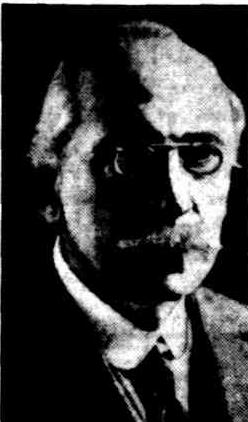 TAKE a simple thing like surfing. You would think it would be easy enough to find out beyond all possible, probable shadow of doubt just what did happen at Manly some 50 years ago when Mr. W. H. Gocher won us the right to bathe in the sea by daylight without getting into trouble with the law. Well, it isn't.
TAKE a simple thing like surfing. You would think it would be easy enough to find out beyond all possible, probable shadow of doubt just what did happen at Manly some 50 years ago when Mr. W. H. Gocher won us the right to bathe in the sea by daylight without getting into trouble with the law. Well, it isn't.
Last week "The Sunday Herald" told the story of ex-Constable Peter John Eppel who remembered-he said-exactly what befell Mr. Gocher because he was one of the policemen who arrested him three times for bathing in the surf at Manly.
Right: MR. GOCHER
That story really started something. The ink was hardly dry on it before telephones began ringing in our office. Then letters arrived. Everybody wanted to tell us how wrong Mr. Eppel was.
There was a 'phone call from Mr. J. S. Jones, of Lane Cove, Sydney. He said he was one of the police constables on duty on Manly Beach when Mr. Gocher sought a showdown with the law over its ban on daylight surfing.
Declared Mr. Jones: "Mr. Eppel is off the mark. I'd like to get the record straight." So we went out to see Mr. Jones.
Mr. G. Beesley, of Manly, wrote to say Mr. Eppel's story was interesting but differed materially from an account by Mr. Gocher himself in a newspaper of 1910, and that Mr. L. C. Wellings, Town Clerk of Manly, had a copy of that personal version. So we went out to see Mr. Wellings.
Mrs. Ray Mahoney, of Brighton-le-sands, told friends that as Mr. Gocher's eldest daughter she ought to know the authentic story of his exploit-and it was certainly different from Mr. Eppel's. So we telephoned Mrs. Mahoney.
And did ex-Inspector Jones and Mrs. Mahoney and Mr. Gocher all agree in their recollections? Not a bit of it!
LET us start with Mr. Gocher. He died in 1921, aged 65, but 11 years before that he sat down and wrote a delightful description of what took place on Manly's ocean beach the day he rebelled against the law.
It was in November, 1902, he said. (Mr. Eppel said it was before 1892.) And it all started-according to Mr. Gocher-when he felt it his duty to take the part of some yachting lads who had been hauled off to the lock-up after a "joyous plunge into the cool Pacific."
He had questioned the police about this arrest and learned that bathing in the open ocean was forbidden after 7 a.m. He wrote:
"My ire was aroused at the absurdity and injustice, so I rose up on my hind legs and informed the police that they would have to arrest me on the following Sunday as well, for I meant to test the matter."
Mr. Jones chimes in. "Seven o'clock?" he says.
"The Police Offences Act, No. 5 of 1901, Section 77, laid down that no one must bathe in waters where they would be ex-posed to view after 6 a.m., not seven."
Let Mr. Gocher continue:
"At that time I was proprietor and editor of the 'Manly and North Sydney News,' so my next issue blazoned forth my intentions, to the effect that we would bound in for a bathe at noon on the morrow and the police would therefore be expected to do their duty and likewise arrest us.
"Three of us, I might explain, had made up our minds to test the Act, they being Arthur Edwards, Percy Oldman and myself."
Hear Mr. Jones. "A deputation of bathers from Manly had been to see the Chief Secretary before this, and the police were told to leave them in until 8 o'clock. It was against the law, but those were our instructions. They went on bathing un-til 8 o'clock for a few months. But it's right about the yachting lads; we had a lot of trouble, chasing them out."
Now Mr. Gocher again: "The proprietor of the Steyne Hotel, Mr. Rosenthall (who was better known in those days as Old Rosie) entered fairly into the spirit of the joke and granted us a room to change our costumes."
Mr. Jones: "He came out of Rosenthall's private house on South Steyne, not out of the hotel."
Mr. Gocher: "The time arrived, but only two of us materialised, and, to make matters worse, my old friend Percy Oldman had forgotten his costume. Nevertheless, he stood most loyally by me and even ventured to go right with me on to the sands to hold my mackintosh whilst I cut
loose amidst the hissing breakers."
Mr. Jones: "Mr. Gocher went in wearing a three quarter-length frock coat, striped trousers and a hard hat, and he had an umbrella under his left arm. I can see it all quite clear-ly."
Mr. Gocher: "It was the most enjoyable bathe of my lifetime. But nothing ex-citing happened. Very few people were about . . . No posse of police came flying down with drawn batons to the water's edge to yell out to me to come forth and be arrested."
Mr. Jones: "There were three of us there-Senior Constable A. J. Taylor, Constable John Kiley and myself. We had reported Mr. Gocher's intention to headquarters and we had been advised to take no notice."
Mr. Gocher: "There was no mighty concourse of citizens to cheer me as I came shooting in on No. 4 break-er, breathing salt spray and defiance. Outside my few bosom pals present on the sands the passing pedestrians took but a tired sort of interest in my plunge for public liberty and the popu-larising of the great old sport on all beaches."
Mr. Jones: "He waded in up to his armpits, made two strokes, and then came out and walked up to us expecting to be arrested. There were 200 or 300 people watching. They opened up to make way for him. We took no notice."
Mr. Gocher: "The next issue of my paper was flavoured with cayenne pepper for the police for not doing their duty. I announced my intention of going in for a bathe at precisely the same time and at the same place . . . Certainly more people rolled up to watch events still, no police."
Mr. Jones: "We had been told to take no notice, so we just let him carry on."
Mr. Gocher: "On the occasion of my third dip matters commenced to be merrier. The law swooped on me and I was trotted along to the limbo. Frank Donovan bailed me out..."
Mr. Jones: "He was never arrested."
And there, so far as Mr. Jones is concerned, the matter ends. He was a young constable at the time. He retired just before the war with the rank of inspector.
Mr. Gocher, after his reported arrest, went off to interview the Inspector General of Police who-he explained-received him very kindly and with an expression of merriment. He wrote:
"He stated that no magistrate would convict me; but that men would have to wear neck to knee costumes and that the ladies would have to take care not to expose their bosoms."
AND what does Mrs. Mahoney say about all this?
She says: "Mr. Eppel and Mr. Jones are both wrong. It was in 1902, and dad was in his neck to knee swimming costume. No man would go in for a swim with a hard hat on and a frock coat and with an umbrella.
"And he certainly was arrested, although he was never fined. I can vow to that."
Mr. Beesley said in his letter to "The Sunday Herald":
"In November next year it will be 50 years since Mr. Gocher, by his courageous action, brought to an end this old, unnatural law against daylight bathing.”
But, he didn't, Mr. Beesley. He didn't. The Police Offences Act No. 5 of 1901 is still in force, and so is Section 77. So, technically, everyone in New South Wales who goes surfing to-day between 6 in the morning and 8 at night is liable to be fined £1, although the police think it better to overlook it.
See how easy it is to go wrong on these things? Which brings us back to 1066 and all that . . .
Everyone is still breaking the law! Here is a photostat of a section of the Police Offences Act, No. 5, 1901-still in the Statue Books.
The Helping Hand — Professor Brereton and Australian Literature
Bv 'X.Y.Z'
THE UNIVERSITY has sometimes been regarded as shut up within itself, and its professors as isolated from the non-academic world. People are beginning to realise that this is not the case, but no one could ever even have supposed it of Professor Brereton. His long, looseknit figure, hatless and lightly thatched with greyish-silver, that may be seen loping up, leisurely but with large strides, from the back-blocks of Middle Harbour early every morning; his long, sun-browned face and kindly, humorous eyes — all these are friendly and familiar to hundreds of men and women scattered all over the country; men and women to whom the University is merely a vague place of books and scholarship where Jack Brereton earns his living. Indeed, to some oi these people the inner Brereton is known better than to most within the University itself.
FOR Professor Brereton is not by any means a professorial sort of person, as the term is usually understood, hardly even if you are foolish enough to push forward some absurd opinion about the Elizabethan stage, a subject upon which he is recognised by European scholars as perhaps the first authority. But we are not here concerned with his scholarship, which extends far beyond his specialty, throughout Elizabethan literature in the first place and into the literature of the stage generally, and then over almost the whole of English literature; for he is an extraordinarily widely read man, and appreciates and remembers what he reads, whether it be Milton or Marlows, or his old friend Walt Whitman. He is as far as possible from everything pedantic or merely scholarly, and as for aloofness from the outer, non-university world, or indeed from any man or woman or child or even any living thing, on the contrary he is the friend of all of them, especially if he can be of any help, whether to a hard-up or discouraged writer or to a hungry dog, or a fern that a boy is pulling up by the roots.
MATESHIP is Brereton's gospel, just as it was the gospel of his old friend Henry Lawson, with whom he walked many a mile and yarned many an hour, and often slept under the same blanket in the old days. That was when Brereton was an assistant librarian, buying books out of his own almost empty pocket and turning them over for the use of the students after he had read them; or earlier still, when he was writing up statistical reviews in the Government Statistician's Office or peddling tea for a living, for he has had a varied experience of life and its avocations. Lawson, Daley, Quinn, Dowell O'Reilly — they were all his cronies, and none of them was ever let feel for a moment, except in so far as it could help him, the weight of the wider thought and reading which set Brereton afterwards in a University chair. Long before this, however, Australian anthologists in search of new talent had begun to consult him as a matter of course; and more than one young writer, congratulating himself on the beginnings of a literary reputation on the strength of a request for the use of some of his verses, has discovered that it was Brereton's observant eye and kindly word that he had actually to thank. 'It was Brereton,' says George Robertson, 'who sent Henry Lawson to us in 1895, and who recommended Bertram Stevens as editor of an anthology, and I remember that he was helpful to us in many ways. We were tyros and needed it ! That he and many others must have benefited from their association with a man of his fine taste and wide reading is certain; and it is certain, too, that if he could have brought himself to write the sort of verse that people wanted and publishers pay for, he might have escaped much hardship in his early days.' No doubt; and there were other ways also in which he refused to exchange ideals for bread and butter and a position in the world.
BUT those ideals, and the kindheartedness and sympathy and fellowship that went along with them, are well remembered, and old friendships stand fast alongside the gratitude and affection of the younger men. Roderic Quinn, for instance, speaks of a recent meeting with Brereton alter a long interval of time. 'We talked,' he says, 'of old days, of friends gone west and of friends still living, of Victor Daley, Henry Lawson, and Bertram Stevens; of Edwin Brady, Frederic Bloomfield, and many others. It was altogether of that bright circle that he spoke. With his usual modesty he said no word of himself, but there came to my mind nevertheless a memory of the regard in which he was held by all of them, not only for his personality, but for his influence. Most of all, as I sat beside him at that gathering, I recalled that I was sitting close to one whom Henry Lawson loved as a man and heeded as a critic to the very end.'
Brereton was indeed Lawson's best friend. Lawson dedicated 'The Star of Australasia' to him; it was to him that Lawson wrote 'Written Afterwards' (in 'Winnowed Verses'), and, says Miss Bertha Lawson, 'he was thinking of the Professor and one or two others when he wrote his dedication: —
''Old male, in the gusty old weather,
When our hopes and our troubles were few,
In the years spent in wearing out leather
I found you unselfish and, true.
I have gathered, these verses together
For the sake of our friendship and, you.'
Miss Lawson adds: 'Professor Brereton was father's dearest and closest friend in the days when he was young and practically unknown and struggling hard for recognition, and he often used to tell mother how the professor had stood to him and helped him in every way, and how much his friendship had meant to him. They shared hopes and fears and confidences and also their scanty stock of money and goods. Father used to dictate many of his poems and sketches to the professor, and used to discuss them with him as he wrote them down. And the professor helped him by reading the proofs of his first books, published by Angus and Robertson, and assisting him to see them through the press. I don't think they ever carried swags together, but they were true mates nevertheless.
THE point to be remembered is that these writers did not, and do not, regard Brereton as merely some learned critic and fellow-practitioner willing to stretch out a kindly hand at need. Not at all ; he is one of them. 'Altogether apart from his high reputation as an Elizabethan scholar,' says McKee Wright, 'he holds our respect as one of ourselves — an Australian poet and man of letters, who can appreciate both the discouragements and the achievements of his fellow-workers. His ready praise has been an inspiration to many, and his wide knowledge has always been at their service. When he was appointed to the Chair of English at the University I felt that it was a good day for the small band of struggling writers who aim at something more than filling the columns of the newspapers. A man to whom Marlowe and Shakespeare are dear and familiar companions and who could be hailed by Henry Lawson as comrade has all the qualities necessary for a literary leader.'
OF course, these old friends and admirers are not all from New South Wales. Louis Esson, for instance, tells how his few meetings with Professor Brereton are among his most cherished memories of Sydney. 'I greatly admire him,' he says, 'as a writer and as a personality. Surely anyone who has met him must have been stimulated in his love of literature.' And after referring to his taste as well as the range and precision of his knowledge, 'which is used not as an end in itself, but as a means to the deeper appreciation of literature,' Mr. Esson goes on to say, 'I owe it, to Professor Brereton that I love some of my old playwrights better because I know something of their period. ... I am sure it was owing to his subconscious influence that. I once haunted the London bookshops for Elizabethan texts, looked up a few references in the British Museum, and joined the Phoenix Society, whose performances of the Duchess of Malfl, Yolpone, and other masterpieces remain among my most vivid memories of London.'
A NEW SOUTH WALES writer who has been helped by Brereton in a somewhat, similar way is Zora Gross. 'Without his help,' she says, 'I should hardly have been able to undertake much private study necessary for my work, and I know that my case is not singular. Professor Brereton is the Australian writer's Irue friend, and I have never found him too busy to give me the word of advice or direction I needed.' Another woman writer, Dora Wilcox, speaks to .the same effect. 'There is probably,' she says, 'not a . maker of verse in Australia who has not been helped, directly or indirectly, by Professor Brereton. Univer? sity teaching penetrates right down into the elementary schools, and also by his own poetry, his spoken and written criticisms, and his encouragement of good work he has raised the standard of taste, and therefore of achievement..' Of that small but select coterie, 'The Casuals,' whose membership included men of such diverse interests as Julian Ashton, Lionel Lindsay, Norman Gough, Dowell O'Reilly, Howard Ashton, Jose, Ormsby, Nicholas, Bertram Stevens, Arthur Adams, J. J. Quinn, and Chris. Brennan, men united only by a spirit of fellowship and a feeling for art or literature, Brereton was one of the leaders in his quiet way. But first as University Librarian and later as Professor of English Literature he had a wider opportunity to be of use to people who wished to learn Raymond McGrath, the young graduate in Architecture whose work in art and literature as well as in his own particular line is so promising, came as a student within Professor Brereton's influence. Mr. McGrath is now in Europe on a travelling scholarship, but his sister writes gratefully of the 'kindly guidance and judgments in literary matters' which 'have done much towards my brother's success and enthusiasm.' Miss McGrath, who is herself a friend of Professor Brereton's, adds: 'One can't help but admire his sincerity and fine sense of humour.' Another of our younger writers .who has greatly benefited by Professor Brereton's influence' is R. D. Fitzgerald, whose poetry is now beginning to be ?
known. What has struck him most about Professor Brereton is the patient, and unassuming way in which be is prepared to help anyone, even when, as is usually the case, he is overladen with other work. 'No man can give help so simply,' says Mr. Fitzgerald. 'One is scarcely aware that it is being given, for Professor Brereton has no desire t.o burden anyone with a load of obligation. Nor does he attempt to force advice on anyone. His encouragement is practical and effective, as I know from personal experience, and gratefully acknowledge.' AS a literary beginner anxious to obtain a preface, signed with a well-known name, for a new booklet of verse? He often writes to Professor Brereton, and a kindly word, written perhaps in lime which could ill be spared, helps the little booklet along. In at least one case Professor Brereton has gone so far as actually to patch up and partly rewrite a story for its inexperienced author. Sometimes he discovers new talent, as in the case of Miss Winifred Shaw, who speaks of her grateful memories of his 'kindly encouragement.' Kindly encouragement: those are the words which best describe Brereton's attitude to all who deserve it. Indeed, to quote Professor Allen of Duntroon, who has known him for many years, 'a man of wide experience, creative power, and exquisite taste, he does as much in. this way to fashion a newer Australian literature as he does by voice and pen.'
For some months in 1902 famous writer and poet, Henry Lawson and his wife Bertha, rented the dwellings Marlow and then Ladywood, both in Whistler Street. They were married in 1896 and had two young children. Henry Lawson wrote several poems about Manly, including The Cliffs, The Stranded Ship – about the Vincennes, a barque that went aground at North Steyne. His frequent drinking bouts with bohemian friends and his inability to support his family led her to seek a legal separation in 1903.
One of these was the Dawn and Dusk Club which clustered about that lover of smooth verse and beautiful images, Victor Daley. I'm not sure that it was bound by any severe regulations, or that its meetings were more notable for intellectual communion than for conviviality; but it was satirically stated that it derived its name from its practice of meeting at dusk and parting at dawn. Had I been a member, no doubt I should be able now to rebut the slander. Roderic Quinn was one of the happy band, and with him were Billy Melville, Bertram Stevens, who was always defying his philistine instincts by giving his hat a Bohemian tilt, and Fred Broomfield, who swaggered and boomed with melodramatic fervour, talked with vociferant eloquence, and swept up the ends of his moustache with the air of a Bobadil. The late George Taylor was another haunter of Dawn and Dusk, and, indeed, was the chronicler of the Club. His little book, Those were the Days, will interest you all.
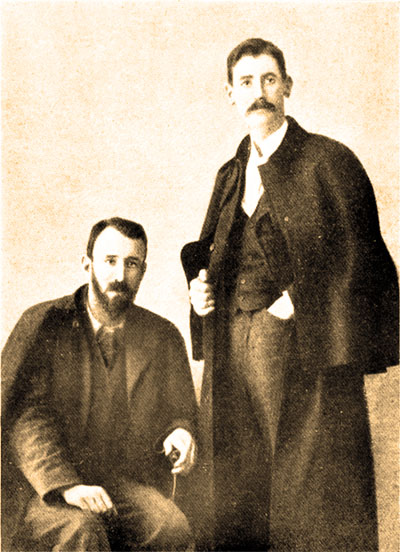
J Le Gay Brereton and Henry Lawson in 1897
Henry Lawson
Was it a taste for the gruesome that caused a Grammar School boy, so many long years ago, to cut from the Bulletin a poem that presented a haunting vision of a dead but unresting figure?—
Heaven! Shall his ghastly, sodden
Corpse float round for days and days?
Shall it dash 'neath cliffs untrodden?
Rocks where nought but sea-drift strays?
God in Heaven! Hide the floating,
Falling, rising face from me.
These, at any rate, were the first of Lawson's words to impress my imagination, and from that day I saved from the papers what I found of his work, and waited for a meeting which I felt to be inevitable. Several years passed. I came to the University and was swept by the general current to a degree. Early in 1894, Miss M. J. Cameron, a school-teacher from Old Junee, who was saving the money required of intending settlers for the Communist colony in Paraguay, asked me to have tea with her and Mrs Lane at Enmore. Lawson, who had recently returned from his wanderings along the Darling, was to be present. They had begun the meal before I arrived, for I had some difficulty in finding the house, and, as I stepped into the room, I saw facing me, with head bent forward and eyes dark and deep and eloquent looking up at me, a lank, shy, bearded young man. He rose rather awkwardly, mumbled a brief greeting and sat once more, watchful and silent. By an incautious movement of his arm, he clumsily upset his tea, and was filled with mute confusion. The talking was maintained chiefly by the two women. I was thinking of Lawson, and he spoke only with his appealing eyes. But at last we two emerged into the night together, and his tongue was loosed. We drank each other's health at the nearest bar, and walked down to the Quay, happy in a new comradeship. He was full of his experiences in the bush, where his deafness, sensitiveness, diffidence and a melancholy tendency to dwell upon the pains of life had exposed him to misunderstanding and misery.
As we turned the corner of George Street, near the Quay, he stopped and stared at me with all the grey wisdom of youthful disillusion. I was talking of democracy and the future that the workers were about to win for us all.
"Now listen," he said. "I know what I'm talking about. I couldn't say it in public because my living depends partly on what I'm writing for the Worker; but you can take it from me, Jack, the Australian worker is a brute and nothing else."
Such was the bitterness in his heart, after association with the careless, rough company of the shearing-sheds. It was a mood, but one that was characteristic of his shrinking self-consciousness. His condemnation was harsh and unjust, but it was honest and heartfelt. Read his sketch of "A Rough Shed," which is true in every detail, but shows only one side of the truth—and you will understand. He was to make full amends in many a tale and poem commemorating the courage, generosity and self-sacrifice of the Australian worker.
Victor Daley, whose ideas became so naturally incarnate in lovely imagery that he seemed to be able to write poetry on demand, was the centre of a group of which I was not a member. With him I was never intimate until he was dying at Killara, though I saw him occasionally in happier days. I think the first occasion was when he was beating up a party for a merrymaking on a visiting yacht; when Bertram Stevens mentioned my name, he tried to include me among the revellers. I pleaded a strict engagement. "Break it," he commanded. I told him I had no desire to break it. "With whom is it," he asked, "a man or a woman?" "A woman, of course." "Then you can be no true Bohemian," he cried theatrically, "for no woman on earth is worthy of such a sacrifice as this." I recalled his words, at a later meeting, on hearing him say, with melancholy intonation, "I must give up Bohemianism; it makes too many demands on a fellow." That is the danger, no doubt, when Bohemia becomes an -ism and its traditions are fossilized to Draconic law. The Bohemianist is atrociously conventional, and, for the sake of strict conformity, he may even find inebriety forced upon him by his conscience and may regard frowsiness as a virtue. Daley was fastidious, and he shrank from any such rigid code of morals.
He was lodging in North Sydney with an extremely tolerant aunt, whose temper was not in the least roughened, even when we once broke our way into her house in the small hours, and ate what was intended for the family breakfast. She merely supposed I must be another poet.
For several years we were closely associated, wandering together into strange nooks and corners and enjoying our Bohemian adventures cheerfully and irresponsibly. We shared a common purse; I mean that, when we were together, the one who happened to have money spent it, and the other accepted the arrangement as a matter of course. A gift was not a gift between us, but a natural sharing of the bounty of Providence. Sometimes when our supplies were on the ebb, we would save our last florin for a final flourish. There was a broad, cool, low-ceiled bar, where the best free-lunch in Sydney was to be had, and adjoining it was a sheltered winter-garden. Behold us at a marble table with foaming tankards of ale at sixpence each. We made significant signs to a waiter, whom we had tipped liberally when we could afford it, and he brought us gratis a meal of choice dainties, as much as we could eat. Magnificently replete, we lolled indolently in the winter-garden, smoking sixpenny cigars, and then lounged into the street, penniless and content. But ordinarily, three-penny beer and scraps of bread with little squares of cheese sufficed. Even so, we were sometimes surprised by the sudden simultaneous assaults of penury and hunger. I remember one night when three of us sat on the kerbstone in Dailey Street, and happily shared a dry tea-cake—the largest meal we could get for fourpence. Each of us had tried in turn to charm a pretty shop-girl into adding a small pat of butter, not for cash but for love, but the eye of the proprietor was on her, and she rejected our prayers with a reluctance that was almost tearful.
It was after a similar accident that Henry and I found ourselves astray, very late, with insufficient money for a bed. The Domain had a broad and hospitable breast, but already a fine rain was visible at every lamp-post. Besides, in the Domain one was liable to lose one's boots. Henry said he knew of a Dago lodging-house, in the vicinity, where the price of a doss was not too high, but he doubted if it was very savoury, and he feared that the temper of the Dagoes, stirred out of their sleep, might result in violence. Still, we required a roof, and we dared damnation. The dingy door opened after repeated knockings from without and an incoherent growl from a window. A dirty-looking pirate with a lighted candle-end clawed us hastily into a dark, narrow passage, shut the door and asked our business. He spoke a kind of English, but his expression was foreign and unfriendly. He said he had no room. We indicated the floor of the bare passage. He expostulated. We stood our ground. "No room!" he said with a snarling emphasis, and, beckoning, he led us up a rickety staircase, of which the hand-rail, broken away at its lower end, swung over empty gloom when I inadvertently put a little pressure on it. He opened a door and threw a dim light upon rows of men sleeping on the floor. Some had blankets, some lay merely in their clothes. A fair number had ancient mattresses, but those who were on the boards were probably subject to less disturbance. Here and there, shoulders heaved impatiently and legs straightened or drew up as the candle rays fell on the forlorn crew. A rank odour pushed at us. I entered the room, stepping gingerly over the slumbering figures, but in the dark I made a false step. I trod on a man—not on any thick or squashy part of his fat body, but on some unimportant outlying portion. I don't know what language he talked, and as the sympathy of the crowd seemed to be distinctly with him, we waited for no interpretation. "I tell you so!" exploded the landlord, shaking his greasy black curls at us as he drove us into outer darkness.
One day I helped Henry in his moving from a cheap lodging-house near the Cathedral, to McGrath's Hotel. His worldly goods were in a large sack, and I was rather surprised at its weight. We took turns in carrying the load on our backs. Everything in that bag was in admired confusion—togs, scraps of copy, photographs, and a general miscellany. He promised to show me a particular photograph, and dived into the mass. His head and shoulders were out of sight but the movements of the sack indicated that he was rummaging actively, and, somehow or other, he found at last what he was seeking as well as some manuscript which he had given up as irretrievably lost. He emerged, red, ruffled and triumphant.
It was at McGrath's that I obtained an insight into his mode of composition. He asked me if I minded acting as his amanuensis, for he always hated the labour of pen-driving; and we went to the parlour with a few sheets of paper. He walked up and down, sorting in his head a heap of couplets almost as disorderly as his luggage in the sack. For weeks he had been composing what was to be a poem. As he selected and recited the verses, I scribbled them down. Sometimes, after reflection, he altered a phrase. Sometimes he changed his mind as to the most effective order of the couplets. "Stop a bit, Jack," he would say, "I think we'll stick that verse in, a bit lower down." It was an eloquent, swinging poem, partly heroic in tone and partly ironical and humorous, and it was probably the longest piece he had ever put together. He afterwards submitted it to Mr. George Robertson of Angus and Robertson's, who thought that it would be better if the comic element were omitted. Nothing easier. So adaptable was Lawson's gunyah style of poetic architecture that he published the work as two separate poems. "The Star of Australasia" and "After the War" are the titles adopted in the final version.
A number of Lawson's friends used to meet us occasionally at McGrath's. There I first met the fair, observant, smiling Roderic Quinn, who stretched his long legs and beamed benevolently over his pint. "Peter Anderson" rushed in in the intervals of rent-collecting. Frequently the broad, jolly face of "Dan the Wreck" appeared. No seediness of costume or cloudiness of linen could quell his geniality. He had been to the Grammar School and retained a few shreds of Latin, so he bore the reputation of a scholar with bluff dignity—or dignified bluff. "Arma virumque cano," he assured me at our first meeting; and I agreed that it was an excellent procedure.
One afternoon, in the dim parlour at McGrath's, Lawson introduced me to his friend Roderic Quinn, who sat and ruminated and said little, though the glint of his beaming eyes showed how humorously observant he was; and I dare say there was a good deal in both of us to amuse him. Rod and I have never seen much of each other, but enough for mutual good-will. His best poetry, I suspect, is better than he knows. Often his truest images seem to mean less to him than to an imaginative reader. Chris Brennan once objected to the last line but one in "The Hidden Tide," because the moon that shines therein is so much more than "the full moon of peace;" the words "of peace" set a false limit. Again, in "The Red-tressed Maiden," Quinn is so extraordinarily anxious to indicate that his ancient but ever-youthful girl is fire, that he seems to forget that fire is a primeval symbol of creative, vital and purifying love—the grace and wrath of God; but, because his imagery is beautifully true, one can dream over his comforting fire and divine meaning beyond meaning.
Then there was Jack Moses, teetotal traveller for wines, who was known all over the country for his recitations, his humour and good nature. I don't believe there was ever a better-hearted friend than Jack, or one who regarded Lawson with more affection and respect. He seemed to have made himself responsible for the poet's hats. I have seen him take Lawson's hard-hitter as we walked along George Street, gaze at its dim and indented crown with disapproval, and drive his fist and arm through it. That was his way of proving that he must provide a new one. Lawson told me that once, when the hat was just a little too good for such treatment, Jack made him swap it for the ragged headgear of a street beggar. He remembered, ten minutes later, that he had hidden half-a-sovereign in the lining. But the beggar had vanished. I met Jack at the Cathedral on the day of the funeral and we gripped hands, neither of us able to say a word of what was in our hearts.
On the wall of my room hung a pair of foils. I was a little dubious when Lawson proposed to try his skill with them, but he was so eager that I consented. I explained the difference between lungeing and prodding, and gave him a hasty lesson in thrust and parry. The ordinary methods were too fine for his vigorous temper. He made the blade swish and whistle as he swung it, and if I hadn't known something of single-sticks I should bear the marks of that combat still. To hold a weapon excited him. He felt gallant and exultantly martial. What a panic he created when he found a sword in a wine bodega and hunted the proprietor on pretence of a chivalrous regard for the poor man's wife!
All that was before Lawson married. Neither of us were married in fact. Later we saw less of each other; but we never forgot.
His wife had sympathy, patience, humour, energy and resource, and she needed them all. She did her best for Lawson, encouraging him in his moods of depression, and guarding him against himself and others. And, in those old days, he understood and was grateful. No one who saw them in their home could doubt the love that bound them. He spoke to me with deep gratitude of her staunchness and self-sacrifice. He congratulated me on my love of a dark girl. "The dark ones are the best, old man," he said. Mrs Lawson was dark.
A boy was born to them in New Zealand, a girl in Sydney. Then they went to London. I was at the boat, where Henry, bright and hopeful, stood with a child in his arms. He was fond of children, and nothing wrought upon his heart more swiftly and deeply than their light, tender love and pity. He tried to appear at his best in their company. They seemed to know so much. After the return to Sydney, a time came when Mrs Lawson boldly faced the future alone, fighting for her children. She steeled herself to work with incessant energy, to find opportunities to earn a living for her delicate boy and gentle girl. She had to part from them, having secured them a healthy home in the country, while she was battling on their behalf. At last she was able to keep them with her, and she brought them up nobly, and taught them to honour their father. And they know that no better mother lives in all the world.
HENRY LAWSON
To you the man we mourn may be
Australia's friendly voice renowned:
But more than this he is to me—
The mate with whom I knocked around.
Extracts from
Knocking Round
by J Le Gay Brereton
Published 1930
TO MY WIFE AND MY COBBER
Acknowledgment for matter reprinted in this book is hereby made to Art in Australia, The Australasian, Australia Beautiful, The Australian Magazine, The Booklover, The Commonwealth Annual, Hermes, The Lone Hand, and The Sydney Morning Herald.
Henry's brother "Bert' is recorded as being a very fine musician - Henry too, it seems, had more than one lyric to his bow:
Henry Lawson’s Fiddle
Reading in the press that Henry Lawson’s fiddle was in a Sydney curio shop, Mr. Keith Kennedy, ethnologist and musician, well-known on the North Coast, went along and bought it, and then promptly wrote several selections appropriate to such an instrument. One of these,' "The Mosquito," prompted by an experience in a bush cave at night, is greatly diverting in its suggestions of the drone of persistent "skeeters.'' Incidentally, Mr. Kennedy used the Lawson fiddle at a Museum smoke social to accompany a Scottish song sung by a prominent scientist and an Australian aborigine. HENRY LAWSON'S FIDDLE (
1931, January 5).
Northern Star (Lismore, NSW : 1876 - 1954), p. 2. Retrieved from
http://nla.gov.au/nla.news-article94115387
HENRY LAWSON – SOME REMINISCENCES
—By "Crosscut"—
Henry Lawson is dead—good luck to his soul wherever it may be—and it will doubtlessly be thought by many that any tribute to his memory at this belated hour will serve no purpose that has not already been accomplished by other less dilatory pens. The few notices that have so far met my eye, however, living as I do in the bush, seemed to me but the usual stereotyped allusions to the passing of a noted writer; the cut and dried journalese of the obituary recorder who allots so many lines to his task, and void of any sign of the personal touch which reveals to the people not only the poet and the story-teller, but the man.
Perhaps that is just about what Lawson would have it to be. Fame as a writer meant little to him and Society was a thing upon which he ever looked with a repellant eye; he was a poor "boomster" for his trade, and never appreciated the value of a fashionable drawing-room as an influence upon the sale of his work. He preferred—and rightly so—to stand upon its merit—and, if that had failed him, would probably have gone on painting houses and fences quite un-disturbed by any lesser consideration. Because he was a friend of mine more than a quarter of a century ago— and that was when he was at his best — I am recalling the few reminiscences herein set down.
I forgot how long ago it was since I first met him, but I know it was just about the time that the public were beginning to look for his verses in the "Bulletin," and the place was Mount Victoria, upon the Blue Mountains of New South Wales. Appropriately enough, too, it was in a pub! I was a casual "paying guest," and he was painting, or rather white-washing the ceiling of one of the bar-parlors, and I asked him to have a drink. To be exact, I merely, said "good-day" to him, and with the fatuousness of an idle man wishing to start a conversation, asked him if he "was doing a bit of painting?" Lawson was deaf to a certain degree, even in those early days, and he replied from the scaffolding upon which he was standing that he didn't mind if he did. And so the first few words that we ever had together were over a glass of beer in that most picturesque of all the many beauty spots in the most beautiful portion of New South Wales.
During the few weeks that I remained there I met him daily; our stray acquaintance ripening into a mutual liking for each other, and it was the barman who told me his name, and its connection with the Sydney Bulletin—a piece of information that did not carry a deal of weight with me at the time, as, up to then, he was merely trying his 'prentice hand upon the alluring game of literature. But from that period we met frequently in different places, sometimes very far apart, and it had not taken me long to recognise the genius and the lovable qualities of the man; his earnestness and the purpose—too often, alas rendered null and void for reasons far beyond his control—and the careless freedom of spirit which made him the boon companion of other good but reckless souls with whom it was his delight to foregather.
It is difficult to write of Lawson without dwelling for an instant, albeit with a kindly pen, upon the failing which he shared in common with so many who have trodden the inky way with distinction. He himself would be the last to cavil at the reference, for did he not, when recording his feeling at the last resting place of Victor J. Daley, a man for whom he had an intense admiration and affection, write:
"A Drunkard at a Drunkard's Grave, A Brilliant Drunkard Dead!"
His real name was Larsen, and his father, if I remember rightly, was a Dane. When the infant Henry was due for christening, his father insisted that he must bear at least one name suggestive of the stock from which he sprung, and "Hertzberg" (and Harry told us this with great enjoyment) was the middle name decided upon. But man proposes and the parson disposes. The officiating minister, being young and nervous, forgot the name at the critical moment and asked in a whisper to have it repeated. The proud parents complied, but it must have sounded different to the cleric, for he duly substituted "Archibald" for "Hertsberg," and the future poet went forth to the world with the all-British name of Henry Archibald Lawson!
It has been suggested, since his death that but for the patient sub-editing his prose received (at the capable hands of Archibald and Edmonds particularly) very little of his writings would have seen print but this, I think is but a belated sneer, which it would have better become the critic to have left unexpressed—or to have given it voice when the author was still alive! Boiled down to its final residue the truth is that he wrote what was in him to write, as a son of the people to the people without worrying to cast about for polished sentences and sounding periods. There is more philosophy jammed into "When Your Pants Begin To Go" than there is in a whole volume of David M'Kee Wright's harsh machine-made metallics, or in a ream of Morton's polysyllabic metaphysics. Lawson was read because the man in the bush, and the man in the street could understand him and whereof he wrote, and could discriminate between the quiet truths of the earnest writer, and the frothy verbiage of the average showy ink slinger.
"Harry," we used to call him in the good old days. Grave, and always with a hint of tragedy about him somehow, he was then good company, and fond of a practical joke. There was a place of refreshment much frequented by literary gents, would-be-actors (some really "had-beens," too, amongst them, and some who later on "arrived") in Wynyard Lane, known colloquially as "The Hole in the Wall," and there we often met. It was a cellar of a place with big arches and round, marble tables and chairs, and newspapers, and beer served up in big earthenware mugs. A bounteous country lunch, which always included a special potato salad and unlimited cheese was served from 11 a.m. to 1 p.m. and the place was very conveniently situated within a stone's throw of George-street, and yet sufficiently removed from the way of the madding crowd to be pleasantly quiet and private. I remember one day that Lawson proposed a trip to Manly Beach when we all happened to be silverish—bar one, and he was a down-at-heels actor who never had the price, but was always on the spot to take one. And he was the victim. He listened greedily to Harry's joyous programme of a dinner at the Clarendon, with billiards afterwards and a theatre to follow; and Lawson "shanghaied" him mercilessly upon the old "Brighton," and returned with his fellow-conspirators to the Hole in the Wall to put everyone wise to the joke. The victim was back within two hours, the whole six-feet-two of him bristling with wrath, but he could not stand up against the "roasting" he received at every hand and got pleasantly drunk with us—or at least as drunk as a gentleman of his professional standing could get—"just to show there was no animosity, don't yon know!" This just by the way as evidence that poor old Harry was not the eternal killjoy that some would have him.
When he was preparing his first serious collection of verses "In the Days When the World was Wide" for publication (he had previously published a book, but it was ill-printed and, the proofs having been read by himself, full of typographical and other errors) he discovered that "Banjo" Paterson was upon the eve of launching a volume of verse. Evidently it would not do for the two works to be issued simultaneously, and both authors recognised the fact. They met and talked the matter over. Banjo had what Lawson had not—he had money and large social influence, as well as merit, let it be said. But it was the poorer man who voluntarily stood down.
"Bring out your book," he and, "and I'll follow on later and catch you up!" And some few months later I asked him how the pursuit was going.
"Pretty good," he replied, "I'm within a hundred or two of him already, and the sales are going steadily."
There is truth in the saying that what is bred in the bone will come out in the flesh. Lawson had poetry—although sometimes it found inadequate expression—in his very finger tips. He may have been a successful painter and decorator, for that was his trade; he may have risen high in the scholastic profession—he was teacher in a Maori school-house in New Zealand, and, Lord, how I would have loved to have seen Henry, deaf as he was, amidst his little mob of niggers chanting "twity-one are two, twity-two are fo'!") or he might have risen to eminence in the Cosmos Colony in South America, to which place he paid a tentative visit when John Lane was blooming like Solomon in all his glory, but none of these things were for him. The call of the pen was too insistent for him to deny, and with all his faults the world is the better for his work.
How many of us can say as much? The last I saw of Lawson was in Perth in '96, and he was then back at the old game of painting. His brother Bert, by-the-bye, was about that time occupying chambers next to mine in the Fremantle Town Hall buildings, in which he had installed a piano, and was following up music as a profession and a means to an end. He was a handsome and romantic looking young fellow—as much like Harry as a split-pea is to a broad-bean — and was known as the composer of rather fine music and of fashionable waltzes in particular. Henry fought shy of society, which, as the "Bulletin" remarked, was "a damn bad thing for sas-siety, but a damn good thing for Henry!"
He lived for a while in a bell tent near the Causeway with certain boon companions, and the last particularly distinct memory I have of him was when one morning he invited me down to the office of the "West Australian" to assist him in spending certain money he was about to draw for some accepted contributions. They were not yet in print, but, as we were thirsty, that was a secondary consideration. He appeared in ten minutes with an even bigger blaze in his sombre eyes than was usually there, and I let him simmer down before I asked the reason of his agitation. I got it in a few words—the "West" had proposed to pay him ten shillings a column for his copy! He held a bundle of rumpled proof-slips in his hand—and I think that is one of the reasons that he took on the first job of house-painting that came along.
I am rather glad that I did not have the opportunity of knowing him during the later years of his life. And I am very glad indeed that I knew him at his best ! HENRY LAWSON (
1923, February 25).
Sunday Times (Perth, WA : 1902 - 1954), p. 1 (Second Section). Retrieved from
http://nla.gov.au/nla.news-article58044765
" THE BLUE MOUNTAINS."
'More wondrous than the walls that stand
By ocean's briny fountains,
How can I paint with untaught hand
Your tinted cliffs, Blue Mountains
Above the ashes straight and tall,
Through ferns with moisture dripping,
I climb beneath the sandstone wall;
My feet on mosses slipping.
Like ramparts round the valley's edge,
The great brown cliffs are standing,
With many a broken wall and ledge,
And many a rocky landing.
And round about their rugged feet
Deep ferny dells are hidden;
In shadow'd depths, whence dust and heat
Are banish'd and forbidden.
The stream that, crooning to itself,
Comes down a tireless rover,
Flows calmly to the rocky shelf,
And there leaps bravely over.
Now pouring down, now lost in spray
When mountain breezes sally,
The water strikes the rock midway,
And leaps into the valley.
It sings of hope as on it flows,
And surely never grumbles ;
For oft at afternoon it shows
A rainbow as it tumbles.
Now in the west the colors change ;
The blue with crimson blending;
Behind the far dividing range,
The sun is fast descending.
And mellow'd day comes o'er the place,
And softens ragged edges ;
And then the moon's great solemn face
Looks gravely o'er the ledges.
Sydney; December, 1888. HENRY LAWSON. New South Wales Holiday Resorts. (
1888, December 22).
Australian Town and Country Journal (Sydney, NSW : 1870 - 1907), p. 17. Retrieved from
http://nla.gov.au/nla.news-article71105759 LETTERS FROM BERTHA LAWSON TO HENRY LAWSON
Retrieved from and courtesy State Library of Victoria - available online
Beauchamp Terrace
[Whistler Street]
Manly. Friday
[Early August 1902?]Dearie,
I've got no paper, so I'm going to write on this.2 I wont come in tomorrow, it is such an expense it cost me 2/6 last night. I'll bring the children in early on Monday. And we will spend the day with you. I'm so glad you are getting on so well.3 We will be very happy yet. You must just let your own good nature over come the evil one. Six months4 wont be long skipping past. And I'll come and spend one day a week with you. You must make great resolutions for the future and you will keep them, I know. Above all get to work and work hard. By so doing, you will forget the past and you will also forget yourself in your work. And I want you to make the most of your chances. You know you are a long way ahead of all Australian writers But every week you let go by is so much lost. And it makes way for others, get ahead with your novel. It will be a big success and you must sell your work now, because your name is now before the public on account of C[?] of the Bush. You know dearie, in the past you have always let your opportunities slip past. Be like Kipling now, and make the most of it. We are always growing older never younger. And I never think a writer writes such good work after he is fifty years old. So now work hard and you'll be happy. Jim7 is not very well. He is troubled so with worms. I'm giving him a treatment for them. I think I'll take him to the Dr tonight. These bills have been worrying me greatly they keep asking me for them. So Dearie I'll be glad if you can fix them up. We have a good name here as far as debts are concerned. I've paid the rent and 7/6 for vegetables. And I really cant pay any more. There is a bill for bread for 9/- to Harper. I've paid the other bread bill myself. Good bye till Monday. With love from the youngsters and your wife.
BERTHA LAWSON.
‘Ladywood’
Whistler St.,
Manly
[14 December 1902?]
A ring at the door bell. My heart gave a leap, I thought at last there is some one for the rooms.
An old lady dressed in the fashion of twenty years ago, stood leaning on her umbrella.
I hear you have rooms to let.
Yes, will you come inside, my heart sank. She didn't look as if she could afford £1 week for rooms.
Thank you, well you have got them nicely arranged, may I sit down. I wondered if she were about to come to terms.
“Now my dear, when he comes home.” —
I thought I was about to entertain a lunatic.
“Now my dear, when he comes home, and you want to sober him up quickly, just you take his nose, like this (she squeezed her nose) hold his head back and pour down his throat, half a bottle of worchester sauce, use Lea & Perrins, because it is the hottest, then take the palm of your hand so, and pour about a tablespoon of black pepper on it, get his head down and shove his nose in it so, and he'll sneeze & he'll sneeze and he'll sneeze and he'll sneeze the drink from his brain. Next put his head under the tap, pour the cold water on him for about ten minutes, or until he'll sneeze violently. Then my dear make him lay down & sleep for a quarter of an hour, and he'll be sober enough to do business.
Now my dear. There is nothing like apples. I used to give my old man raw apples to eat for breakfast, stewed for dinner, and roasted for supper. You know he was a harmy man and they do drink. Now I was nearly forgetting the curry. Give him plenty of curry, and hot spices, there is nothing like hot things. As you know my dear, I had years of it. And in the end he killed himself with drink. You know my dear, I really do not want the rooms, but you are so young. I thought I would just drop him [in?] and give you a little motherly advice.
I thanked her, and told her I was very busy. And would have to go on with my work.
When she reached the garden gate, she turned, Now my dear I only want to say Doctor's aint no good, for a man who drinks, there is nothing like Lea & Perrins worchester sauce.
B. Law Alone
Dear Harry, I'll come on Wednesday, with the children to see you2 (if possible). Any way eat all you can, and you will soon be well. I gave mother a shilling for stamps for you, and she said she'd take paper & etc. to you to day. I'll bring what handkerchiefs Peter has left, which are not many. What do you think of the old women, could you work her up in some way. The above is just what happened. After she had gone, I laughed until I felt sick. The poor old soul did not think she would hurt my feelings, she only wanted to give me a little motherly advice. I enclose a statement of accounts, so as you will see how I stand and how I spent the money. You see I have to let the cottage or the rooms then I will also go out and work because the rent and the furniture amount to 17/6 a week before a scrap of food is bought. I have answered advertisements both for work and boarders, and apartments and hav'nt had a single reply. If all else should fail, I can still go out and work by the day. I answered an advertisement for an assistant in a draper shop, but they didn't want me. I've heard nothing from the Bulletin re my story, so they apparently wish to treat me with silent contempt. If all else should fail I'll ask Bland Holt to give me a chance on the stage. I'll not go on the street. And I'd rather do that, than accept money from the Illingworth crowd.
Love from the kiddies & your wife
Bertha.
[Attached to this letter is the following statement of accounts and two sketches by Bertha Lawson.]
expenditure of Ten pounds received by Monte De PietÆ
Mr. Blunden Two Guineas. Summons'es 8/10
Mr. Henderson. One Guinea.
Dr. Hall and chemist one guinea.
Rent one pound.
interest on furniture 7/6
Rent of room 8/-
woman minding children 12/-
Laundry 4/7
Fares 2/6
Cab to Hospital 1/-
Tram fares 1/-
lunch 6d
chicken & eggs for Harry 4/6
Stamps for Harry 1/6
Cash for – 2/6
Stationary for self 2/6
£8.1–11
House hold expenses.
Groceries. butcher. Baker. Milk 15/-
Cash in Hand 1.3.1
December. Sunday 14/12/ [1902]
He looks so tired. I wont speak. I'll get him his dinner & talk after. Dearie are you hungry?
No. I only want to be let alone. I'll be alright presently.
I wont tell her of the disappointment, what's the use, it will only make her miserable.
It is no use me trying to please him, I've thought all the morning of him. Now he comes home as sulky as a bear. I shant speak to him again until he speakes to me. I wonder if he thinks of all the ways I try to help. He knows I hate housework and yet to save him expense I wont keep help. He thinks I dont understand him. I wonder if he thinks how often I watch his face, when I know he is thinking, and I'm just dying to tell him something, still I keep silent. Does he ever notice how his room is arranged, all the little attentions, that a women who loves her Husband, thinks of. I dont believe he cares for me a bit. He loved me because I was not like other girls. Now he is tired of me. I jarr on him. He thinks I think all day long of the home & children. He does not believe me capable of deep thought or ambition. What is the use of me telling him, he would laugh & that would kill me. I wish he understood me. I wonder why he ceased to care for me. It isn't possible for him to love me or he would not neglect me so, he treats me like a child, he'll amuse or interest me, when he is in the humor, and then its run away & play now, I'm tired. Does he ever think I'm a woman, with all a woman's feelings. — —
— No he still thinks of me as the child he married. He does not think my nature has matured with years — — — and that my love is more intense.
What's the use of coming home. I might have had a jolly day with the boys, and yet I thought of her, watching & waiting for me. Bah. I dont believe she thinks or cares, she did once, that's past. I suppose all woman are the same. The novelty of matrimony wears off after a time. I'll just go out for a walk. What's the use of me going to her, she'll only say something nasty, and if I go and kiss her, she'll think I'm a fool. I'll go for a smoke.
To Harry with love from Bertha.
I'm not going to let him think I feel it. Let him go. This is what I get for fussing about him. He never asked me if I'd like to go for a walk. I wonder if he thinks how I long for the old days when we were first married. How my heart used to pump when I heard him coming. How I'd watch that window to catch the first glimpse of him coming up the street. Men dont think of that. We seemed to have sunk into a real matrimonial groove. Oh I wonder how I could win him back again. When he comes home, I'll just try.
Dearie I found the pipe you had lost. It's on the dressing table, shall I get it.
Oh if you like.
Tell me, whom did you see, when you were out this afternoon. Any one I know?
Yes I saw Burdkins.
Why didnt you bring him Home to tea.
What's the use, I didnt want him to know our domestic unhappiness.
Look here Jack. Do you want a quarrel.
Have it your own way. I dont care.
Your a beast and I hate you. Now you can go out again if you like and stop out.
He goes. Well, I cry and fret and worry for an hour, then I think I shant let him see he can hurt me. I'll just treat him as if I didn't care.
Jack do you really love me?
Yes
And you wont go on like that any more.
I didn't go on it was you.
Oh Jack, this is hopeless. You know.
Never mind little woman, kiss me. We'll make it up. Dont let us try to find out who's fault it is, or we will quarrel again.
This is nothing to the one I wrote for the Bulletin]. This is just written to you.
Bertha.
Ladywood
Whistler Str.
Manly.
Wednesday.
[late December 1902/early January 1903?]Dearie,
I will have to come into Town on Saturday morning. I'd forgotten I had to pay the Mont De PietÆ people, so I'll call at the hospital to see you. I hope you are feeling better and brighter. Do you sleep better, if not you should ask the Dr. for something. Nurse will tell me when to bring your clothes — you see there is no room in your locker for them and they may go astray. I'll bring them as soon as they are needed. They will send you away for a while either to the Coast or a convalescent home. You go dearie — we have not got the means for another holiday and we are so heavily in debt. You be persuaded by me, you will get plenty of good nourishment and plenty of material for a new book, at the Coast Hospital. It is a beautiful place so different to the Sydney. The nurses and Drs. are so kind there. Bertha has never finished talking of her daddy. She has told every one her daddy has his legge in a cradle.4 Love from the children and your wife.
Bertha.
“Ladywood”,
Whistler St.
Manly.
Wednesday
[February 1903?]My Dear Harry,
I am writing as promised. Why did you ask me to go to day. You can never know what an awful struggle I had with myself to come & see you. You know dear, if you would rather we were parted, I am willing. And it would be best to part now, we have made the break, and you did not seem a bit pleased to see me. Would you rather we separated?
I must know this. I have suffered. God alone knows. You never understood me and never will. Now through your family, I have to fight for my reputation. I have scarcely a friend, even Dr. Bennett turned from me, it is always the case. A man gets every one's sympathy. (I can live it all down) Dr. Bennett need not have said what he did. Of course when you are drunk, you are not responsible for what you say. But your cursed relatives go and verify your drunken statements. If you wish us to come together again it is on the understanding not a relative of yours darkens our door. I will never speak to Peter* or your Mother so long as I live. She can go where people can see her and shed her crocodile tears and make a blessed fuss, but she would not put her hand in her pocket and give your children a sixpence. I hate her. Now Harry I want to impress on your mind. I'll have no deceit. It must be all or nothing with me. I have forgiven you. And I never thought I could do it. You asked me to go to day (after all I had done). Never mind I'm glad you told me. It is better to say what we think. Still I feel now. when you care to see me you will send for me. I would not come unless, dont think I will come, if you do not wish to see me. Mind Harry, I am quite agreeable to the Separation. I came to you and you asked me to go. Now you must send for me. I felt it because I suffered so terribly, in forgiving.
Still all that is over. I have stopped all law proceedings,6 and I hope you will soon be well and strong again. You have plenty of sympathizers, plenty who will shield you, behind the slanders of your wife. I think I have the courage to live it all down. If I wanted to love another man, or go wrong, it was not for lack of opportunity. You know my ideas of life, and you also know you are the only man I ever cared for. It is cruel the report should be round I forced you in to a marriage. Any way. My own heart & conscience is the only comfort I have.
Love from the children & your wife
Bertha.
* Peter is Henry's brother
“Ladywood”
Whistler Street
Manly
Monday.
[March/early April 1903?]Darling
just a line, Dr. Hall has just called in to ask after you, he told me to tell you he'll be up to see you the first day he can get away. Harry he is your truest and staunchest friend, dont you let your delusions carry you away in this matter, believe me in this matter. I'm a woman and I know men, think of all he did for you. And he has shielded you, all though Manly. And he will take a great interest in you still. You be your true self to him, tell him you never meant what you said when you were drunk — you know you were so cruel to him that morning, when he came to get you into Prince Alfred Hospital. Tell him also I'm not the black woman I'm painted. I would feel it if he believed me bad because he is one of the few men I have any respect for. I respect about five men in the world, and I hope they also respect me. I love one — does he love me.
I will bring the children to see you on Wednesday. Dearie I owe Dr. Hall my reason and my life. If it had not been for him, I should certainly have gone mad, and I'd have taken my own life to. So that is why I want you to be nice to him and thank him for all he has done.
Why dont you write to me I'm so lonely. I get very miserable at times. Do you think of me. Ah, dearie, do let us forget the past. And we'll try and make the future bright for each other, hurry up and get well. And we will commence a new life here by the sea. We wont have any relatives, and only those who have proved themselves friends. Do you ever think of me I often do of you, and wonder if you are thinking of me — think and sum me all up from the first you have known of me. Now dont you think Ive tried hard to forgive you, haven't I done all in my power. Harry do you love me as much as I love you.
love from the children and your lonely wife
Bertha. Dont you be influenced by anything your Mother or brother says.
c/o Mr. Henderson
Solicitor
23/4/03 Harry,
If you do not send Mr. Henderson, some money for the children at once, I shall be forced to place them in the Benevolent Asylum. I have 1/6 left and have to pawn my ring to day. I dont care about myself, but I cannot see my children starve. I have had to place them with strangers, while I tried to earn a living. The people have sent me word, to come and take them away to-morrow because I could not pay them for their support this week. I think it is most dreadfully cruel for any Mother, to have to part with her children let alone be placed in the position that I am in.2
Your wife
Bertha Lawson.
397 1/2 Dowling Street.
Moore Park.
Monday
[15 June 1903]Harry
Your letter has just come.
Your papers are not here. I looked for them before. There are also a good many of my private letters and papers missing, and I thought they may be amongst your things. Re the children. I will not consent to let them go. Not through any paltry feelings of revenge, but as a matter of duty. You see, you left me, with these two little children. I was turned into the world, with 1/6 and not a shelter or food for them. I had to pawn my wedding ring to pay for a room. And then had to leave the little children shut up in the room, while I sought for work. And when I got work to do I had to leave them all day, rush home to give them their meals. And back to work again. And mind you, I was suffering torture all the time with toothache, and had to tramp the cold wet streets all day, knowing unless I earnt some money that day the children would go hungry to bed. (I was a fortnight working before Robertson gave Miss Scott3 that money.) I had no money to pay a dentist. (I wrote to you at P.A. Hospital telling you, you were forcing me to place the children in the Benevolent Asylum and you took no notice of the letter.) I went to the Dental Hospital and had a tooth extracted. They have broken part of the jaw bone. And I go into hospital on Wednesday and go under an operation to have the dead bone removed. The children will be well looked after. While I am away I have to pay a pound where they are going. So I trust you will endeavour to send Mr. Henderson some more again this week. You know my condition and I am certainly not fit at the present moment to struggle for a living.
As far as the case goes, the sooner it is over the better. You alone have forced this step. God alone knows how often I have forgiven you and how hard I struggled for you. And how have you treated me. Harry there is no power on the earth will ever reunite us. You are dead to me as far as affection goes. The suffering I have been through lately has killed any thought of feeling I may have had for you.
When you have proved yourself a better man and not a low drunkard you shall see your children as often as you like. Until then, I will not let you see them. They have nearly forgotten the home scenes when you were drinking — and I will not let them see you drinking again. I train them to have the same love for you as they have for me. And if baby's prayers are heard in heaven, you should surely be different, to what you have been. They will have to decide the right and wrong between us, when they are old enough to understand. I think you are very cruel to make the statements you do about me. You know Harry as well I do they are absolutely false. Why dont you be a man. And if you want to talk to people of your troubles, tell them drink is the sole cause. Do not shield yourself behind a woman. Mr. Henderson cannot influence me one way or another, nor any one else. You had your chance to sign a mutual separation and you would not do it. I dread the court case and publicity more than you do. Still I will not draw back again. And I only wish it was settled and over to day. I am so weary of struggling against pain and sorrow that I do not give a tinkers curse for anything — or anybody.
Bertha.
c/o Mr. Henderson
“Solicitor”
Corner, Hunter &
Castlereagh
St. City
25/7/’03 Harry,
I am forced to write to you. I do not think you realize my position. I will be laid up either the end of October or first week in November.1 I must pay two guineas into the Lodge by the 13th of next month, or I will not be able to receive medical attendance. There is the nurse to engage, and all my sewing to do, you know I have not any baby clothes. I want you to let me have ten pounds — it will take every penny of that to pay the expenses of my confinement. The nurse will be two guineas a week and I will have to pay a pound a week for some one to look after the children, and then there will be other expenses. I think considering what Dr. Brannand told you and after all your promises, it is most cruel that I should suffer all that agony again. If it were not for the sake of Jim and Bertha, I should not go through it. Another thing is I have to solely depend on you for an existance until after the baby is born. You have debarred me from earning a living for myself ever now. I cannot walk far or stand long, and it is not a very cheerful prospect to look forward to, knowing as you know well, I will very likely die. I cannot save anything out of the thirty shillings a week. I have seven shillings rent to pay. 10/- every week to pay off the dentist bill. That is seven pounds ten, I have already paid two pounds ten off it and I have twelve shillings left for food & clothing and other expenses for myself & two children — it does not look as “If I were one of the most extravagant woman” does it!
The children are well and happy. I do trust you will send me the money shortly. So as I can commence my sewing and I must pay the lodge money. You promised I should have every comfort. I am not asking you for that but for bare necessary's.
Your wife
Bertha Lawson
Sydney.
6/10/06 Dear Lawson,
Re the amount to be paid by you for the children. I wish you would consider the matter seriously. It is impossible for me to keep them at Boarding School unless you pay the amount. I only ask you to pay for their Board as I manage their clothes, education, etc. Angus & Robertson's term will be up next week, and I have to look to you for the weekly amount, and do not wish to have any more unpleasantness or court proceedings1 over the matter. So I trust that you will realize the position. I have struggled hard enough the last three years and have kept the children well. But I find I cannot do it, and cannot face the worry. I have enough Business worries without the incessant anxiety of providing the necessary amount for the children's weekly account.
Trusting you will consider this matter in a proper light.
I remain
yours etc.
B.L.
WHIRLWIND EVENTS
INVOKING LABOR CONFERENCE
DOINGS AT NIGHT AND MORNING
The story of the events of the night and morning is most dramatic. Yesterday afternoon Mrs. Henry Lawson, wife of the well-known author, accidentally met a woman friend of the Benzings. The forthcoming execution was discussed, and the friend spoke of the condemned man's extraordinary behavior after his return from the war. Mrs. Lawson, who is a keen opponent of capital punishment, became interested. She got all the particulars her informant had to give. She thought of the Labor Conference, and decided to appeal to it. When the conference assembled at 8 Mrs. Lawson was eagerly asking for someone to take up the question. She told her story to ready listeners, and at 8.15 the conference decided to send a deputation to the Chief Justice at once and place the case before him. A deputation was hurriedly formed, and it reached the home of Sir William Cullen (Lieutenant-Governor) at Mosman shortly after 9. After hearing what the deputation had to say the Lieutenant-Governor said the matter was out of his hands, and referred the deputation to Mr. Fuller, the Acting Premier.' It was now growing late. All the deputation knew was that Mr. Fuller lived somewhere in Mosman. They went down the dark streets knocking up people, seeking the Information they required. At last they were directed to the home of Mr. Fuller's brother. He was knocked up in turn, and after hearing what was wanted rang up his brother, who lived some distance away. When the deputation eventually reached the Acting-Premier's home it was 11 o'clock. The information obtained by Mrs. Lawson was placed before Mr. Fuller. Shortly after midnight several members of the deputation returned to the city with the determination to go to Rockdale and interview the Benzings to see if there was any more information that could be placed before Mr. Fuller. These members wore Mrs., Law-son und Messrs.: Cullinano and Brookfield, M.L.A. At the Quay Mr. T. D. Mutch, M.L.A., met them, and they made a rush to catch the last train to Rockdale, but missed it. A taxi cab was hastily procured, and when the distant suburb was reached the deputation did not' know where the Benzings lived. Between 1 and 2 in the morning they were again knocking up sleeping householders to gain Information. They found Mr. and Mrs. Benzing had retired, but they were aroused. Close questions resulted In tho statement that not only had Benzing been peculiar since Ills return from the war, but had been far from robust In his childhood. Finally signed statements were prepared and with these the deputation returned to the city at 4 a.m. , This morning at the request of Mr. Fuller they embodied the result of their Investigations In the report which will he considered by Cabinet. WHIRL OF EVENTS (1917, June 14). The Sun (Sydney, NSW : 1910 - 1954), p. 5. Retrieved from http://nla.gov.au/nla.news-article221964463
BENZING EXECUTED.
SYDNEY, Saturday.— Christian Benzing, the murderer of Dorothy Small, whose execution was postponed on Thursday, was hanged this morning. Expert evidence did not support the theory that he was an epileptic. [Benzing was a returned soldier, and was to have been hanged on Thursday morning at 9 o'clock. Fifteen minutes prior to that time the governor of the gaol received notice of the postponement, as the previous night represen-tations were made to the authorities by a deputation from the Political Labor League conference, to the effect that Benzing was suffering from epilepsy. Late that night the Cabinet met, and agreed to defer the execution in order that the statement could be either verified or refuted.] BENZING EXECUTED. (
1917, June 18).
The North Western Advocate and the Emu Bay Times (Tas. : 1899 - 1919), p. 3. Retrieved from
http://nla.gov.au/nla.news-article64767451
Mrs. Henry Lawson and Mr. Will Lawson
Staying at the Palace Hotel at present are two people with names well known in the literary world, especially Australian. Both of the same name, though of no relation to one another they are - Mrs. Henry Lawson, widow of Henry A. Lawson, one of the foremost, of Australia's, earlier writers and Mr. Will Lawson, also poet and author, writer of many books on Australian, and other subjects. The late Henry Lawson, who was born in 1867, was the son of a Norwegian who came to Australia on a Norwegian vessel and later sought his fortune on the diggings. After writing in Melbourne in the Eighties and in Western Australia, Henry Lawson took up country jobs, and in 1887 had the satisfaction of seeing his "Song of the Republic" published in the "Bulletin," which thereafter took most of his stories and verses. In 1892 he undertook for the Bulletin a tramp into the outback and from this trip and his youthful memories gained an intimate, insight into the bush life and the qualities and emotions of the folk's outback. He died in 1922. His widow, Mrs. Lawson was for some years associated with the N.S.W. Education Department, mainly in children's welfare work.
Mr. Will Lawson, son of the Bishop of Auckland, Durham, England, was educated at the Brisbane Grammar School and after commercial experience, including the A.M.P. for 18 years, took up journalism including work for the New Zealand Herald in 1916 and subsequently Smith's Weekly. He visited the U.S.A. in 1924-25 and the Far East in 1929. He was later associated with Mt. Cook Tourist Office and then, freelancing in journalism and literature produced many volumes both verse and prose from 1906 onwards, his "Old Man Murray" having been produced in 1937.
Mrs Lawson's son, James, is following in his father's footsteps, also as a writer. All the Lawsons are particularly interested in the Murray and its grand old history.
Mrs. Lawson, yesterday, was regretting that the lack of a civic pride in Echuca was evident in the failure of this town to have any public record or memento of the stirring history of the old river days. Mrs. Lawson considered it "vital, in the life of a people to keep alive its historic connections." VISITING ECHUCA (
1946, April 11).
Riverine Herald (Echuca, Vic. : Moama, NSW : 1869 - 1954), p. 2. Retrieved from
http://nla.gov.au/nla.news-article117118157
Joe Wilson and His Mates (1901) is a collection of short stories by Australian poet and author Henry Lawson. It was released in hardback by William Blackwood in 1901 when Lawson was living in England, and features one of the author's better known stories in "The Loaded Dog". Joe Wilson first appeared in "Brighten's Sister-in-law," the first story Lawson wrote after his arrival to England, and the longest he had ever written up to that time. It was first published in Blackwood's Magazine in November 1900.
The collection contains twenty stories which are mostly reprinted from a variety of newspaper and magazine sources, with several published here for the first time.
JOE WILSON IN ENGLAND
BY HENRY LAWSON.
I took the train from St. Pancras to spend a night with my old friend, Joe Wilson, at Harpenden, in Hertfordshire, and return to town with him next morning. Joe and his wife had been settled for a couple of years in England, trying to forget trouble and the loss of their eldest son in Australia. Joe was doing well, looking after some business for a wool firm. He met me on the station. He was getting very grey, but had otherwise changed little in appearance. He wore what might have been the same sac suit of saddle tweed he had on when I last met him in Sydney, and a soft felt brown hat. His brown eyes had a deeper shade of sadness or seriousness, but the humor was in him yet. He lived in a "villa" in a new street, which differed little in appearance from any you might find at Mosman or any other respectable Australian suburb. We chatted about old friends and old memories, and, after tea, I inquired about the climate, and Joe seemed rather impatient on the subject. "Look here, Harry," he said suddenly, "the 'awful English climate' is like a great many more British superstitions, and a great deal of it is imported. Most English home ideas came from abroad. What is the popular Australian idea of the English climate? Gloom, and bitter cold, and fog, and rain, and freezing and drizzle. Rot! The English home people themselves have heard so much about their awful climate — Especially from the continent — that they believe in it. England ran out of ideas when she got behind the times, and so now all her popular mistakes have to be, imported, either from foreigners or from the English abroad. The climate is one of 'em, and 'colonial unconventionality' on hospitality is, to a great extent, another. My neighbor remarked that 'the — er — Australians are — er— very unconventional, aren't they?' That's the only idea he's got about Australia, and about the only remark I ever heard him make. They get the 'unconventional' idea, in all its beauty, from recollections of Bret Harte's works and from artistic letters from relatives in the bush and on the goldfields, who have been long enough in Australia to see the humor of home notions. Women talked to Mary about the bitter black winter until it got fairly on her nerves." Mrs. Wilson had gone out to fill the tea-pot, and Joe lowered his voice. "When we came she got an idea that the children couldn't thrive in London and made me settle in the country, and, as winter came on she would have smothered the children in flannels and sealed up their room if I hadn't bucked. When we landed in London, in June, our landlady was gasping with the heat and I felt it too. We lived for a while up the Thames Valley and there was a regular drought there. Some days I felt the heat more than I ever felt it in Australia. In England we have hours more sunlight in summer, and the sun is often hottest at six o'clock, when he ought to be in bed. The long summer daylight seems ghastly to me. Fancy only five or six hours of night. I had dark blinds put on the windows, so that I could sleep. We lived in London last winter, and the youngsters were never rosier and healthier and happier than in London, in fog, drizzle and mud time. But I wouldn't live out of London in winter, the nights are too long, and its dark outside the house; in London there are the lighted streets, and there's always something to see. I wouldn't mind two English winters on end in London ; but then it's different with different men. It would make a difference if I had to work out of doors. My people have been baked and ruined in blazing droughts for two or three generations — I've had thirty or forty years of it, so it would be funny if I couldn't stand a little shade and damp now. I've never felt the cold, though I felt the gloom a little sometimes. I know an Australian in London, who never wears winter underclothes Strange how people from a Warm climate can often stand a cold one 'Better than the people born there— and the other way about too — I mean white people, of course. Anyway, the natives always grumble most at the climate .' And, well, if England is cold at times, you' can always ?wear warm clothes. 'The Australian, who isn't strong enough to carry warm clothes couldn't stand the English climate — and the warmest clothes are not the heaviest either. I don't .reckon that we have suffered in the least from the English climate, except by Having to listen to talk about it, arid I reckon the children will be all the better for it, when they grow' up. It's mostly imagination with Australians, same as homesickness and patriotism. Mary imagined she was home-sick for a long time; and, probably, if I took her back, she'd want to come, to England again. It's the way with women. They imagine a thing, and talk about it, and talk about it, until sometimes they go mad on it, and worry a man's life out of him. Now I can imagine I'm home-sick, if I feel in the; humor, until I get downright miserable about it.' 'What was that, Joe?' asked Mrs. Wilson, coming into the'-room. -'I was only talking about the Boers, Mary,' said Joe, hastily . 'I thought you were tired of that subject, Joe,' she said. 'How do you like England and the English. 'Mrs. Wilson?' I asked. 'I don't like them at all,' said Mrs. Wilson promptly. 'You don’t know what a ; pleasure it is to see an Australian face and hear an Australian speak. The English are so cold. They were born in a fog, they were reared in a fog, and the fog seems to get into their lives. London people are cold and suspicious, and the village people are narrow and conservative and paltry minded, j Here, in this village, they think of nothing but keeping up appearances, and making ( 'good matches’ by any means, fair or foul, for their daughters. They stint, and scrape and lie, and sham, treat their servants like dogs, and starve them. There is none of the warm-heartedness and impulsiveness' of the Australians here. Give me' Australia and people who are born in a sunny climate.' The climate seems to get into the nature and j character of the people. And as for their intelligence — we were introduced to some people, a married couple, who, we were told, were very intelligent and. unconventional. Our friends said we'd like 'em, and so we invited 'em here. The. woman could talk of nothing else but servants. She sickened me; and when Joe started to tell a bush yarn, they both said, 'How jolly,' at the end; of almost every sentence. Joe meant it, for a pathetic yarn, too. I suppose they were reckoned unconventional because they said, 'How jolly'.' ? Joe rubbed his head, 'There you are,' he said. 'The fact of the matter is that we come to England prejudiced, first against the climate, .arid next against the English. I hated the English home people- f or months, and would have been a hermit here, if I had not begun to understand them. I don't like the English country people myself, and that's a fact; but then it's the conditions that make the people,. and not the Climate. The Australians would soon' be the same under the same cast-iron conditions. The English who go out and settle in Australia drop into Australian ways soon enough. In a year or two there's little difference between them and the Australians. Many of our best bushmen are Englishmen who've been : out only a few years. They don't go out prejudiced ' against Australia. Or if they do, they keep it to themselves. I don't suppose an English village is worse than an average Australian town or suburb. It's a good deal better in some' things. There's nothing. to talk about except servants and the weather— that's the worst of it. There isn't the drought, and the show, and the fight between Pat Murphy and Jim Bullock, and the scandal about 'Gleeson's daughter Kate, and the maintenance case'— they keep such things quieter in England. And as far as keeping up appearances goes, they are getting just as bad, and mad, and paltry in Australia. And I like London. I didn't notice that the people were cold and suspicious. I've heard Bushmen call Sydney people cold and selfish — it's all according to different circumstances. London' people haven't time to gush, and gabble, and talk, and promise, and invite everybody round to their house. I think they're much less suspicious than Sydney people. You see, they know you in Sydney and they don't in London. You're less talked about and lied about in London, anyway, and you can be freer -there than anywhere else. There seems more broad practical humanity and charity in thought, -arid conversation, and literature.' 'And, what do you think of Englishmen yourself, Harry?' queried Joe. 'I think they're pigs,' I said. 'Those who came down with me in the train, at least. They wouldn't have a word to say, though I tried them more than once.' 'That's just where you're wrong,' said Joe. '' 'That's just where most Australians are wrong, and where most of the world is wrong. The Englishman is not a pig; he's not conceited, ignorant, or selfish. We don't know him, and that's where the trouble is. And, as for reserve, perhaps He's just as sensitive as we are, behind it all, and more so perhaps because of that very reserve. Now, suppose I was to tell the most reserved of those Englishmen you came down with' that I was a stranger in England, and wanted to go to the Agent-General's office, or some' other place, what do you think he'd say..’ 'He'd tell you to ask a policeman,' I said. 'He might,' said Joe, 'provided he didn't know himself; but he'd do it politely— he'd say: 'Well, I really do not; know; I cannot give you the information. I think your best plan, would be to ask one of the policemen on the platform.' But if he did know he would, in all probability, not only tell me, but take but his pocket-book, write down the name of the street I wanted, and the right 'bus or tram to take; arid' if he knew the ' man I wanted to see, 'he might write down the best hours for seeing him, too. The English workman would not only tell you the 'bus to take, but the fare also. That's the Englishman. If he can help you in any way, he feels bound to do so. But he must weigh his promises before he makes them; and— it's a hard thing to say, Harry —but I'd rather an Englishman's or a Scotchman's promise than one from' one of my own impulsive, 'unconventional' countrymen, if any Englishman sets himself to help you through, he holds himself responsible for your safe arrival; and,' as for talk, he's a business man, and can't afford to talk. Outside business',.' arid, except with artists and literary folk, there are really only three subjects — politics, the weather, and trouble— and the Englishman isn't going to talk to you about his troubles — consideration for others, again— though he'd listen to yours and help you with practical sympathy, if he could. Any one of those men you spoke, to in the railway carriage might have a heavier load on his shoulders than .any ten men should be expected to carry. His wife might be a secret drunkard or a maniac (England's full of such women), he might have a big family of fashionable daughters to keep, an establishment and a carriage to keep up, and he might have to count every penny as carefully as a charwoman to see if he's got his train fare. But if you travelled to eternity with him, you'd never hear a hint of this. 'Well, I can't get to like them, or their country, or their ways. They're not my sort,' said Mrs. Wilson, as she went to attend to the children, and asked Joe to wait till she came back; but he didn't— he made the most of his chance. 'Never convinced myself in my life,' reflected Joe, round his pipe stem. 'That's the way with woman,' he said. 'I often think it a great pity that they have not brains. Its 'Barney 'Take Me Home Again,' without thinking. Now, - look, at it! What have we got to thank Australia for? Why! the only solid help. I ever got I got from Englishmen. They have to count their pennies and minutes; we haven't. We talk and they don't. The world goes by appearances, and talk does' it; Therefore we're warm-hearted and hospitable, and the English are cold- and selfish. Mary was thinking of the better class bushmen and bushwomen. We can afford to invite half-a-dozen to scoff a roast of beef at one meal— ^the English can't. It's the conditions; men. are naturally about the same all over the 'world, and women more so. To. come back to where we started,' Joe continued, 'about the English climate and Australian un conventionality. I'm .nearly -as sick of hearing about our confounded unconventionality arid democracy as I am of hearing about the English climate and English conservatism. Our unconventionality and conservatism, is to a great extent a superstition nowadays, and so is our beautiful warm-heartedness — except amongst shearers and bushmen, who have no responsibilities, and no rent and taxes, or board and lodgings to pay, and who can wear any clothes. The uri? conventional idea came from way back on the goldfields, when men were 'free to act like savages and fools, and 'when a good many did so because they found themselves out of reach of the police ^and the neighbors' criticism; and when the' weakest and the best and truest went to the wall, as they do amongst savages the world over — and from bush 'homes, where people needn't be decent unless they like. Does unconventionality consist of carelessness in dress, manner and talk, and dropping in at all hours without notice? It wouldn't do in England. It would interfere with other people's comfort and privacy, and liberty. Here you ; write to make an appointment with a business man because he's got no time for people who drop in, without warning about nothing in particular. And people are invited to each other's homes by letter, and accept by letter, because England is more crowded than the bush, and there are other people to entertain. It's done for the comfort and convenience of all parties. The English business and professional man has to graft hard, and be on deck all the time. Sunday's the only chance he gets to rest and think, and if people dropped in 'informally’ on Sunday afternoon, as they do in Australia, and he had to listen to asses, he'd break down sooner than he does. It's the different conditions. The reserve and conventionality is mostly out of consideration for the feelings, rest and comfort of others. The conventionalities are really to- save time and trouble in a crowded country. But, I've got to hate the word 'unconventionality' as much as I hated the word conventionality. I'd like to see the two. peoples understand each other. Seems to me the English^ though they know little . of Australia, get to understand us sooner than we do them;, they are trained and educated to learn, and they take the trouble to do it. No intelligent man can travel in Europe and America without getting in the end to admire and respect the English.'
All the same,' said Mrs. Wilson, coming in again, 'Australia is the best country after all. You may depend. that when Joe is dead in earnest about a thing he is .trying to convince himself,' 'You wait, Mr. Lawson, and you'll see,' said Mrs. Wilson. 'I didn't know what I was to wait for, but, after tea, Joe and I, took a stroll through the fields, and he pointed but the beauties of them as against the burnt paddocks and bare fences of Australia. But presently, as the sun went down, and the ground mist rose, he pointed to a hedge running up a hill at a little distance. The leaves were, dying in the Autumn, and some of the trees had reddish brown, splashes, just as if they had been scorched in a bush fire. 'Just half shut, your eyes and look up there, Harry,' he said. 'Looks like a bush fence running up a ridge into the scrub. And it looks for all the world as if there's been a fire there. See! You can see the smoke! I could almost swear I could smell, a bush fire burnin'. 'They'll have to mind, their fences to-night, 'eh, Harry!' he added slyly. 'S'pose we ride over to old Mother Myers and have a drink, and see the girls?' Next morning Mrs. Wilson told me that she heard Joe thinking for a long time after he went to bed.
Henry writes in his records/journals of being adamantly and strongly supportive of the women who marry, bear children to, and support literary men in their endeavours - he knows only a few will live the life they may have dreamed of as girls. As, with poets, most are told by their families; 'you will die in poverty in a gutter somewhere', quite rightly referring to the long history of those who, outside of Poet Laureates and those whose volumes sell in the thousands, preceded them with historical accuracy in fulfilling this dire prophecy.
The following also bears testament to just how much he loved his mate in words and how this was a family of scholars of thought during this era:
THE EMPTY GLASS: BY HENRY LAWSON.
(FOR MRS. VICTOR DALY.) :
[Written for the Catholic Press ].
There are three lank bards in a borrowed room—
Ah! The number is one too few —
They have deemed their home and the bars unfit
For the thing that they have to do.
Three glasses they fill with the Land's own wine,
And the bread of life they pass.
Their glasses they take, which they slowly raise –
And they drink to an empty glass.
(There’s a greater glare in the street to-night,
And a louder rush and roar,
There's a mad crowd yelling the winner's name,
And howling the cricket score :
Oh! The bright moonlight on the angels white,
And the tombs and the monuments grand —
And down by the water at Waverley
There's a little lone mound of sand.)
Oh, the drinkers would deem them drunk or mad,
And the barmaid stare, and frown —
Each lays a hand on the empty glass
Ere they turn it upside down.
There's a name they know, in a hand they know,
Was scratched with a diamond there—
And they place it in sight— turn on more light— ' .
And they fill their glasses fair.
There's a widow that weeps by the Hornsby line,
And she stood by him long and true—
But the widow should think by the Hornsby line
That others have loved him too.
'Twas a peaceful end, and his work was done,
When called with the year away;
And the greatest lady in all the land
Is working for her to-day.
If the widow should fear for her children's fate,
Or brood on a future lot,
In a frivolous land with her widowed state
In a short twelve months forgot.
She can lay her down for a peaceful rest,
And forget her grief in sleep,
For his brothers have taken an oath to-night,
An oath that their hearts can keep.
They have taken an oath to his memory,
A pledge they cannot recall,
To stand by the woman that stood by him,
Through poverty, illness and all.
They are young men yet, or the prime of life,
And as each lays down his trust,
May the world be kind to the left behind,
And their native- land be just.
(Silence of death in town to-night,
And the streets seem strangely clear —
Have the pitiful slaves of the gambling curse
Fled home for a strange new fear?
Oh, the soft moonlight on the angels white,
Where the beautiful marbles stand — ' ?
And down by the rollers at Waverley
There's a mound of the golden sand).
HENRY LAWSON
To Victor Daley
I thought that silence would be best,
But I a call have heard,
And, Victor, after all the rest,
I well might say a word:
The day and work is nearly done,
And ours the victory,
And we are resting, one by one,
In graveyards by the sea.
But then you talked of other nights,
When, gay from dusk to dawn,
You wasted hours with other lights
That went where you have gone.
You spoke not of the fair and "fast",
But of the pure and true —
"Sweet ugly women of the past"
Who stood so well by you.
You made a jest on that last night,
I met it with a laugh:
You wondered which of us should write
The other's epitaph.
We filled the glasses to the brim —
"The land's own wine" you know —
And solemnly we drank to him
Who should be first to go.
No ribald jest; we were but two —
The royst'ring days were past —
And in our heart of hearts we knew,
That one was going fast.
We both knew who should win the race —
Were rest or fame the prize —
As with a quaint smile on your face
You looked into my eyes.
You talked about old struggles brave,
But in a saddened tone —
The swindles editors forgave
For laughter's sake alone.
You talked of humorous distress,
And bailiffs that you knew,
But with a touch of bitterness
I'd never seen in you.
No need for tears or quick-caught breath —
You sleep not in the sand —
No need for ranting song of death,
With the death drink in our hand.
No need for vain invective hurled
At "cruel destiny",
Though you seem dead to all the world
You are not dead to me.
I see you walk into the room —
We aye remember how —
And, looking back into the gloom,
You'll smile about it now.
'Twas Victor's entry, solemn style —
With verse or paragraph:
Though we so often saw your smile
How many heard you laugh?
They dare to write about the man
That they have never seen:
The blustering false Bohemian
That you have never been;
Some with the false note in their voice,
And with the false tear shed,
Who in their secret heart rejoice
For one more rival — dead.
They miss the poems, real and true,
Where your heart's blood was shed.
And rave of reckless things that you
Threw out for bitter bread.
They "weep" and "worship" while you "rest",
They drivel and they dote —
But, Victor, we remember best
The things we never wrote.
The things that lie between us two,
The things I'll never tell.
A fool, I stripped my soul, but you —
You wore your mask too well
(How strangely human all men be,
Though each one plays a part).
You only dropped it once for me,
But then I saw your heart.
A souls'-match, such as one might strike
With or without intent
(How strangely all men are alike —
With masks so different).
No need to drop the mask again,
On that last night, I know —
It chanced when we were sober men,
Some seven years ago.
They slander you, fresh in the sand,
They slander me alive;
But, when their foul souls flee the land,
Our spirits shall arrive.
In slime and envy let them rave,
And let the worst be said:
"A drunkard at a drunkard's grave,"
"A brilliant drunkard dead."
Because we would not crawl to them,
Their hands we would not shake,
Because their greed we would condemn,
Their bribes we would not take:
Because unto the fair and true
Our hearts and songs we gave —
But I forgot them when I threw
My white flower on your grave.
So let us turn, and with a smile
Let those poor creatures pass
While we, the few who wait awhile,
Drink to an empty glass.
We'll live as in the days gone by,
To no god shall we bow —
Though, Victor, there are times when I
Feel jealous of you now.
But I'll have done with solemn songs,
Save for my country's sake;
It is not meet, for all the wrongs,
That any heart should break.
So many need to weep and smile,
Though all the rest should frown,
That I'd take your burden up awhile
Where you have laid it down.
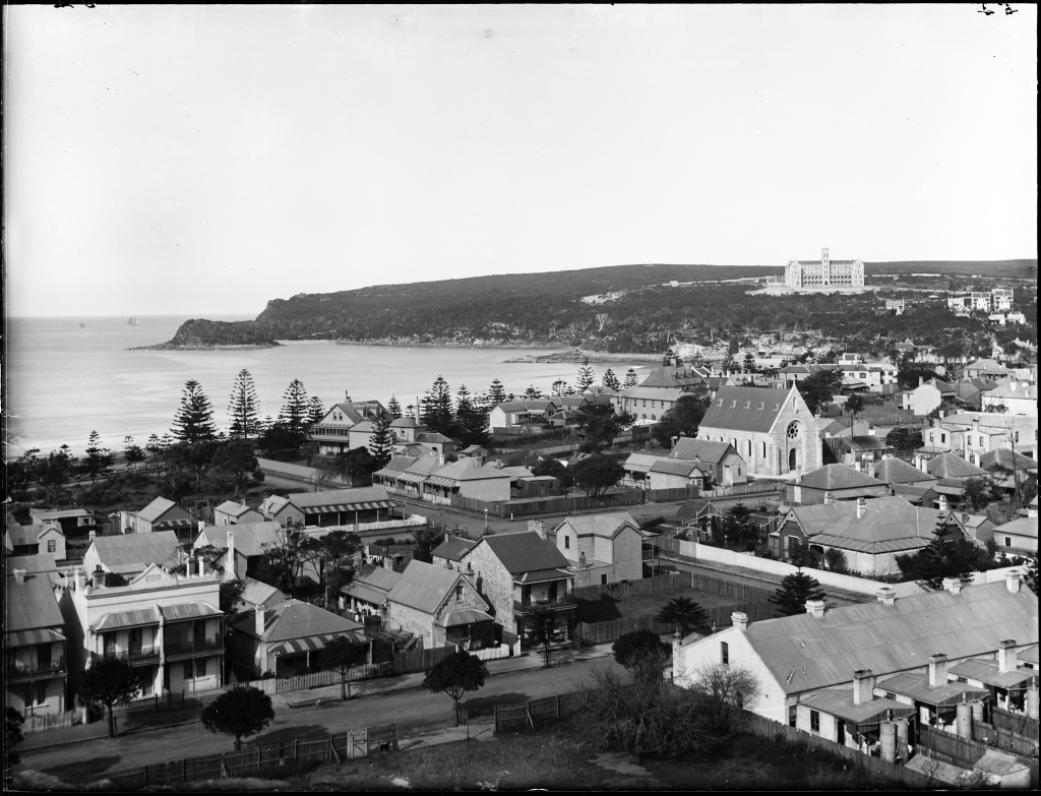
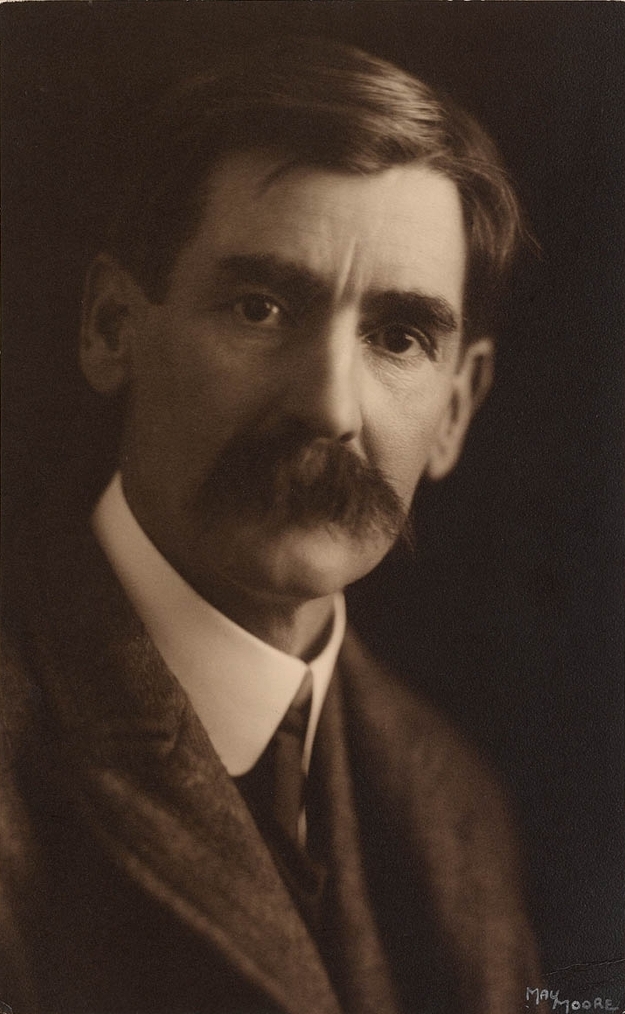 Suffering a bad ear infection when still a small lad that accelerated until his world became a muffled cocoon by 14, and kept so much at a distance, also causing him to experience the ignorance and arrogance of those who could not understand through so much of his life, an inner oasis sprang up and as it is for so many who are never listened to, or not heard, an eloquence ever refining itself spoke plainly in words that rang with truth.
Suffering a bad ear infection when still a small lad that accelerated until his world became a muffled cocoon by 14, and kept so much at a distance, also causing him to experience the ignorance and arrogance of those who could not understand through so much of his life, an inner oasis sprang up and as it is for so many who are never listened to, or not heard, an eloquence ever refining itself spoke plainly in words that rang with truth. 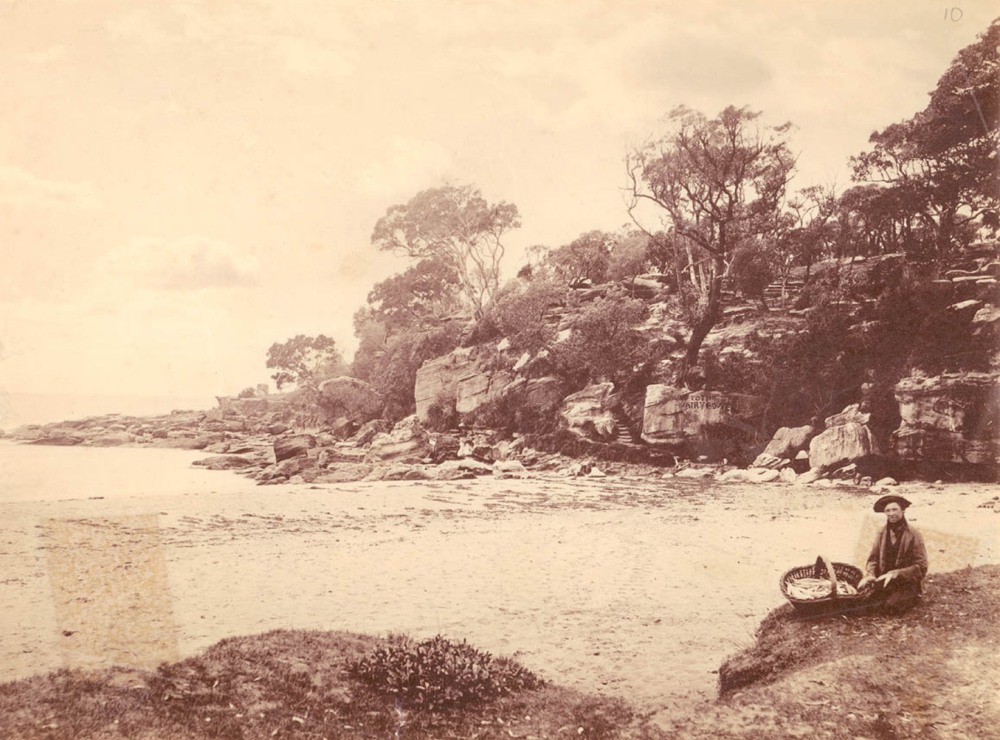
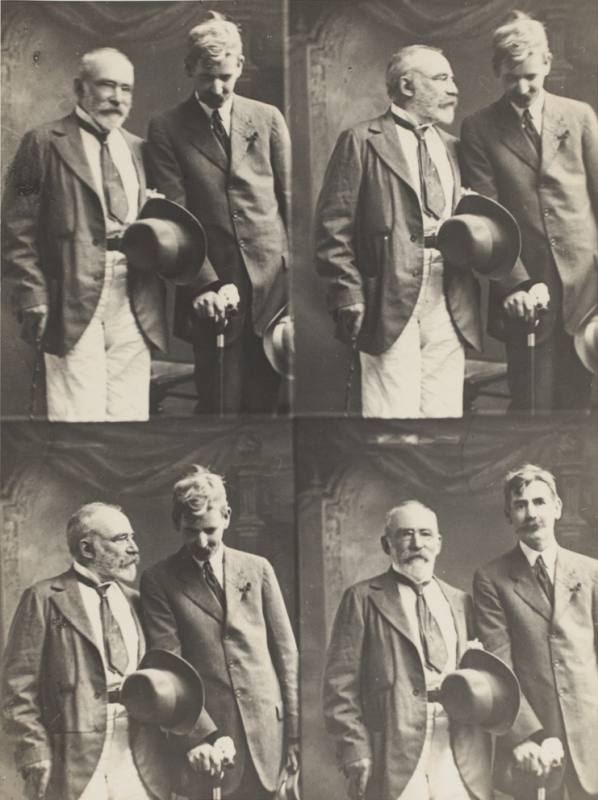
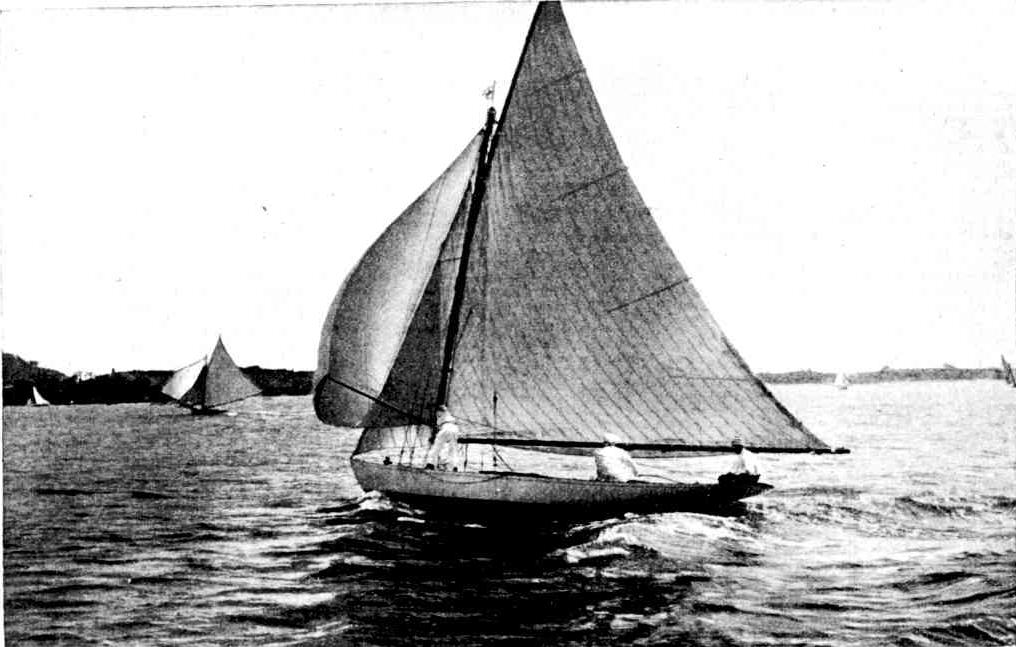
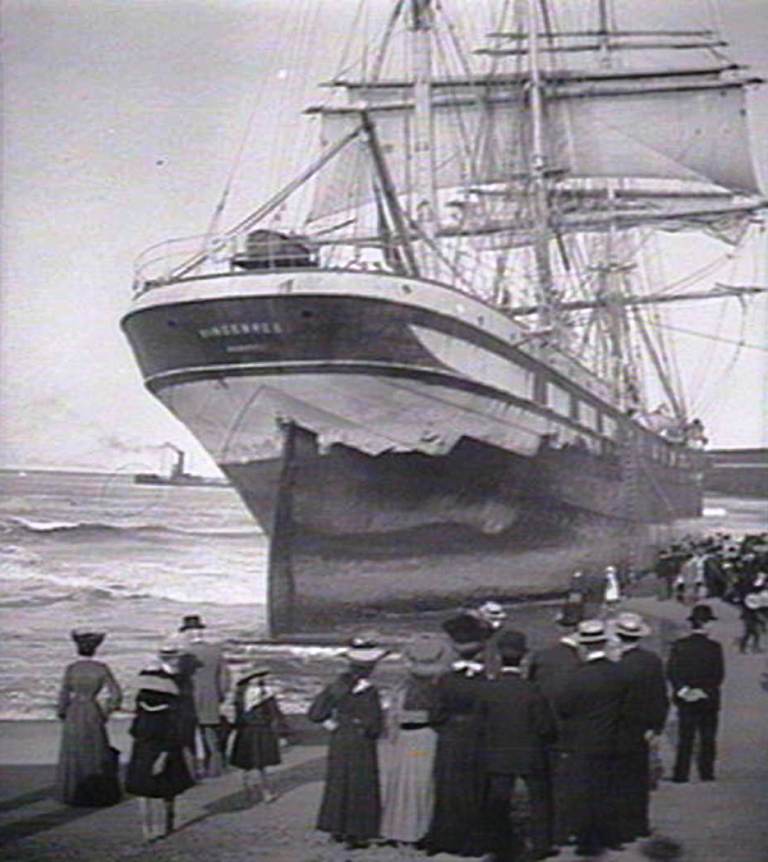 A sensation was created in the city last night by the receipt of a brief message from Manly to the effect that a large foreign sailing vessel had been driven ashore at Manly, and was firing rockets and burning blue lights as distress signals for assistance. The authorities were at once communicated with, and within the space of a few minutes the lifeboat was launched and taken in tow by the pilot steamer Captain Cook for the scene of the wrecked vessel.
A sensation was created in the city last night by the receipt of a brief message from Manly to the effect that a large foreign sailing vessel had been driven ashore at Manly, and was firing rockets and burning blue lights as distress signals for assistance. The authorities were at once communicated with, and within the space of a few minutes the lifeboat was launched and taken in tow by the pilot steamer Captain Cook for the scene of the wrecked vessel.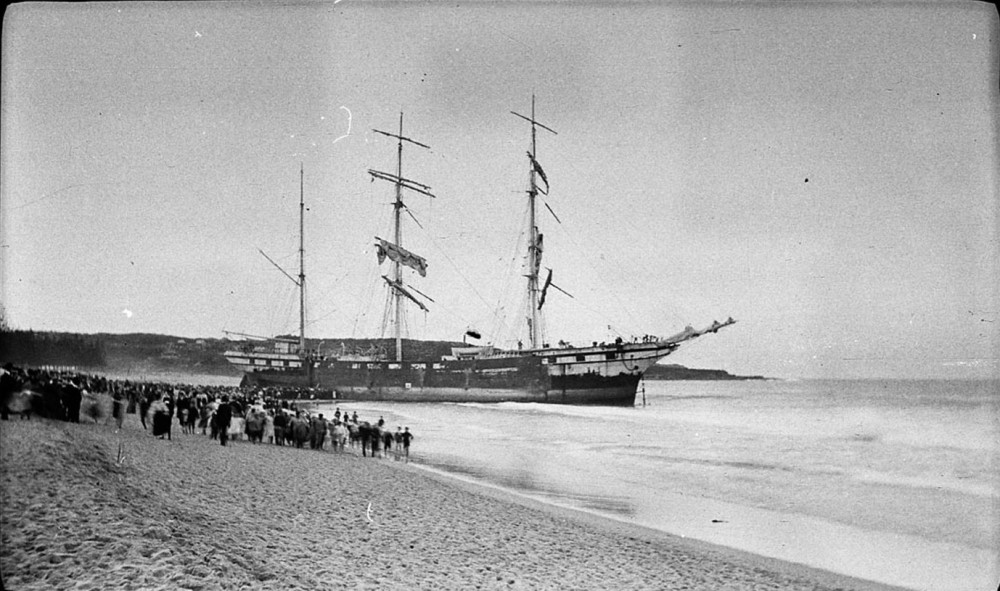
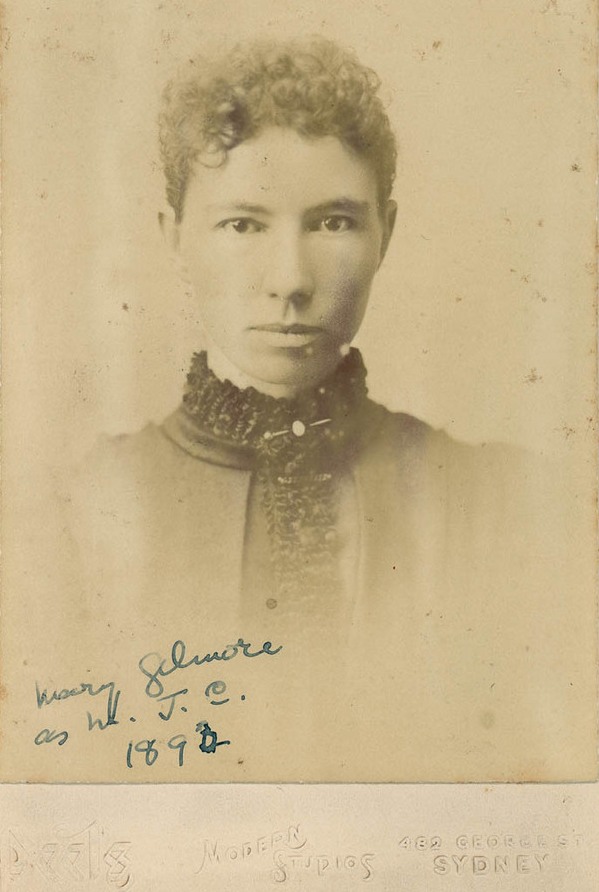
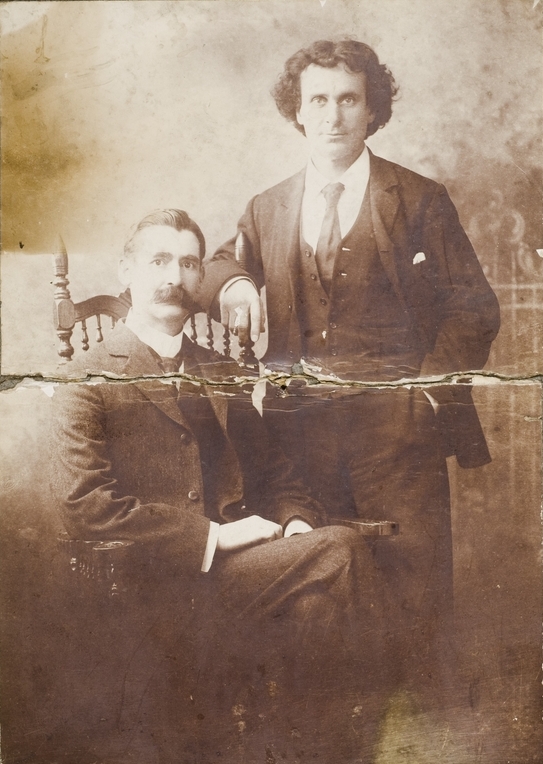
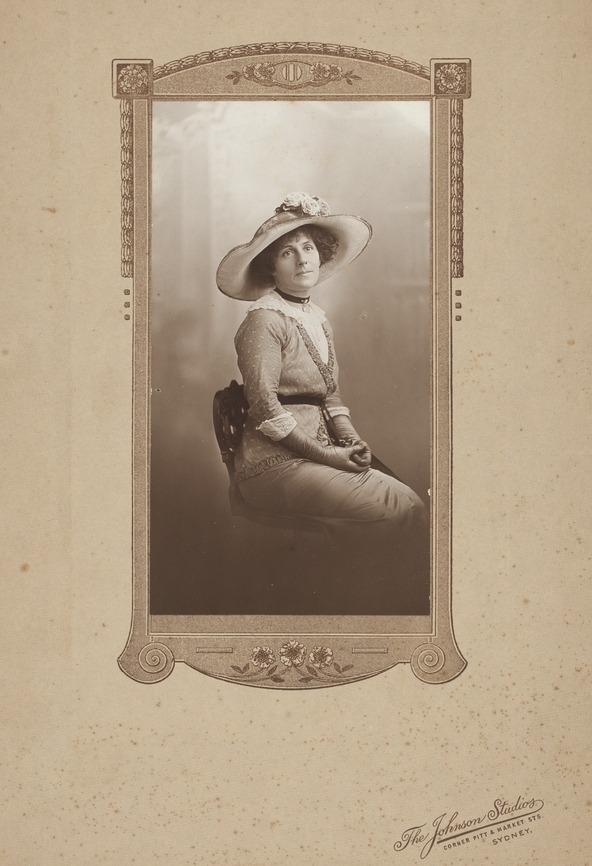
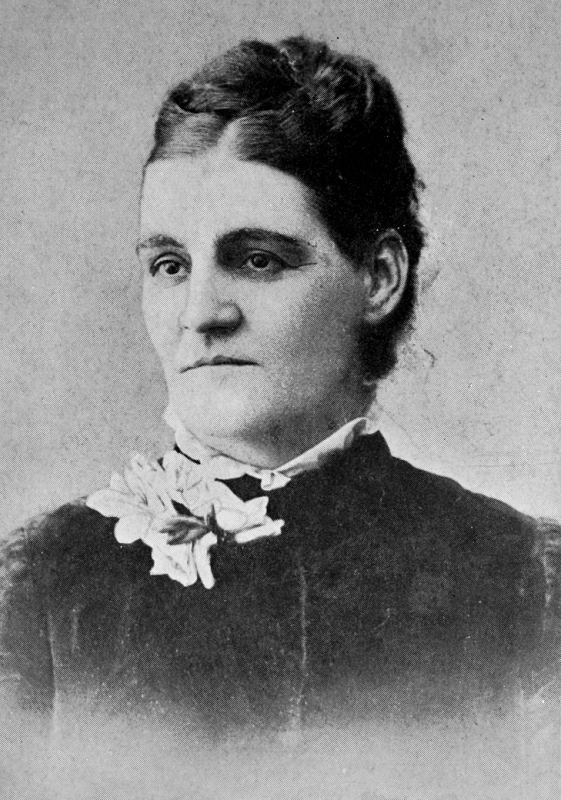
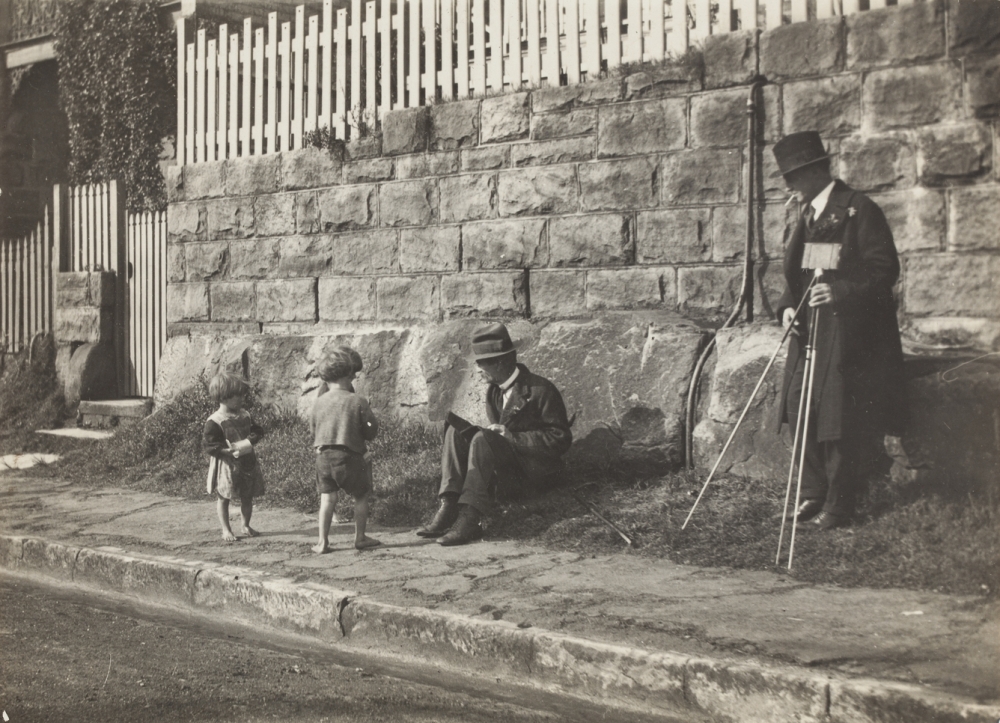
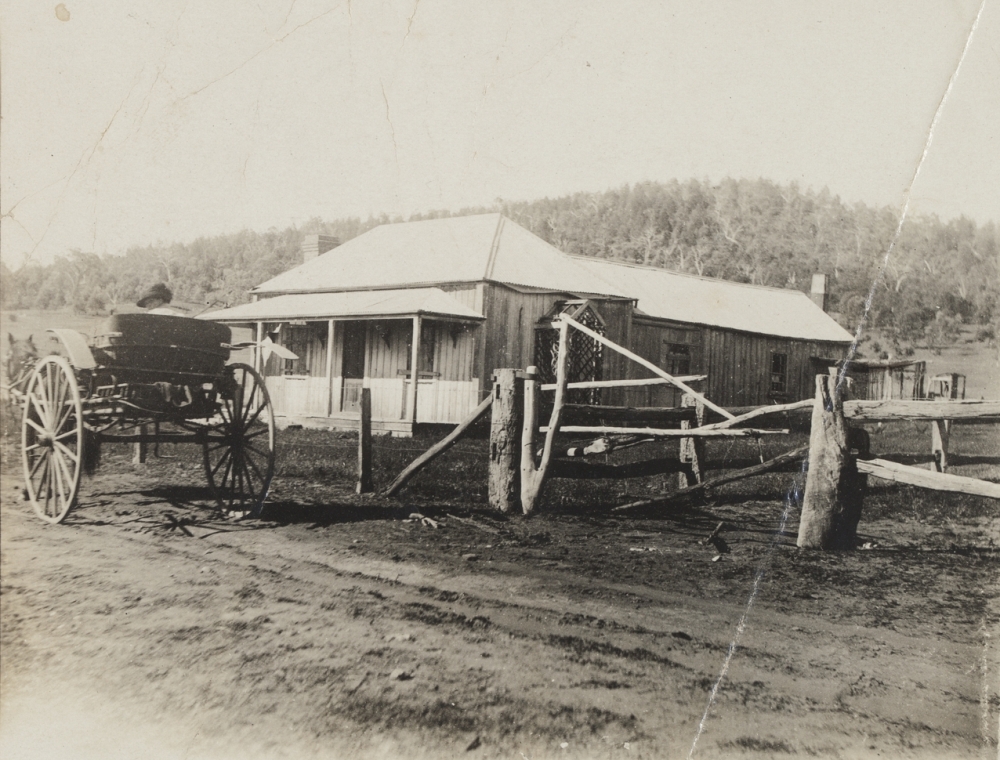
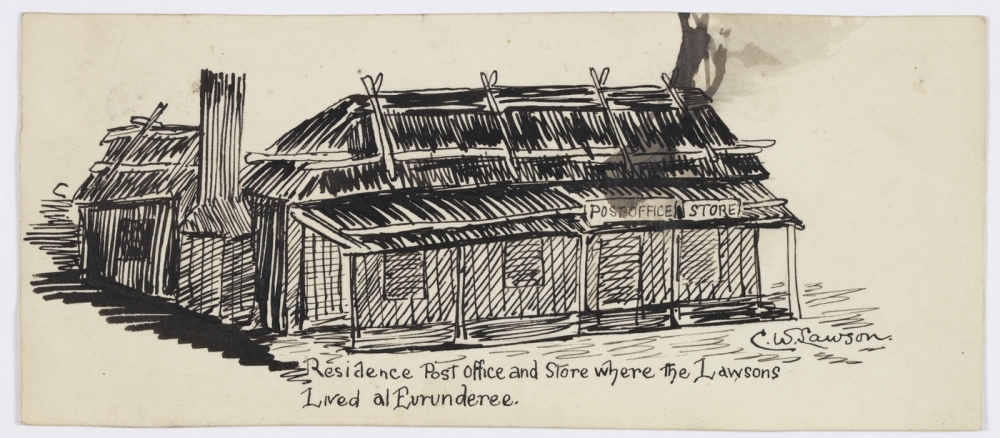
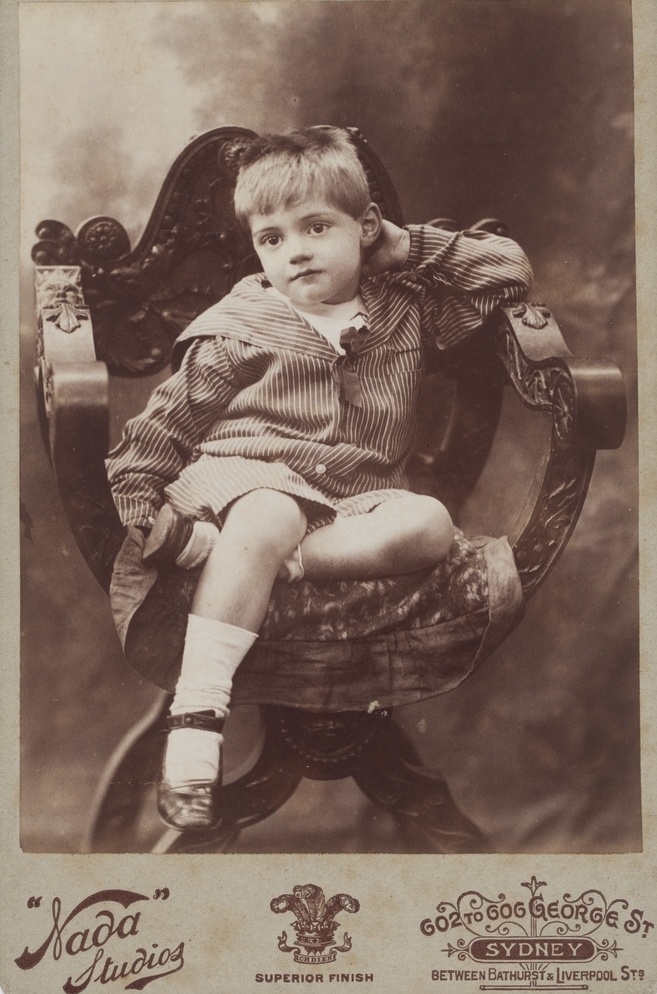
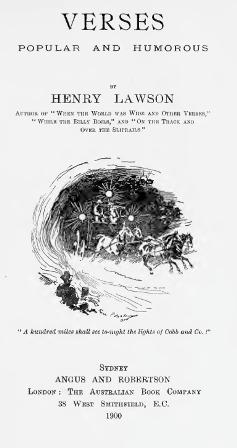 Back in Sydney Henry he found employment as a clerk in the public service, returned to his Bohemian friends (notably with Victor Daley and the ‘Dawn and Dusk Club’) and his old habits and frustrated, wanting to get to London, he ended up in a respite facility for inebriates in November 1898.
Back in Sydney Henry he found employment as a clerk in the public service, returned to his Bohemian friends (notably with Victor Daley and the ‘Dawn and Dusk Club’) and his old habits and frustrated, wanting to get to London, he ended up in a respite facility for inebriates in November 1898. 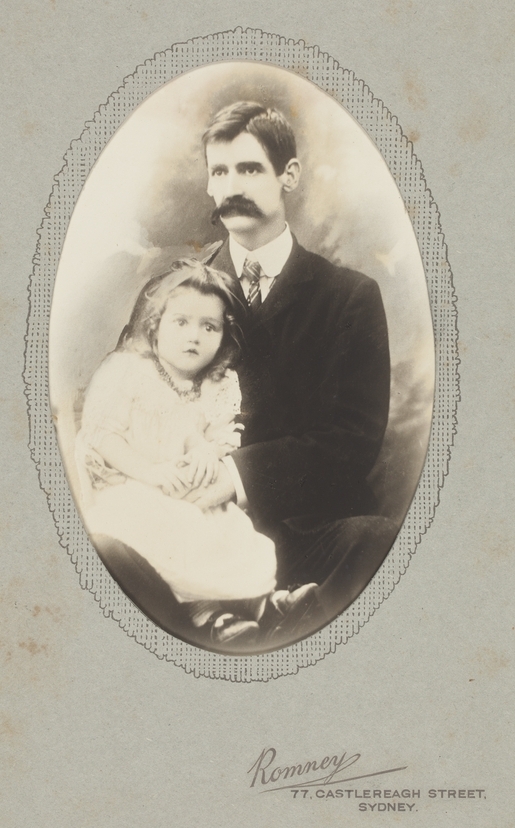
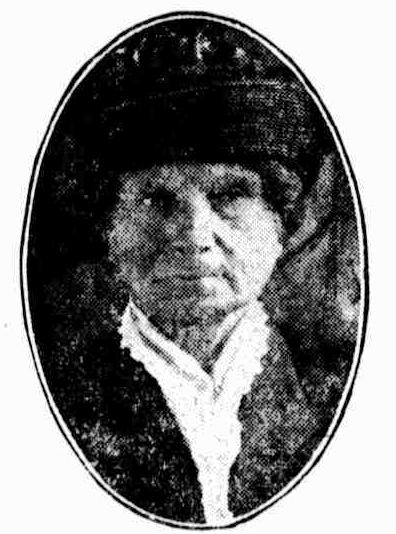
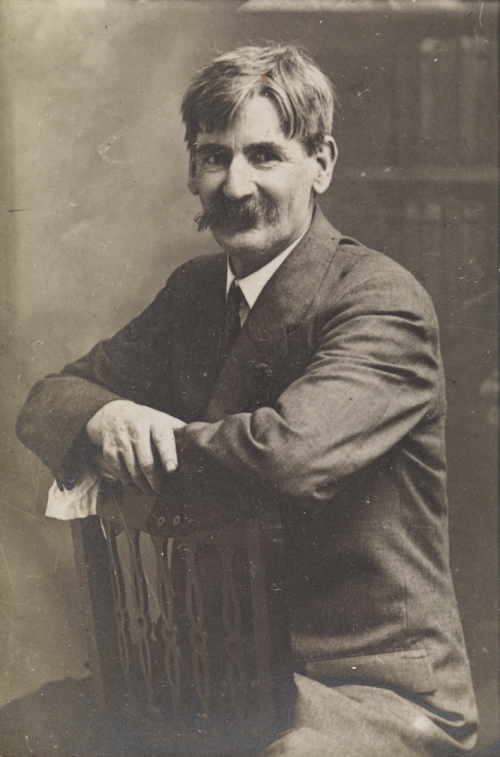
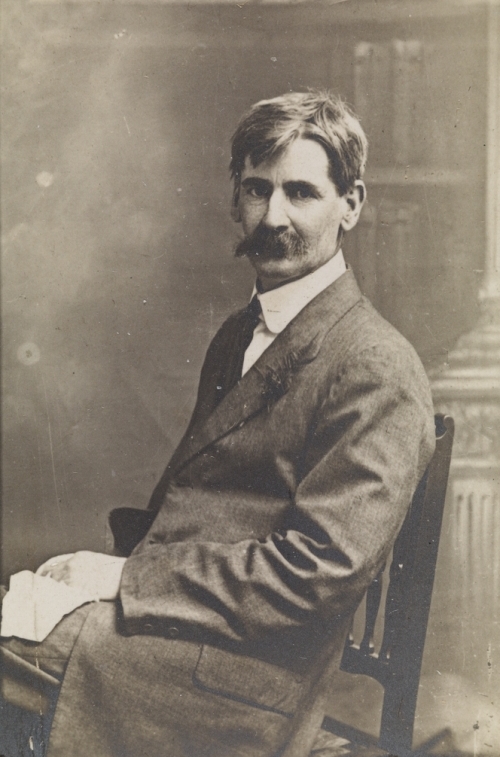
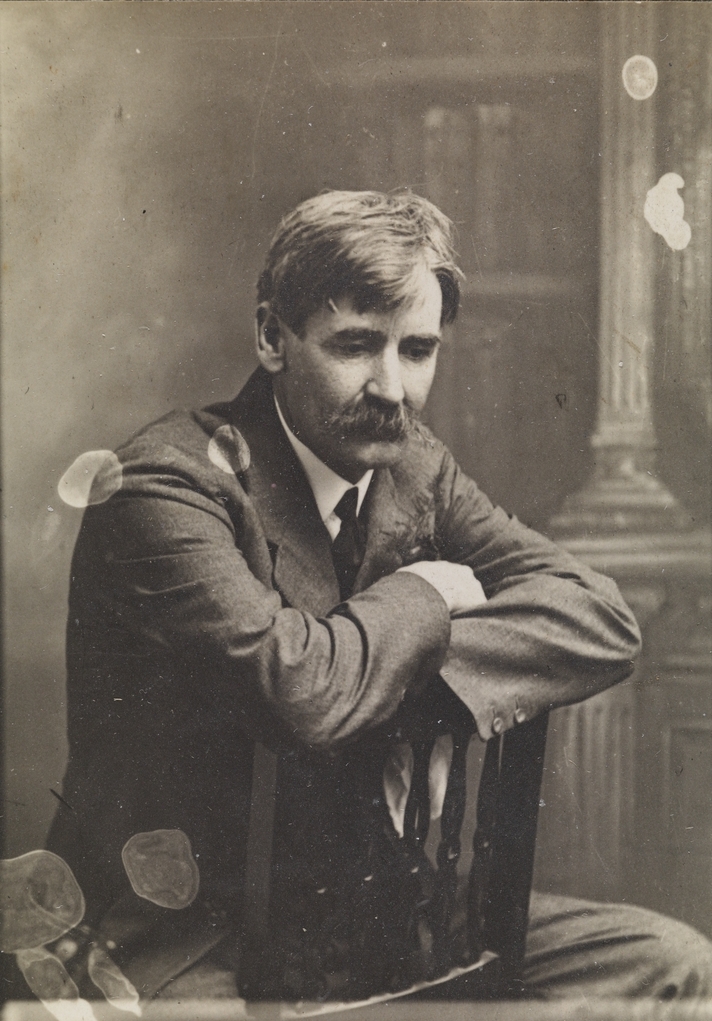
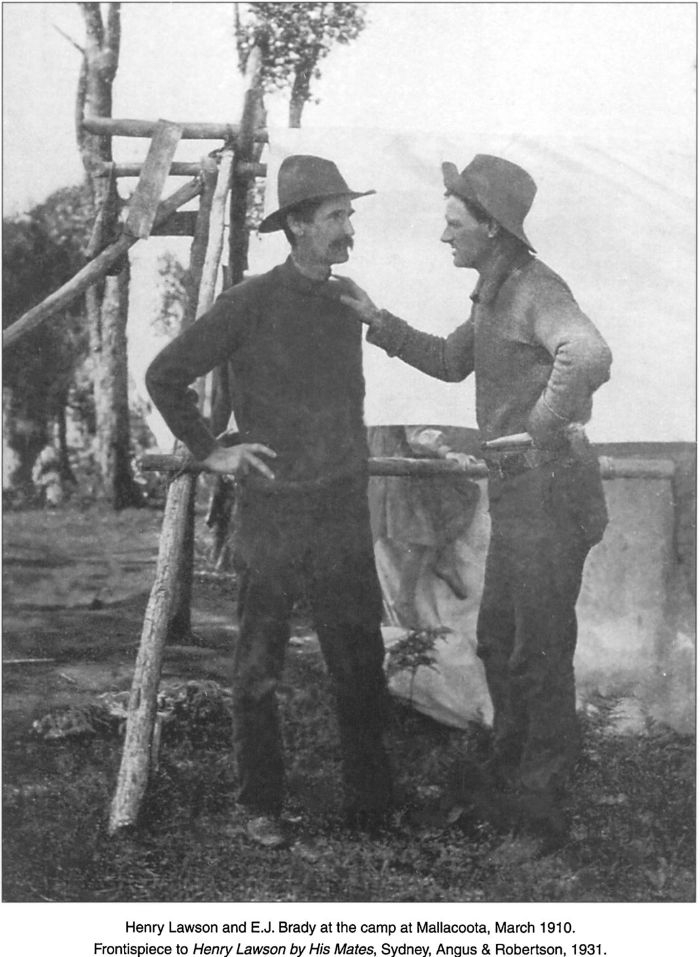
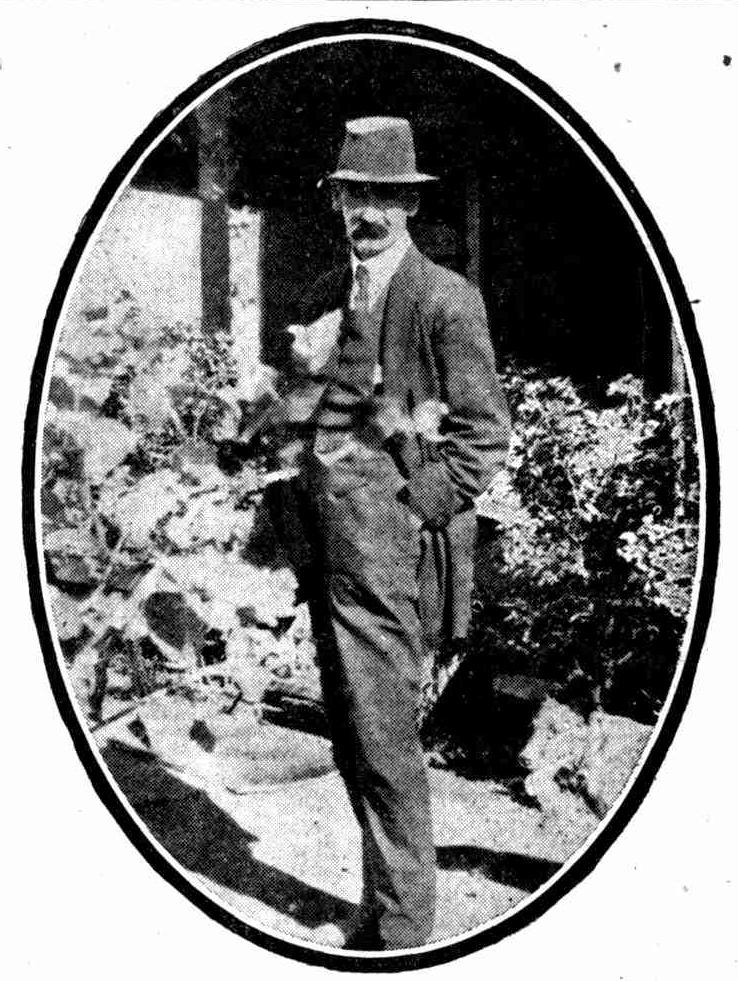
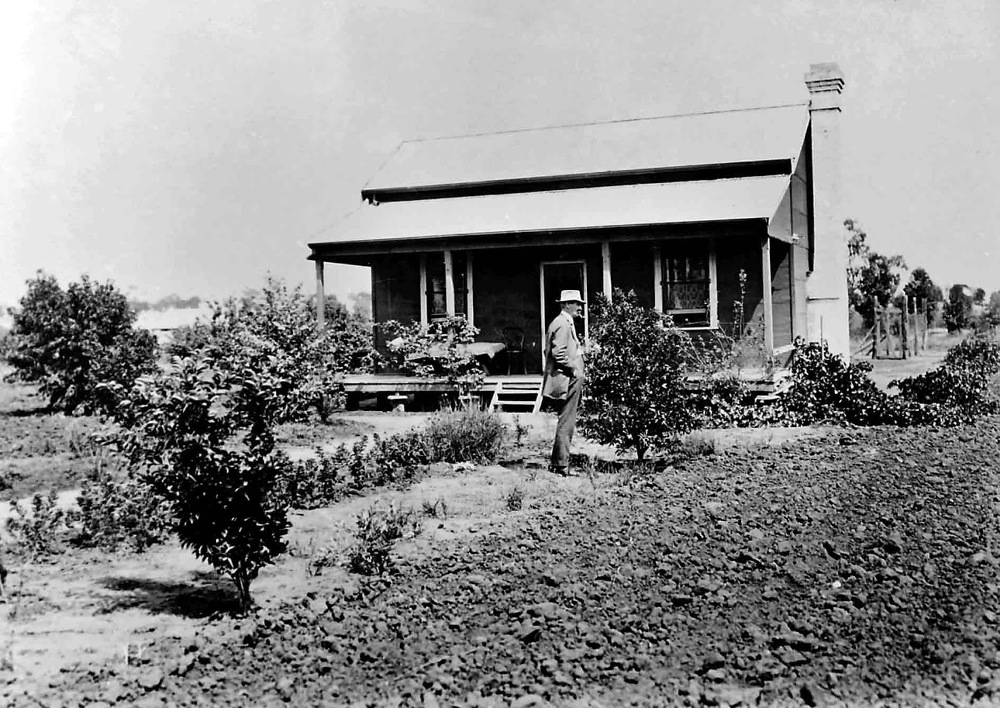
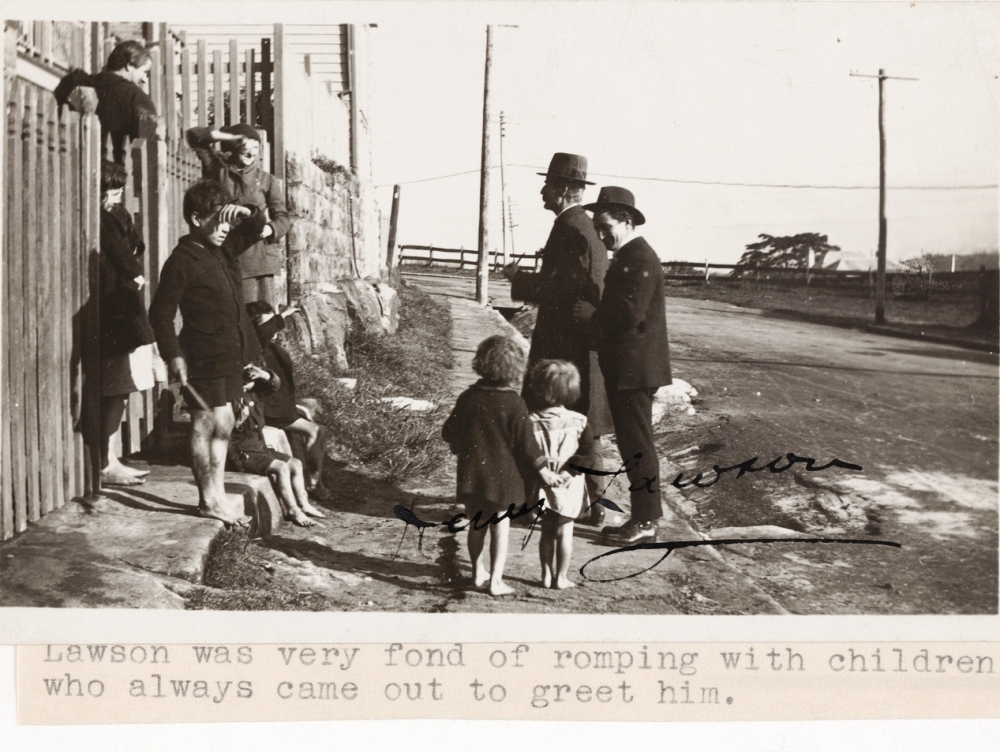
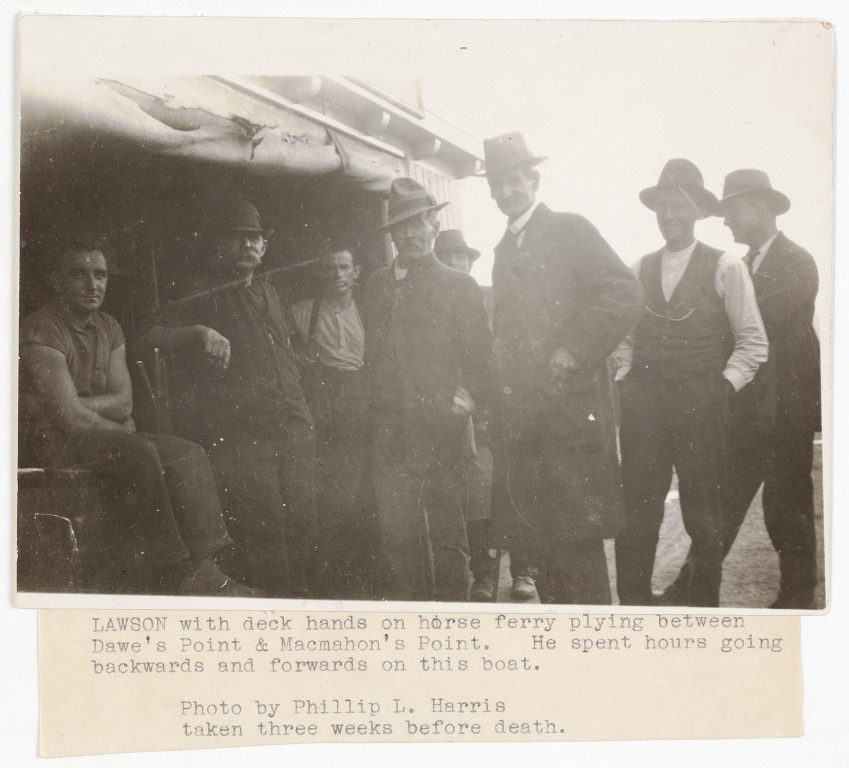
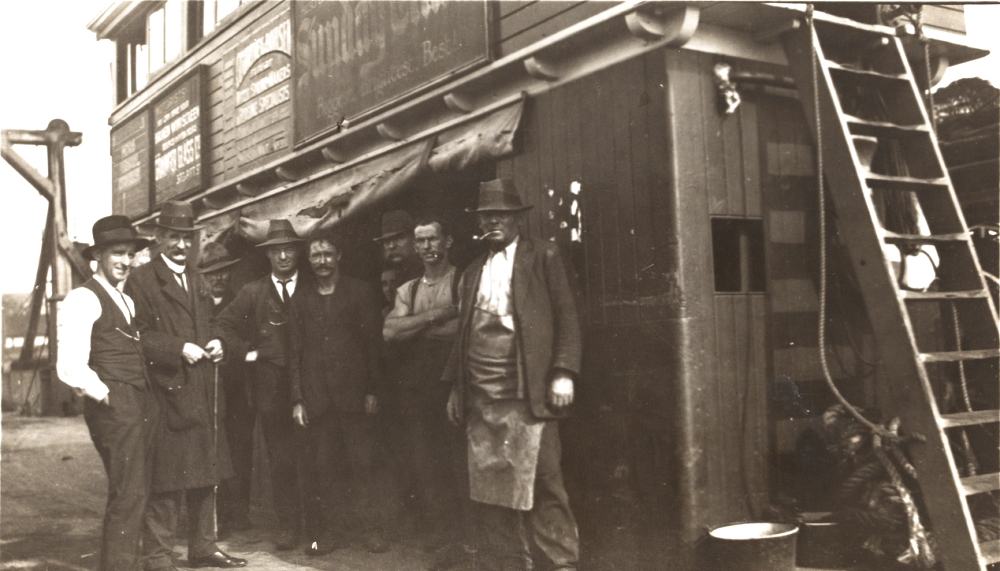
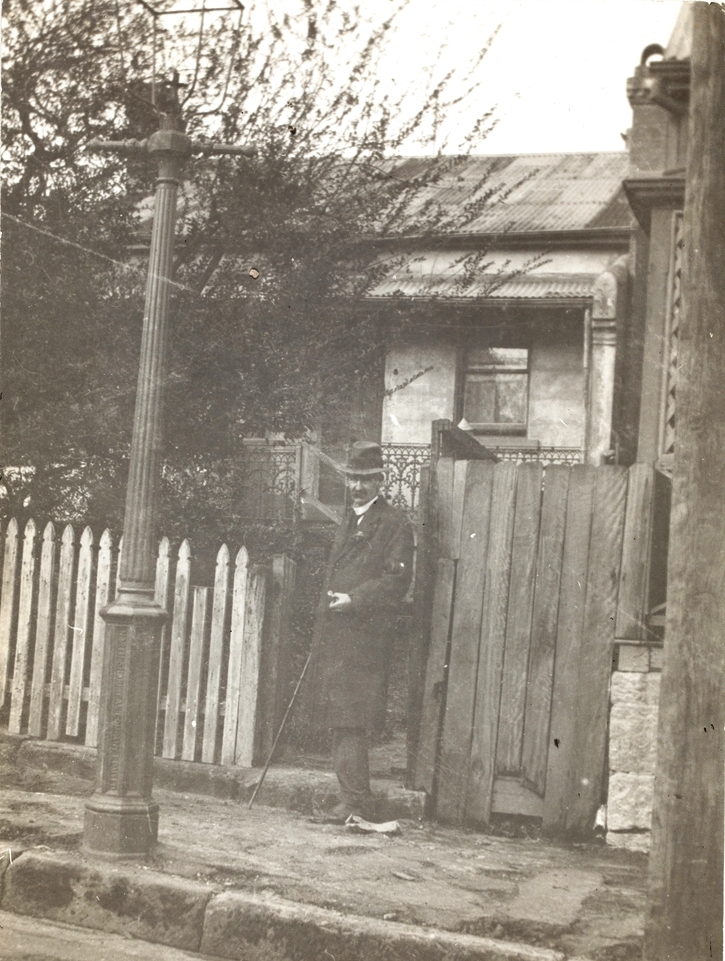
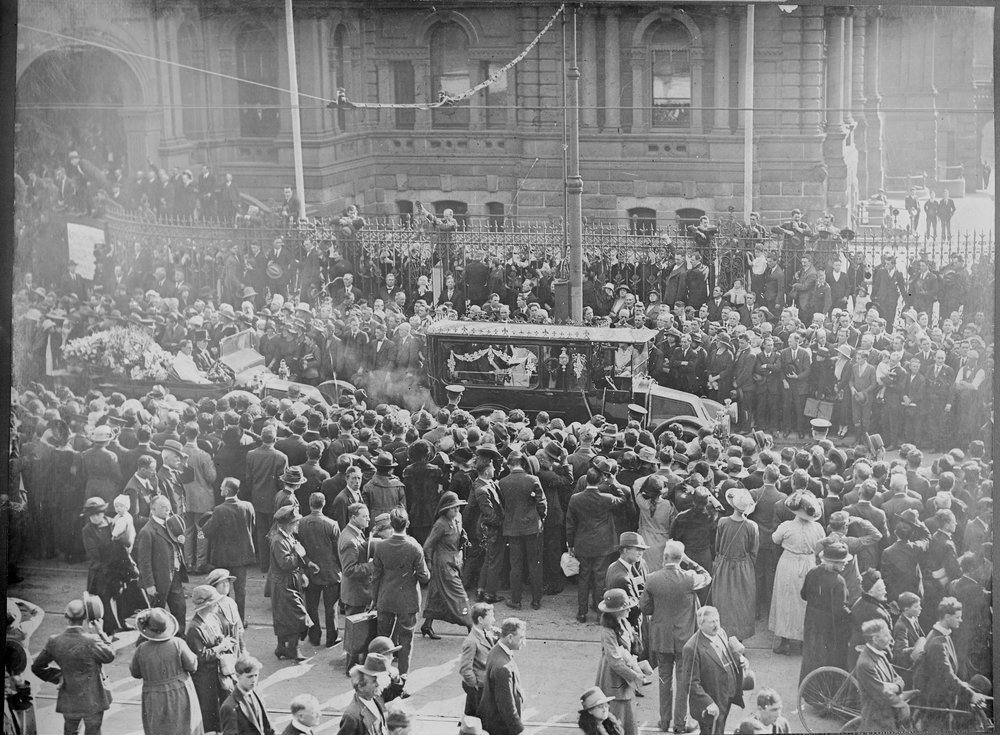
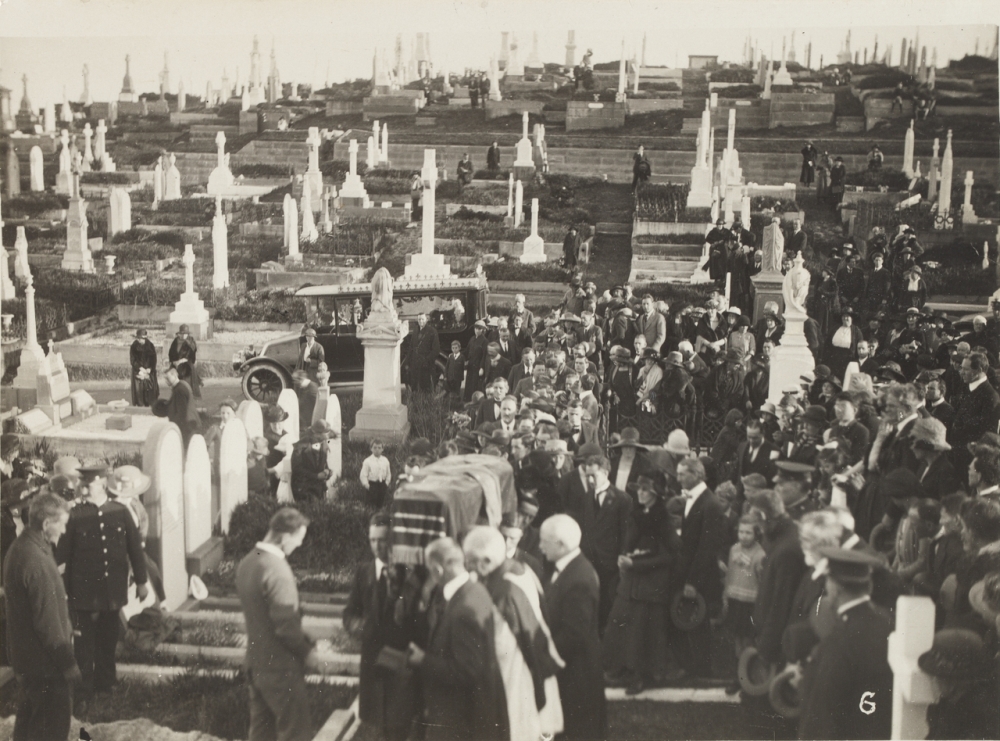
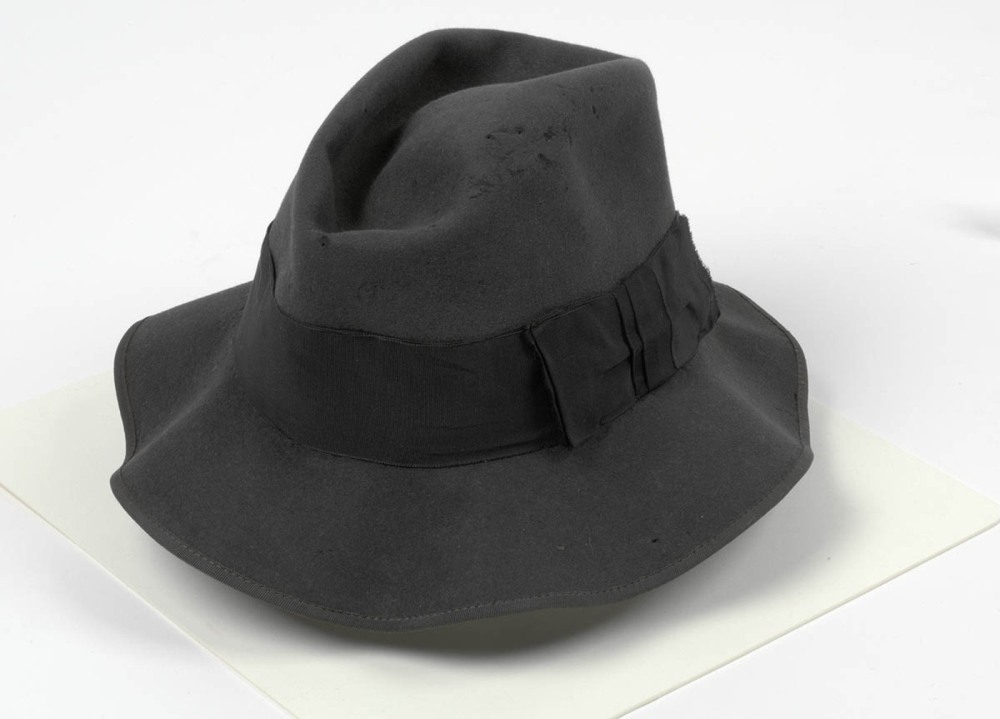
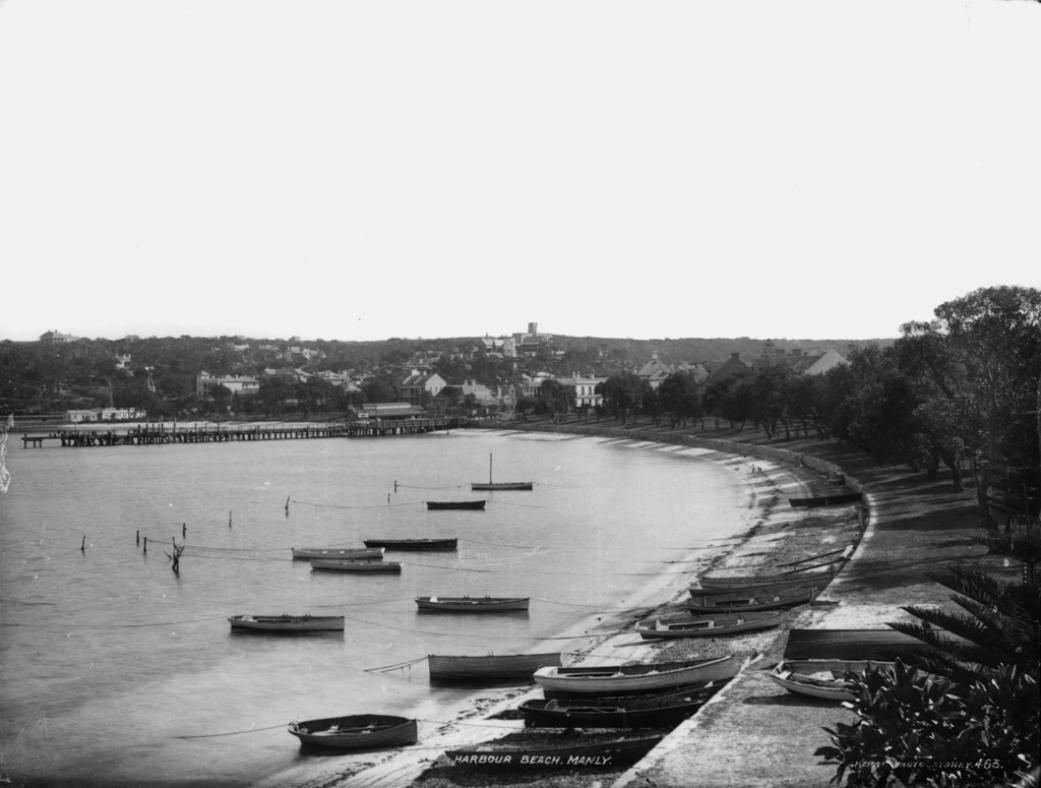





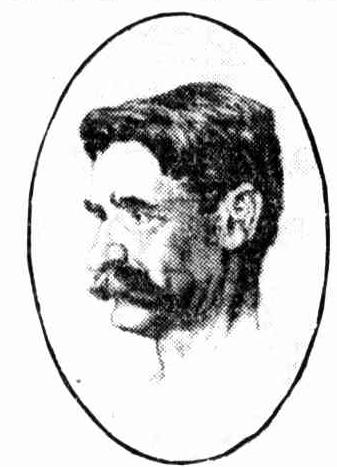
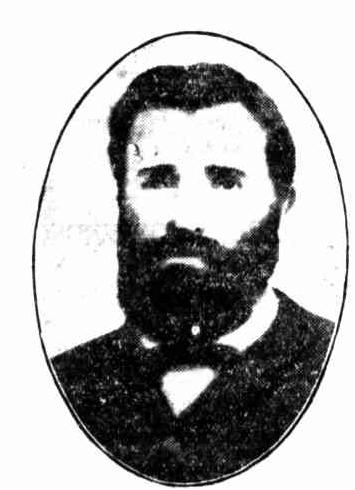
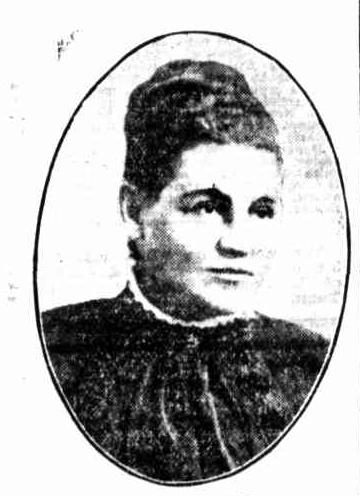
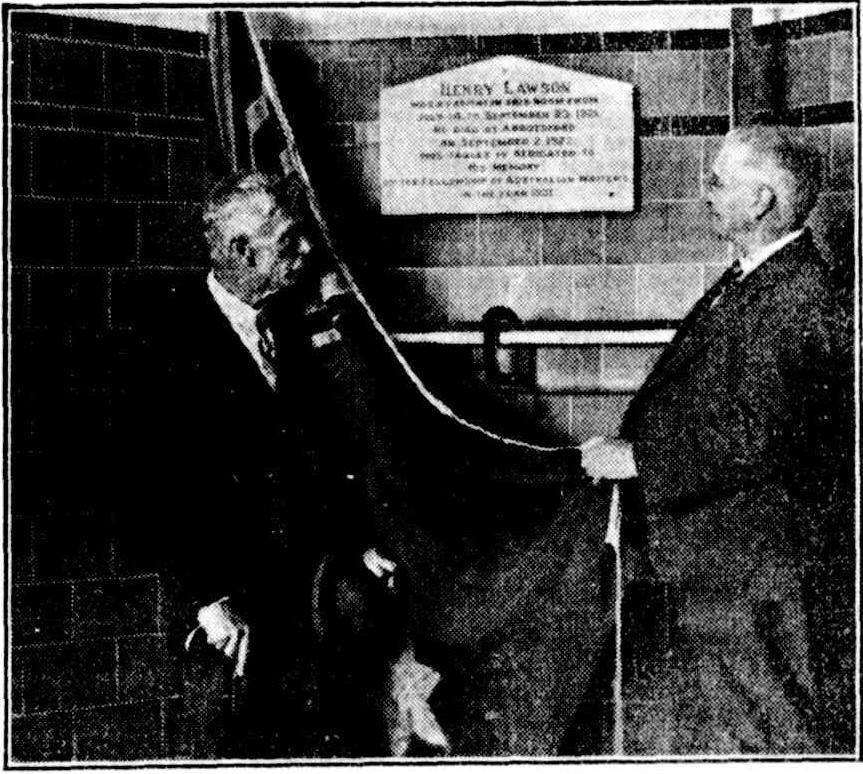


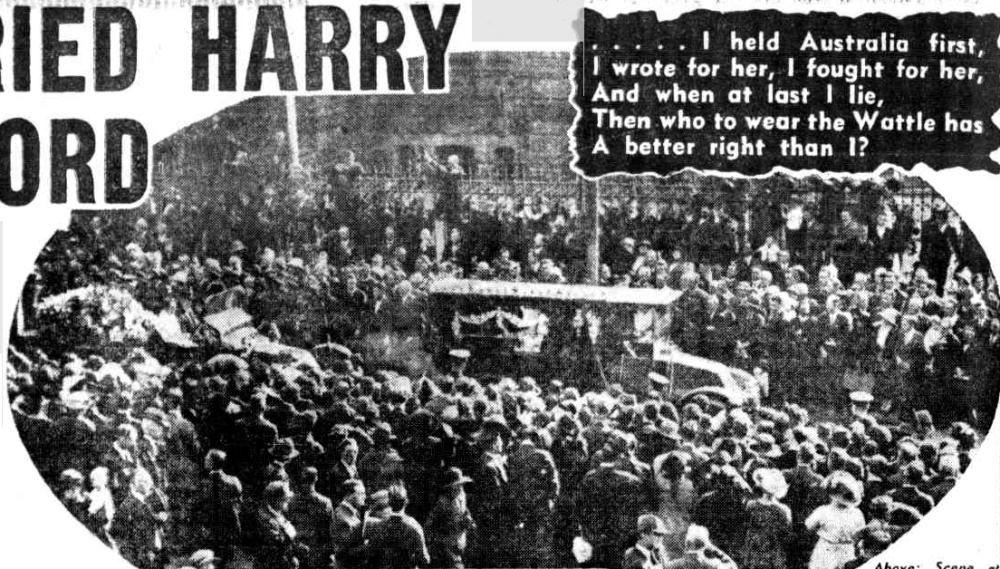
 EXCITED WHEN VERSE APPEARED
EXCITED WHEN VERSE APPEARED 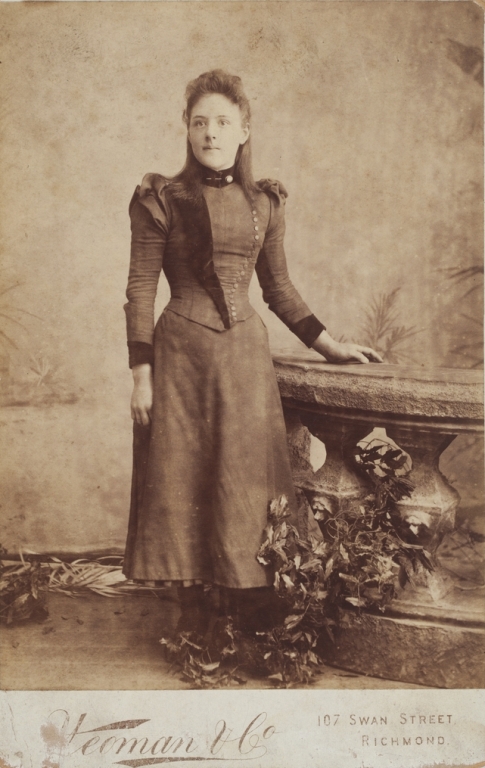
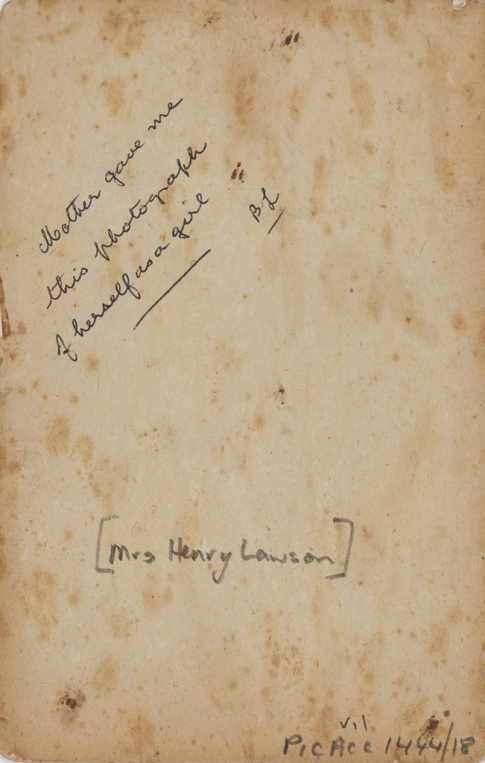
 TAKE a simple thing like surfing. You would think it would be easy enough to find out beyond all possible, probable shadow of doubt just what did happen at Manly some 50 years ago when Mr. W. H. Gocher won us the right to bathe in the sea by daylight without getting into trouble with the law. Well, it isn't.
TAKE a simple thing like surfing. You would think it would be easy enough to find out beyond all possible, probable shadow of doubt just what did happen at Manly some 50 years ago when Mr. W. H. Gocher won us the right to bathe in the sea by daylight without getting into trouble with the law. Well, it isn't.
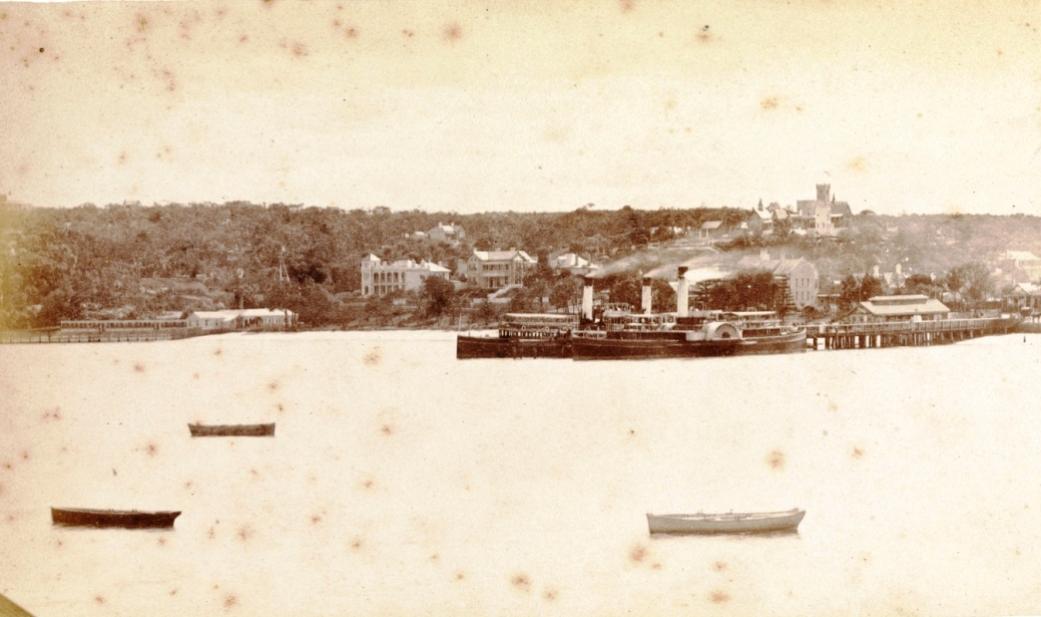
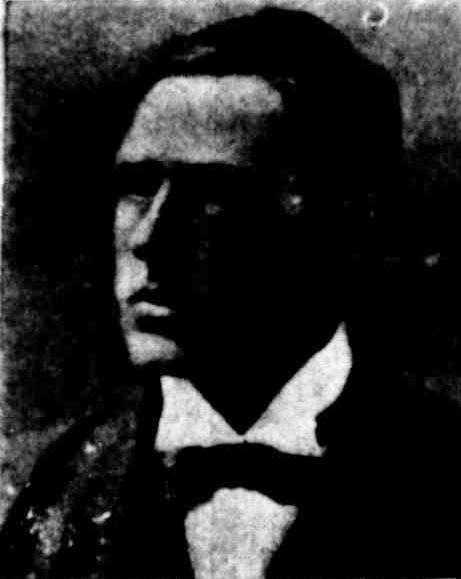 MR. A. B. PATERSON.
MR. A. B. PATERSON. 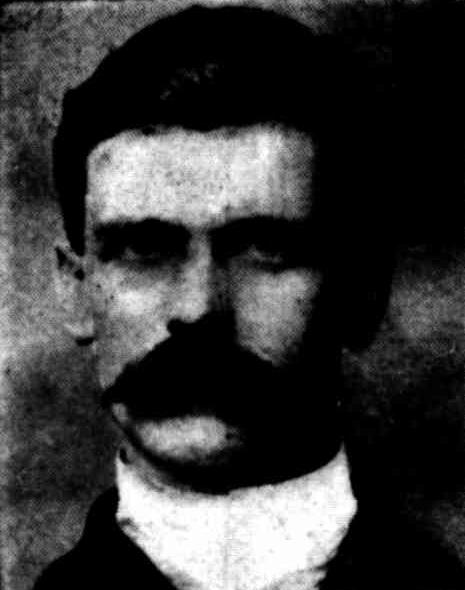 MR. RODERIC QUINN.
MR. RODERIC QUINN. 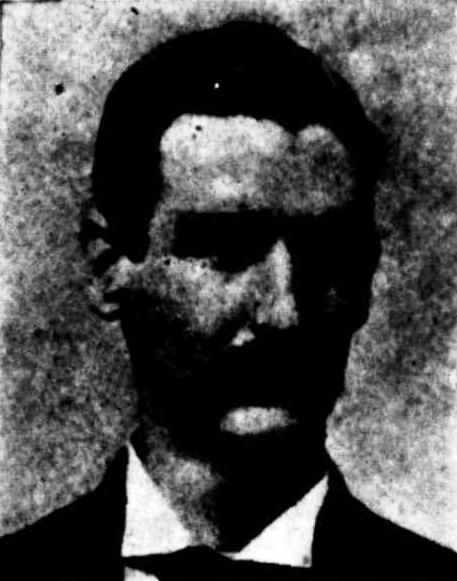 MR. HENRY LAWSON.
MR. HENRY LAWSON. 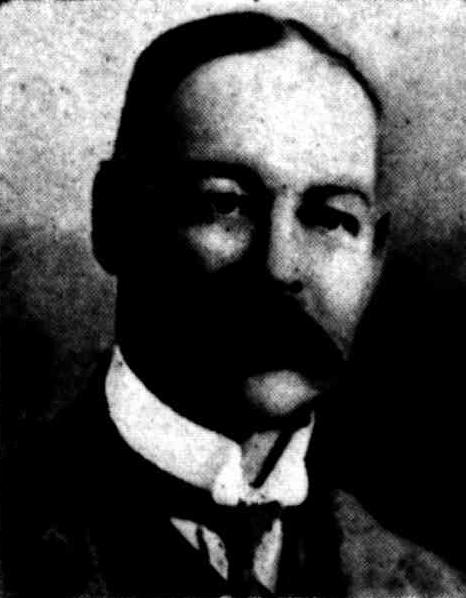 MR. JOHN SANDES.
MR. JOHN SANDES. 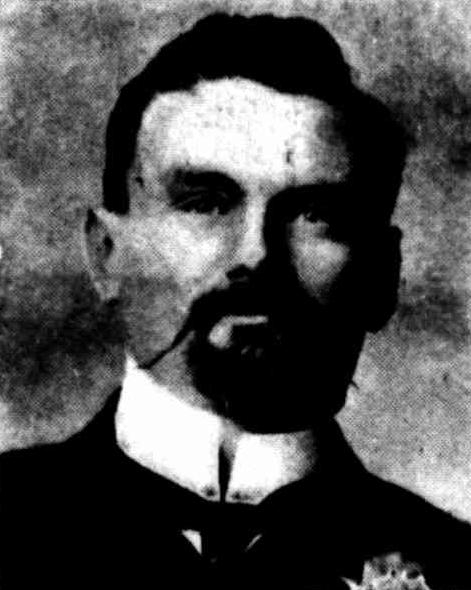 MR. E. J. BRADY.
MR. E. J. BRADY. 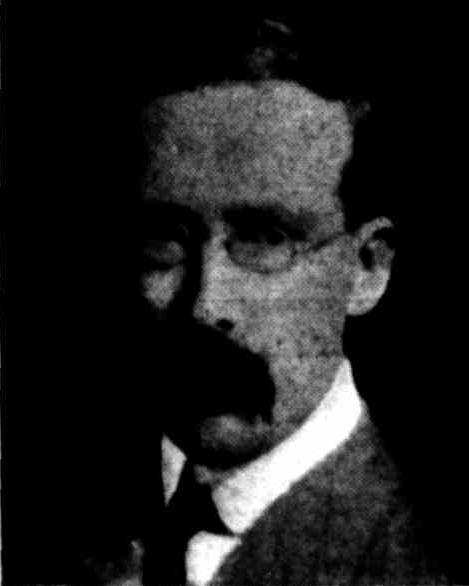 MR. T. W. HENEY.
MR. T. W. HENEY. 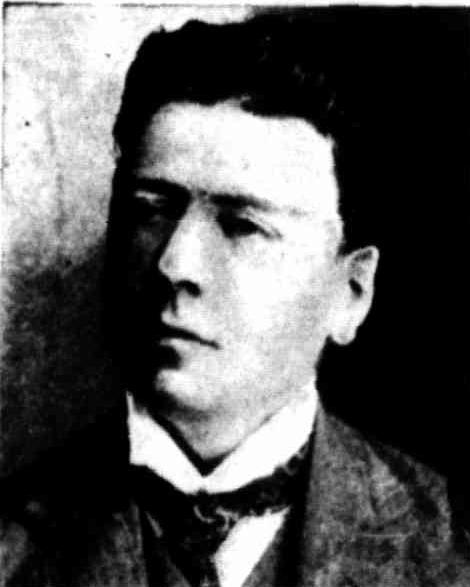 MR. C. J. BREMAN.
MR. C. J. BREMAN. 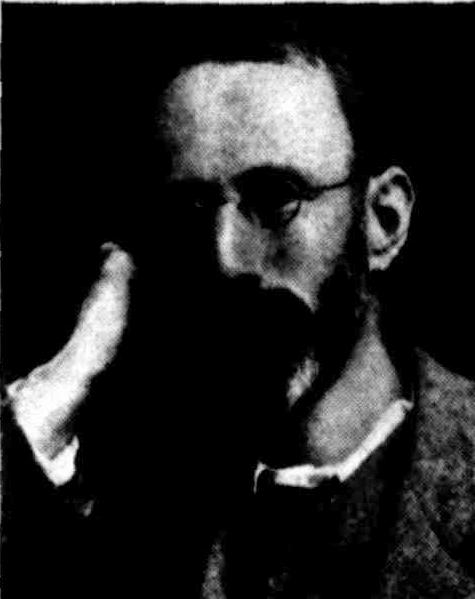 MR. J. LE GAY BRERETON.
MR. J. LE GAY BRERETON. 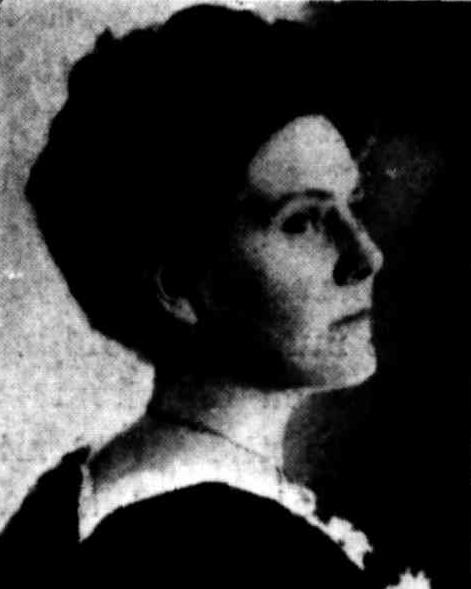 MISS AGNES L. STORRIE.
MISS AGNES L. STORRIE.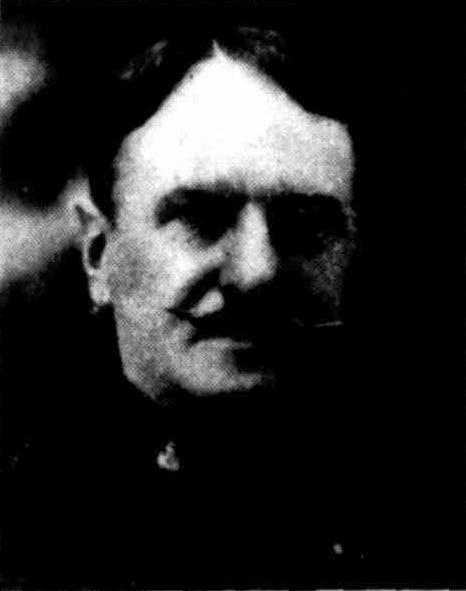 COLONEL KENNETH MACKAY. - C.B., M.L.C.
COLONEL KENNETH MACKAY. - C.B., M.L.C. 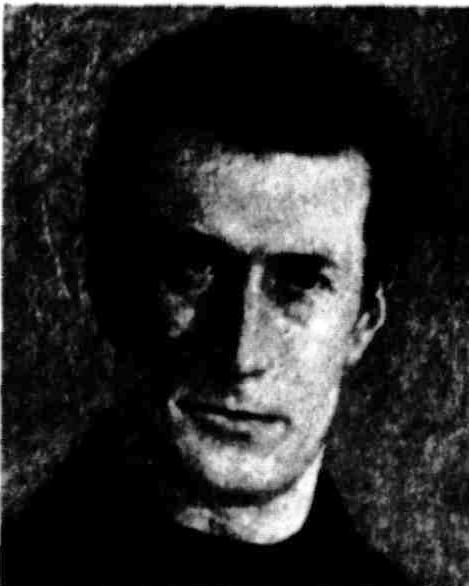 MR. HUGH McCRAE.
MR. HUGH McCRAE. 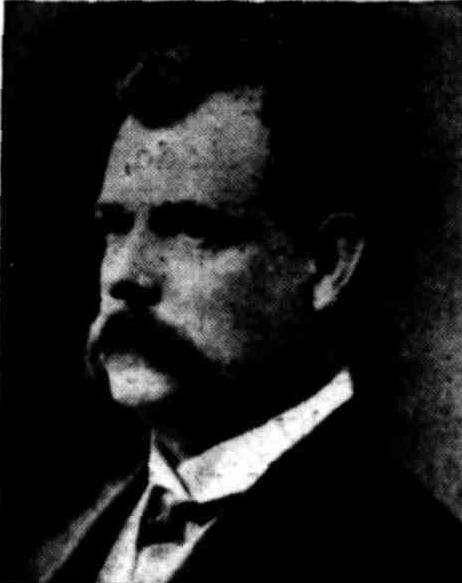 MR P E QUINN
MR P E QUINN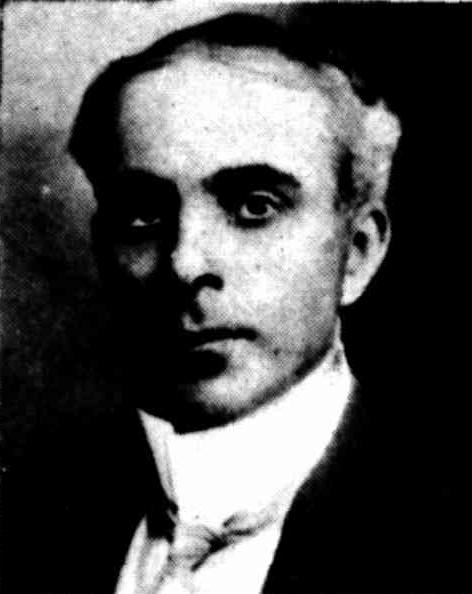 MR. A. H. ADAMS.
MR. A. H. ADAMS. 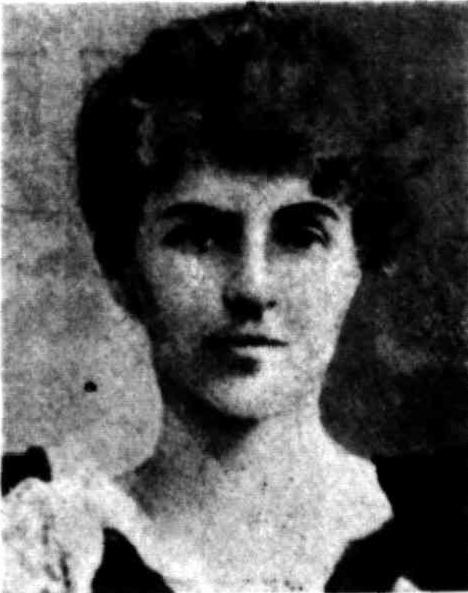 MISS ETHEL TURNER.
MISS ETHEL TURNER. 